In evaluating the public tax records of Compact for America (CFA), FOAVC will provide copies of all public tax records available. FOAVC will discuss claims made by CFA in those tax records by comparing those statements with federal tax law and other resources as appropriate. In some instances concerns FOAVC has regarding the tax form in question may be so obvious that no resources are required to justify the inquiry. In raising questions FOAVC does not suggest any violation of federal tax law by Compact for America or any of its officers or members has occurred. The absence of a particular tax form, for example, may be easily explained by the fact federal tax law does not require release of that information to the public. The answer may therefore be the particular organization in question filed the proper information with the IRS but chose not to release that fact to the public.
If, as a consequence of failure to provide complete public information however, conclusions are drawn or questions raised about the financial information of Compact for America, FOAVC believes the blame must attach to CFA. If this organization does not wish questions raised by the public about their finances it is their responsibility to provide complete answers. If the complete answers are not provided by Compact for America the American people have the right to draw such conclusions as the incomplete information dictates. This is particularly true in the case of Compact for America which purports its officers "serve as public officials" at the "direction" of the Compact for a Balanced Budget Commission" which it asserts is a "governmental body."
The American public have the right to question the actions of public officials and to examine expenditures of governmental funds by a "governmental body." Public officials are even more accountable to the public than tax-exempt organizations. If, as a consequence of Compact for America stating the Commission is a "governmental body," CFA opens the door to a higher level of scrutiny by the public in regards to its finances and other activities as they relate to federal tax law or other law relating governmental bodies then this is the choice of Compact for America and it is they that must bear the responsibility for that choice.
FOAVC Concerns Regarding CFA Income Tax Returns and other Information
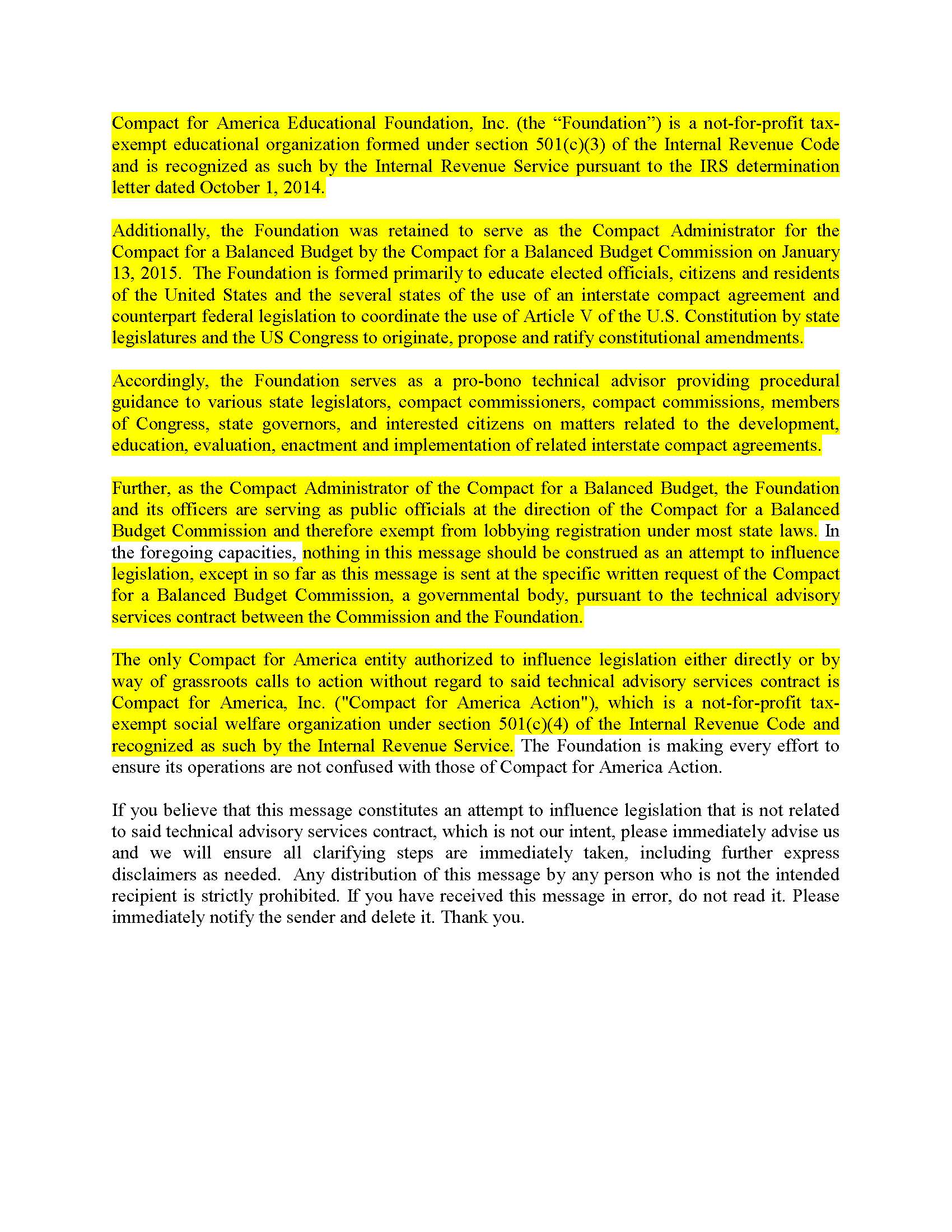 In the case of Compact for America, FOAVC has concerns related
to statements made by the organization that their officers serve as
"public officials" and that the Compact for America Education Founders,
Inc. (referred to by CFA as the "Foundation") serves as a "pro-bono
technical advisor" retained by the "Compact Administrator for the
Compact for a Balanced Budget by the Compact for a Balanced Budget
Commission." These statements are contained in the email response by
Chip DeMoss III of Compact for America and appear to be part of the
format of the email meaning that the statement is sent with every email
transmitted by Mr. DeMoss. FOAVC has copied the statement from the
email and presents it unedited except for breaking it into more
readable paragraphs (click image left to enlarge).
In the case of Compact for America, FOAVC has concerns related
to statements made by the organization that their officers serve as
"public officials" and that the Compact for America Education Founders,
Inc. (referred to by CFA as the "Foundation") serves as a "pro-bono
technical advisor" retained by the "Compact Administrator for the
Compact for a Balanced Budget by the Compact for a Balanced Budget
Commission." These statements are contained in the email response by
Chip DeMoss III of Compact for America and appear to be part of the
format of the email meaning that the statement is sent with every email
transmitted by Mr. DeMoss. FOAVC has copied the statement from the
email and presents it unedited except for breaking it into more
readable paragraphs (click image left to enlarge).FOAVC has questions regarding tax filings by CFA which, based on the available public record from CFA, when compared to federal tax law requirements simply do not add up. Primarily our questions concern the fact certain public records regarding Compact For America appear not to exist when by law they should. FOAVC cautions asking questions does not imply wrongdoing on the part of Compact for America. Information not available for public inspection in the form of letters from the IRS, for example, provisions of the tax law, or other similar circumstances may easily explain the questions raised by FOAVC.
FOAVC has questions regarding the organization known as "Compact for America, Inc." which filed tax-exempt tax returns for the tax years 2012, 2013 and 2014. CFA provides no information regarding the organization known as Compact for America Inc. Yet the tax records that are available establish a direct link between that organization and members of the "Foundation." The title of Compact for America Inc. indicates it is a corporation. However without public certification or incorporation paperwork it is impossible to state if Compact for America Inc., is an actual corporation as no public record of its incorporation have been located.
CFA(Action) Lacks Required Paperwork
According to a statement published on its website Compact for America Inc., appears to have been renamed "Compact for America--Action." CFA states Compact for America--Action is a 501(c)(4) tax exempt organization incorporated in the state of Texas. FOAVC has been unable to locate the public records proving incorporation and they are not provided on the CFA website. Unlike the Compact for America Education Foundation Inc., Compact for America has not been as forthcoming with the public tax records required by law to be available for inspection regarding Compact for America Inc,(Action).
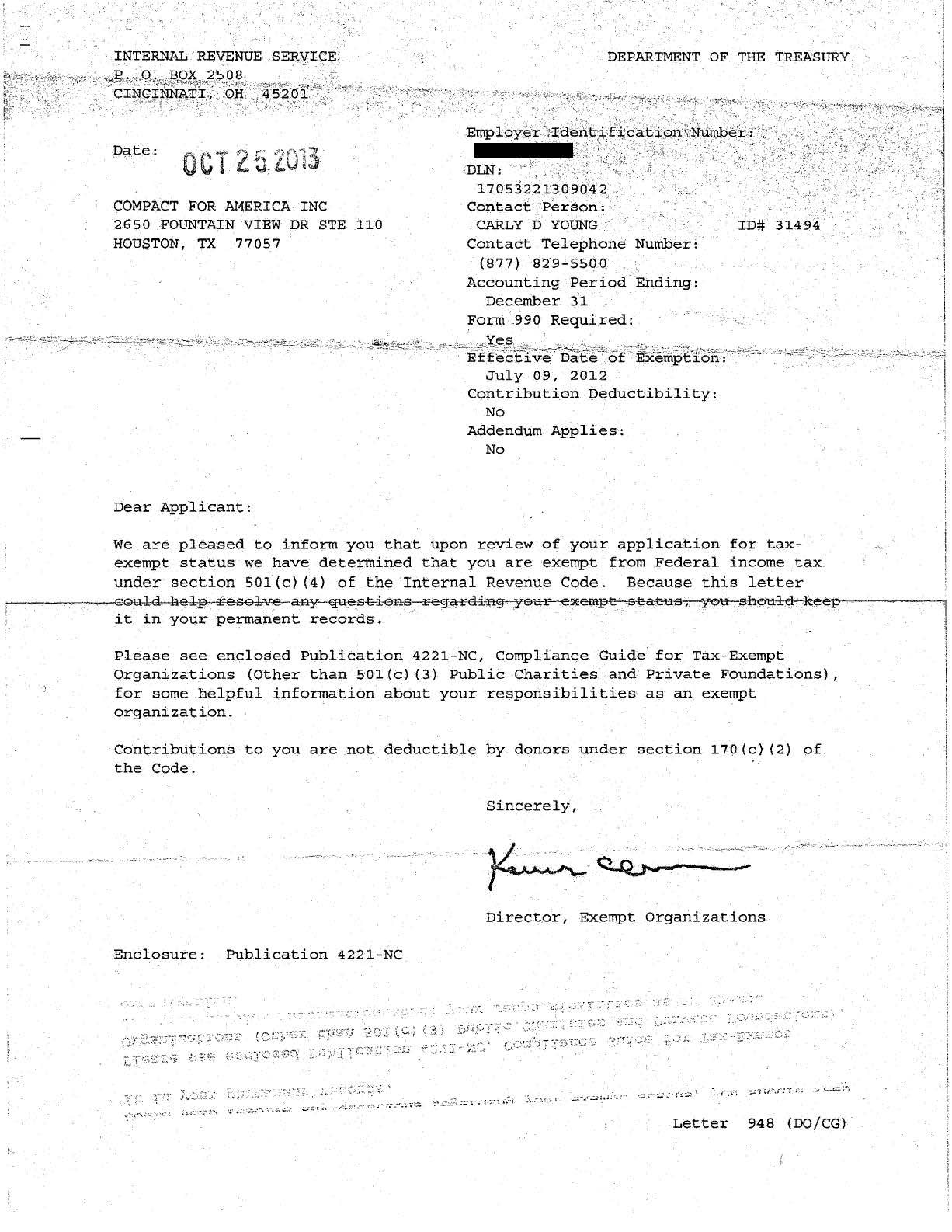 CFA
has published an approval letter from the IRS dated October 25, 2013
proving the 501(c)(4) status but to date has not published other
required tax forms regarding CFA(Action) (click image right to enlarge).
Under federal tax law an organization is required to undergo
an entirely different application process in order to receive 501(c)(4)
exemption starting with the filing of a completely different form (1024)
instead of the form (Form 1023) used
to determine 501(c)(3) status. Under
federal law, Form 1023 and Form 1024 becomes public record upon
approval of 501(c)(4) status by the Internal Revenue Service. The 1024
form for Compact for America(Action) has not been published by CFA on
its website and was not furnished to FOAVC when it requested Compact
for America provide "all" public tax records of Compact for America.
Other than publishing the IRS letter of approval CFA has provided no
other tax records required by law to be available for public
inspection. The IRS imposes penalties on organizations which fail to
provide public inspection tax records on request.
CFA
has published an approval letter from the IRS dated October 25, 2013
proving the 501(c)(4) status but to date has not published other
required tax forms regarding CFA(Action) (click image right to enlarge).
Under federal tax law an organization is required to undergo
an entirely different application process in order to receive 501(c)(4)
exemption starting with the filing of a completely different form (1024)
instead of the form (Form 1023) used
to determine 501(c)(3) status. Under
federal law, Form 1023 and Form 1024 becomes public record upon
approval of 501(c)(4) status by the Internal Revenue Service. The 1024
form for Compact for America(Action) has not been published by CFA on
its website and was not furnished to FOAVC when it requested Compact
for America provide "all" public tax records of Compact for America.
Other than publishing the IRS letter of approval CFA has provided no
other tax records required by law to be available for public
inspection. The IRS imposes penalties on organizations which fail to
provide public inspection tax records on request.FOAVC asks: Where are the other tax forms regarding CFA (Action) required to be available for public inspection?
A statement on the Compact for America Action page reads as follows: "Compact for America Education Foundation, Inc. (the "Educational Foundation" is a not-for-profit tax-exempt educational organization formed under section 501(c)(3) of the Internal Revenue Code and is recognized as such by the Internal Revenue Service pursuant to the IRS determination letter dated October 1, 2014. Additionally, the Educational Foundation was retained to serve as the Compact Administrator for the Compact for a Balanced Budget by the Compact for a Balanced Budget Commission on January 13, 2015 pursuant to a technical services agreement. The only Compact for America entity authorized to influence legislation either directly or by way of grassroots calls to action without regard to said technical advisory services contract is Compact for America, Inc. ("Compact for America Action"), which is a not-for-profit tax-exempt social welfare organization under section 501(c)(4) of the Internal Revenue Code and recognized as such by the Internal Revenue Service. [Emphasis Added]. The Educational Foundation is making every effort to ensure its operations are not confused with those of Compact for America Action."
CFA Education and CFA Action--Same Address
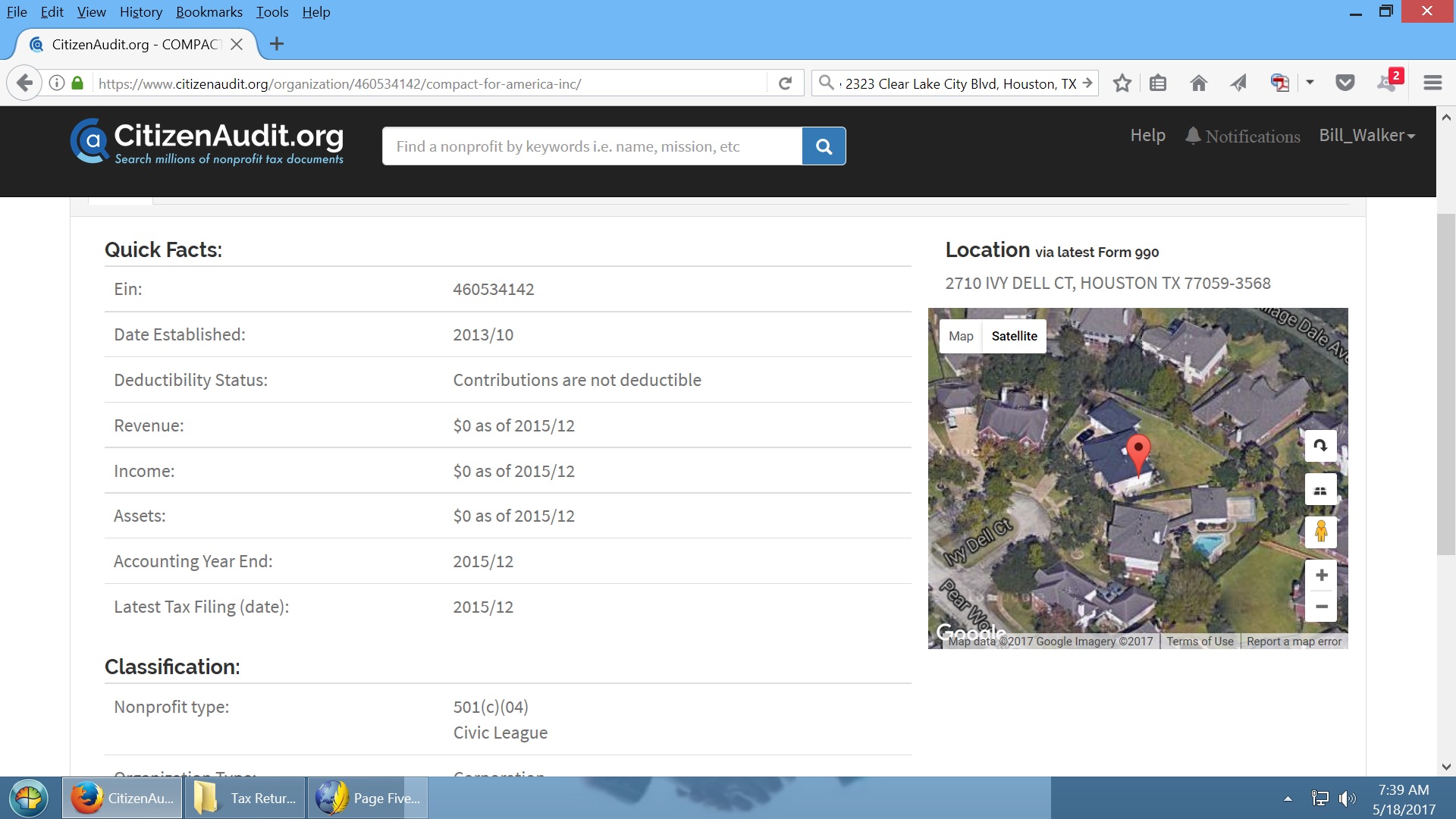 While
CitizenAudit.org (a website dedicated to making all public tax records
available for public inspection) lists Compact for
America Inc.,(Action),
there are no records of tax filings and other public records are routinely published on that site about
similar tax-exempt organizations (click image left to enlarge). CitizenAudit.org therefore provides
no proof of
public record that Compact for America(Action) while existing,
is actually a viable organization. Further there was no record, as far as FOAVC could determine, showing
Compact for America Inc.(Action) as being listed on the IRS website
showing tax exempt organizations despite the publication of an IRS approval letter on the CFA website.
While
CitizenAudit.org (a website dedicated to making all public tax records
available for public inspection) lists Compact for
America Inc.,(Action),
there are no records of tax filings and other public records are routinely published on that site about
similar tax-exempt organizations (click image left to enlarge). CitizenAudit.org therefore provides
no proof of
public record that Compact for America(Action) while existing,
is actually a viable organization. Further there was no record, as far as FOAVC could determine, showing
Compact for America Inc.(Action) as being listed on the IRS website
showing tax exempt organizations despite the publication of an IRS approval letter on the CFA website. 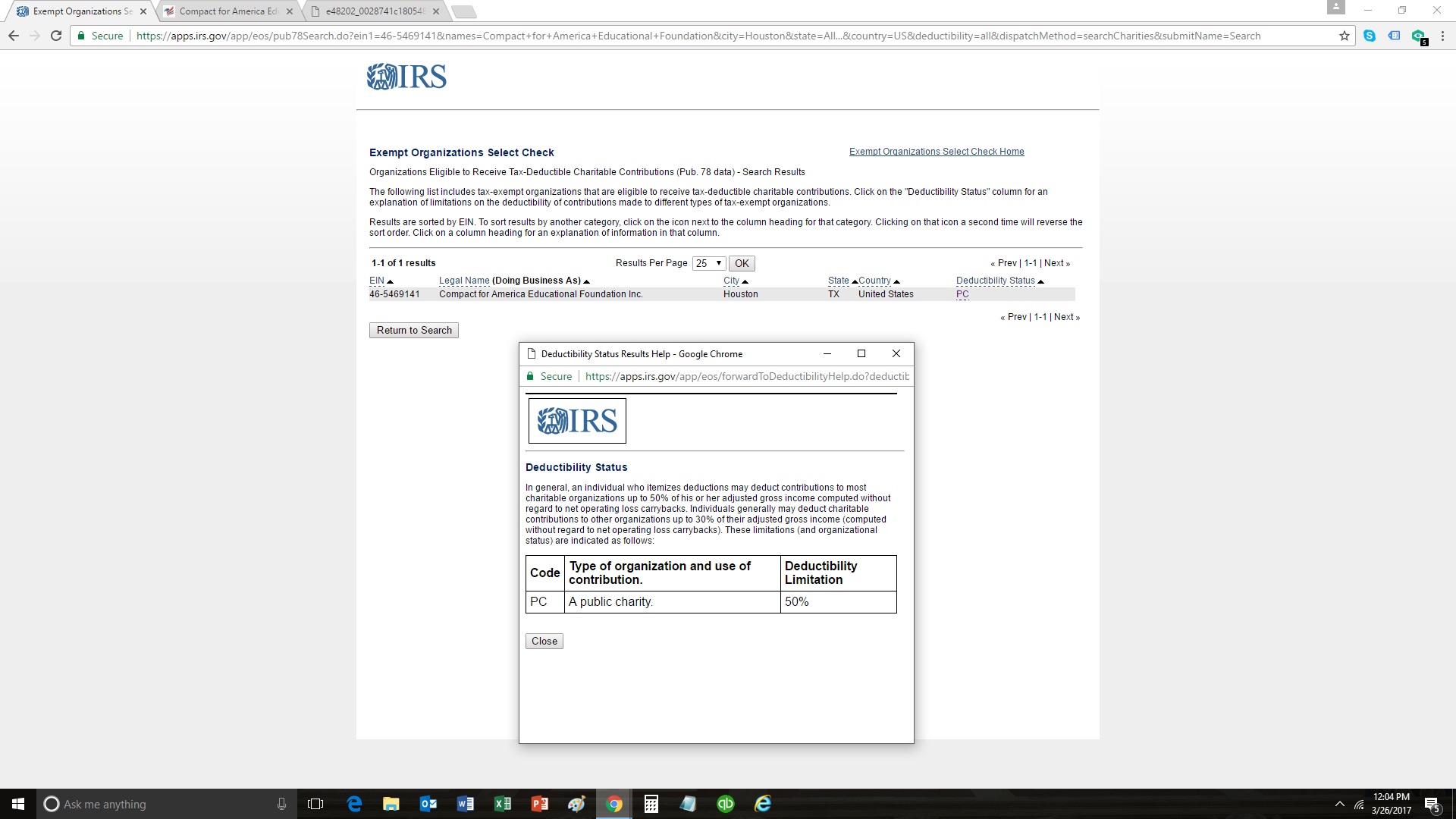 FOAVC raised the question to Compact for America regarding the lack of
proof regarding Compact for America--Action and was ultimately
sent a copy of a web page via email (later independently verified)
showing
the IRS record for Compact for America Educational Foundation, Inc.
A copy of the IRS database was sent
to FOAVC by Nick Dranias showing only a record for Compact for America
Educational Foundation Inc.
No corresponding database record for Compact for America(Action) was
furnished by CFA. If there are two organizations, there
should have been two IRS web pages listing two separate tax-exempt
organizations. CFA only produced evidence on the IRS database of one organization.
FOAVC raised the question to Compact for America regarding the lack of
proof regarding Compact for America--Action and was ultimately
sent a copy of a web page via email (later independently verified)
showing
the IRS record for Compact for America Educational Foundation, Inc.
A copy of the IRS database was sent
to FOAVC by Nick Dranias showing only a record for Compact for America
Educational Foundation Inc.
No corresponding database record for Compact for America(Action) was
furnished by CFA. If there are two organizations, there
should have been two IRS web pages listing two separate tax-exempt
organizations. CFA only produced evidence on the IRS database of one organization. 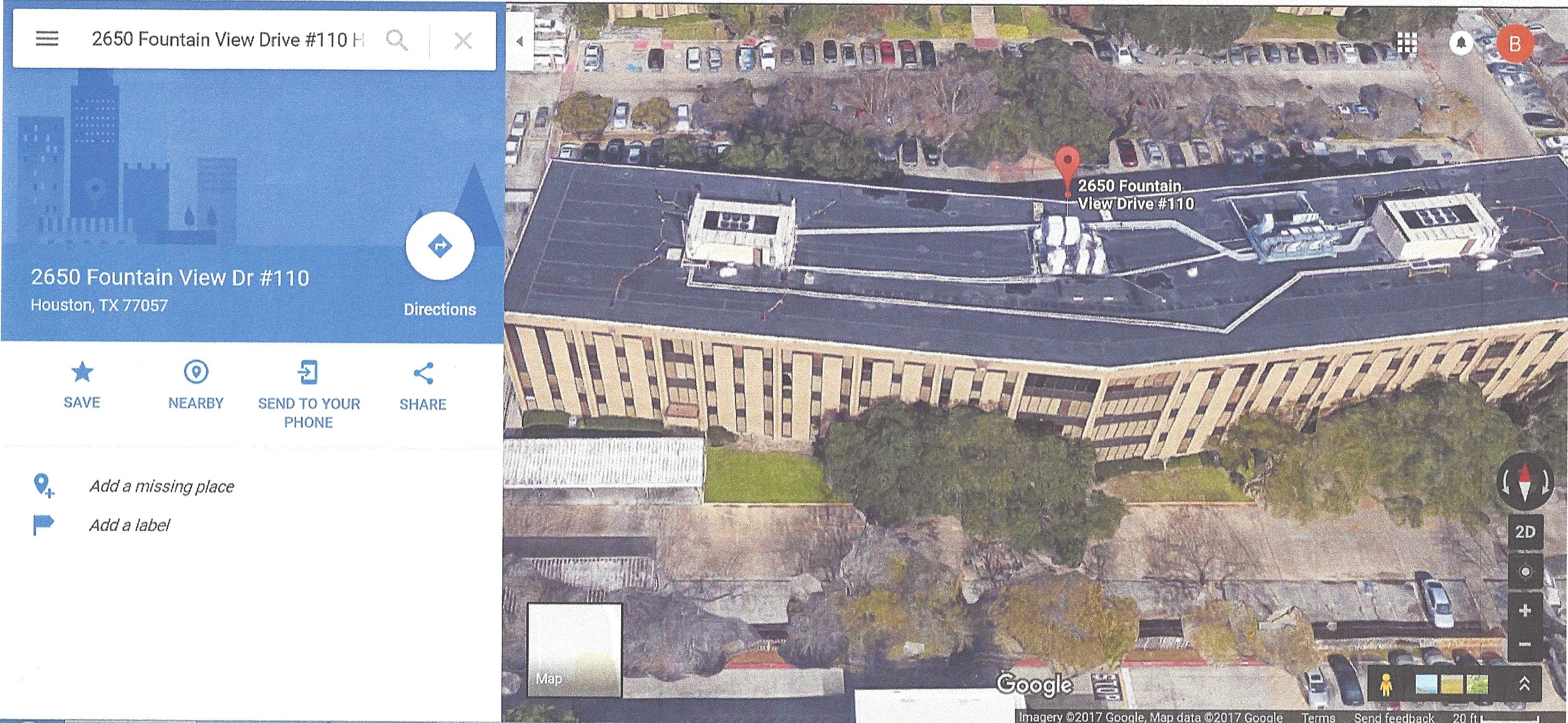
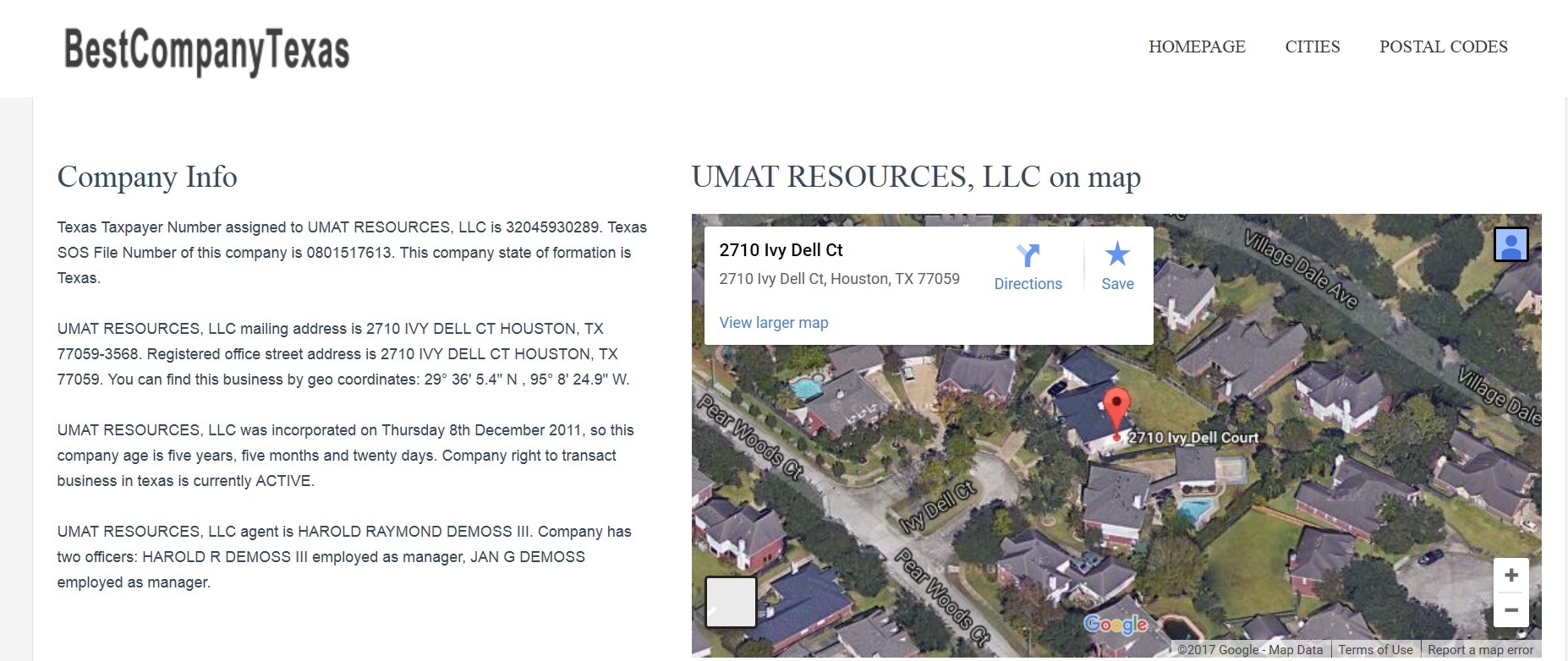 According
to the CitizenAudit.org website (click image left to enlarge) Compact
for
America Inc., which originally listed its address in 2012 and 2013 tax
returns as 2650 Fountain View Dr, Ste 110, Houston, TX, 77057 has since
moved to 2710 Ivy Dell Ct., Houston, TX 77059-3568.
The address 2650 Fountain View Dr., Ste 110, Houston, TX, 77057 is the
address of Tanglewood Capital Partners LLC (click image left to
enlarge.) According to the best information available the
firm is located in an office building in the Houston area. Tanglewood
Capital Partners LLC specializes in corporate financial advice, has
an annual revenue of $350,000 and a staff of approximately five.
Chip
DeMoss states in his CFA information he is a managing director at
Tanglewood. Information obtained by FOAVC shows DeMoss also "controls"
UMAT Resources Limited, LLC whose address is listed as 2710 Ivy Dell
Ct, Houston, TX, 77059-3568 (click image right to enlarge).
According
to the CitizenAudit.org website (click image left to enlarge) Compact
for
America Inc., which originally listed its address in 2012 and 2013 tax
returns as 2650 Fountain View Dr, Ste 110, Houston, TX, 77057 has since
moved to 2710 Ivy Dell Ct., Houston, TX 77059-3568.
The address 2650 Fountain View Dr., Ste 110, Houston, TX, 77057 is the
address of Tanglewood Capital Partners LLC (click image left to
enlarge.) According to the best information available the
firm is located in an office building in the Houston area. Tanglewood
Capital Partners LLC specializes in corporate financial advice, has
an annual revenue of $350,000 and a staff of approximately five.
Chip
DeMoss states in his CFA information he is a managing director at
Tanglewood. Information obtained by FOAVC shows DeMoss also "controls"
UMAT Resources Limited, LLC whose address is listed as 2710 Ivy Dell
Ct, Houston, TX, 77059-3568 (click image right to enlarge). 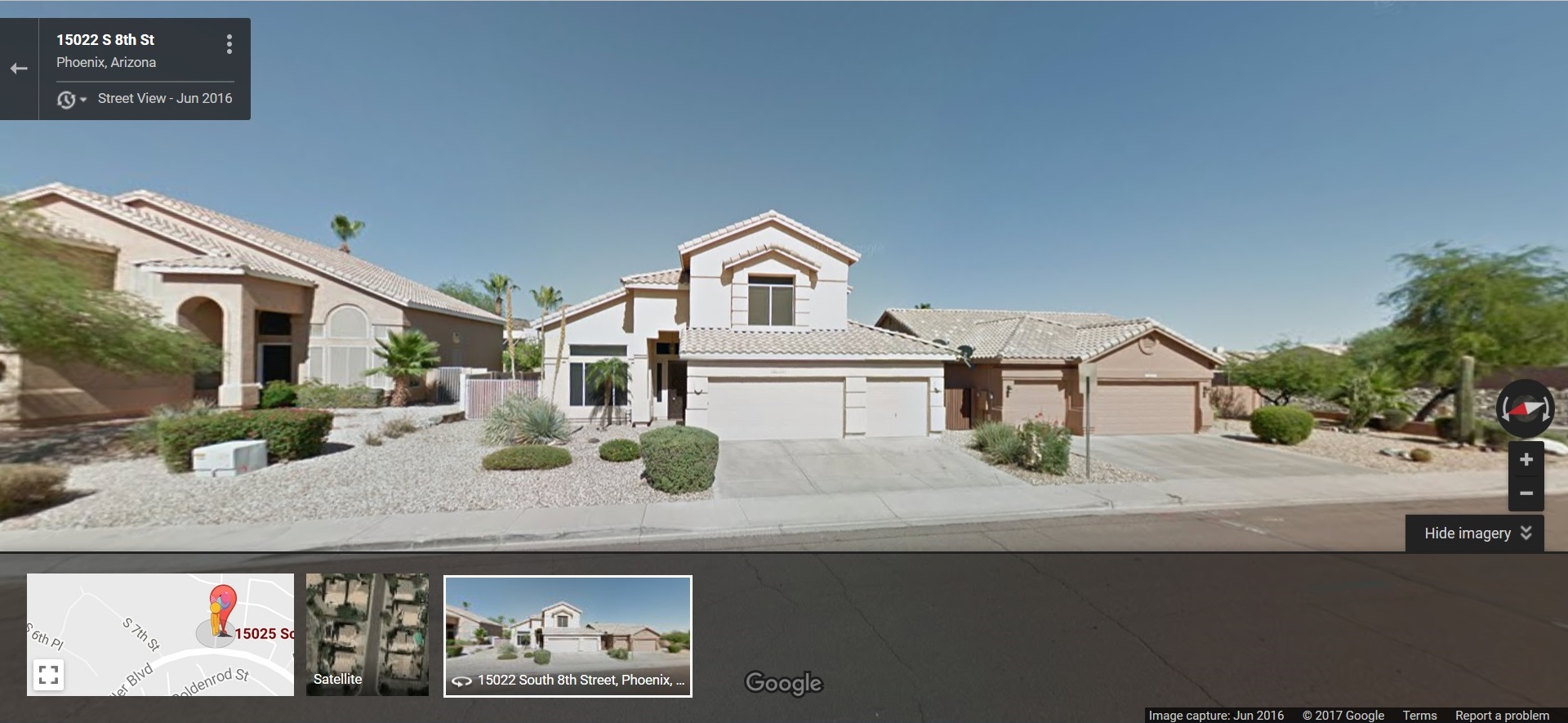
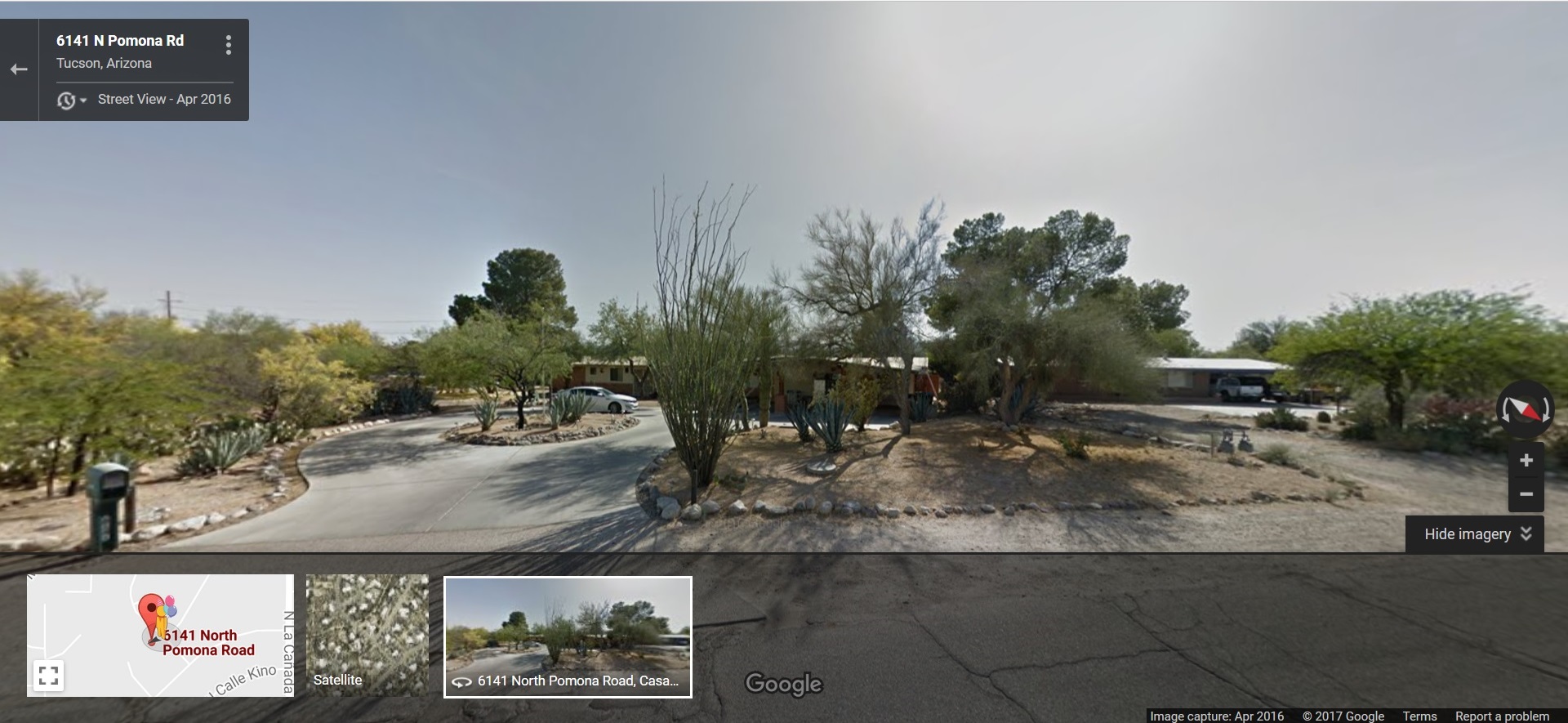 Others
listed as officers or directors of Compact for America Inc.,(Action)
include Nick Dranias and Jeff Utsch who list their employment
references on the CFA website. Dranias is the founder of Nick Dranias
Law & Policy Analysis LLC which, according to the best information available, is located at 15025 S. 8th St., Phoenix, AZ, 85048 (click image left to enlarge). Jeff Utsch is CEO of Tucson Acquisition & Development Corp
located at 6141 N. Pomona Rd, Tucson, AZ, 85704 (click image right to
enlarge). Both addresses appear to be single family residences.
Others
listed as officers or directors of Compact for America Inc.,(Action)
include Nick Dranias and Jeff Utsch who list their employment
references on the CFA website. Dranias is the founder of Nick Dranias
Law & Policy Analysis LLC which, according to the best information available, is located at 15025 S. 8th St., Phoenix, AZ, 85048 (click image left to enlarge). Jeff Utsch is CEO of Tucson Acquisition & Development Corp
located at 6141 N. Pomona Rd, Tucson, AZ, 85704 (click image right to
enlarge). Both addresses appear to be single family residences.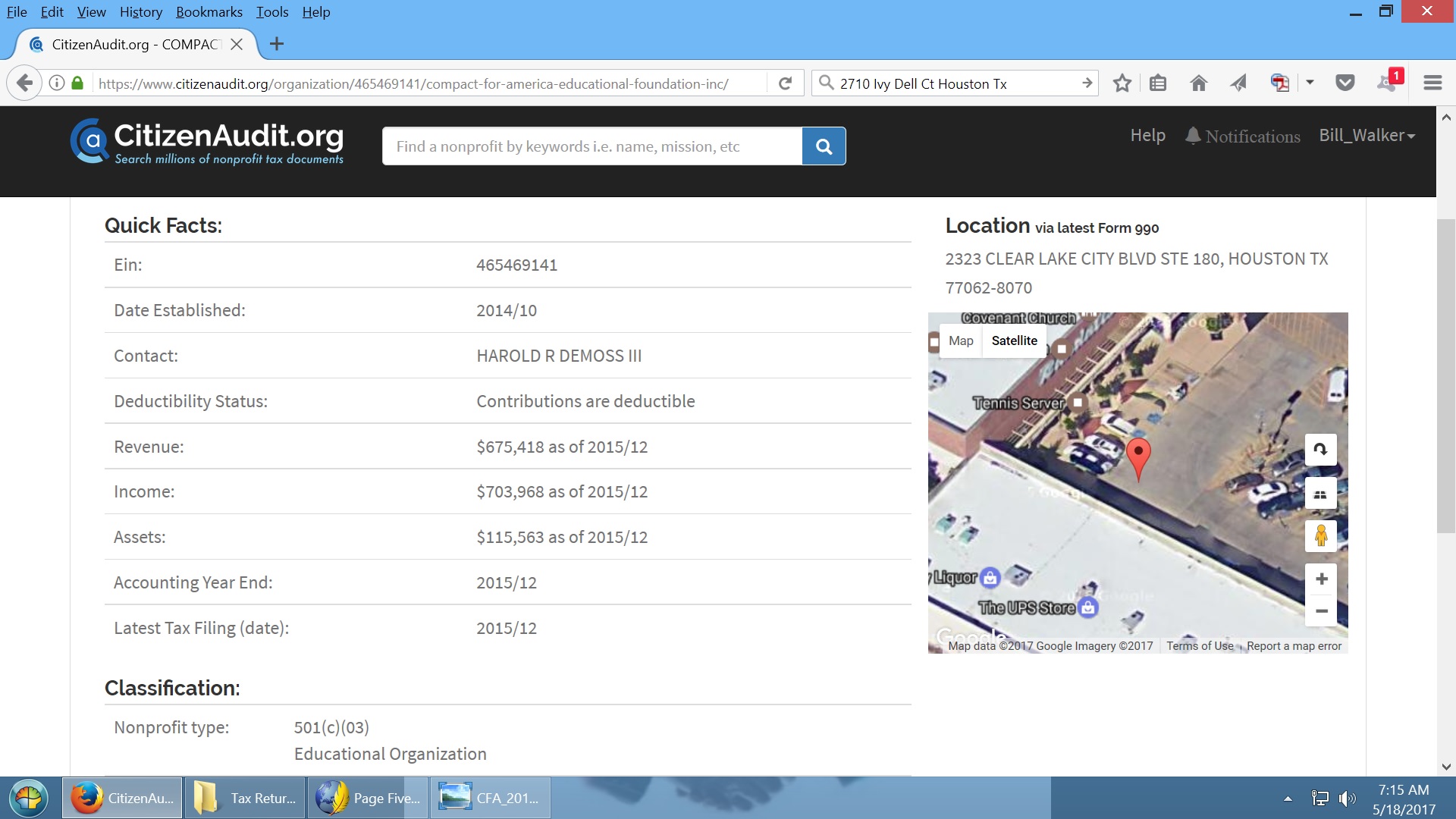 According to the best information available the address 2710 Ivy Dell Ct., Houston, TX 77059-3568 is a single family
residence occupied by "J....Gott" and "H...DeMoss" together with
several family members.
Further, as shown by CitizenAudit.org (click image right to enlarge)
the address of Compact for America Educational Foundation Inc. listed
as 2323 Clear Lake City Blvd, Ste 180, Houston TX, 77062-8070 is the address of a local UPS Store. Ste 180 is not an office suite but instead is a UPS mailing
box.
According to the best information available the address 2710 Ivy Dell Ct., Houston, TX 77059-3568 is a single family
residence occupied by "J....Gott" and "H...DeMoss" together with
several family members.
Further, as shown by CitizenAudit.org (click image right to enlarge)
the address of Compact for America Educational Foundation Inc. listed
as 2323 Clear Lake City Blvd, Ste 180, Houston TX, 77062-8070 is the address of a local UPS Store. Ste 180 is not an office suite but instead is a UPS mailing
box. The CFA independent audit reports (discussed in more detail below) attempt to make it appear the two organizations, Compact for America Educational Foundation Inc., and Compact for America Inc.,(Action) are separate organizations but fail to mention both organizations are run out of the same Houston Texas household. It is not unreasonable to postulate the only real "separation" which exists between Compact for America Educational Foundation Inc., and Compact for America Inc.,(Action) is the records for each organization are kept in two separate files inside the same filing cabinet in the home office space of the same household. Statements in both independent audit reports support this allegation: "The Foundation currently operates rent free from facilities and using office equipment owned by the members of the Foundation's executive management. The accompanying financial statements do not include expense or contributions related to this arrangement." (See page 10, 2014 report and page 10, 2015 report). Based on all available evidence it appears Compact for America Inc.,(Action) and Compact for America Educational Foundation, Inc., despite declarations of separation by CFA, are in fact managed and controlled in the same single family residence and therefore are separate in name only.
Does CFA(Action) Actually Exist?
FOAVC finds it significant that according to the CitizenAudit.org web page the revenue, income and assets for Compact for America Inc.,(Action) are listed as "zero." Yet, as discussed below independent audits conducted by Compact for America Education Foundation Inc. show that Compact for America Inc., (Action) sent $600 to the Compact for America Educational Foundation, Inc. FOAVC asks: With no assets, income or revenue for Compact for America Inc.,(Action) where did this money come from? FOAVC also asks: How can Compact for America Inc.,(Action) carry out its supposed "independent" lobbying activities when it has no financial resources whatsoever to do so?
Organizational Details of Compact for America
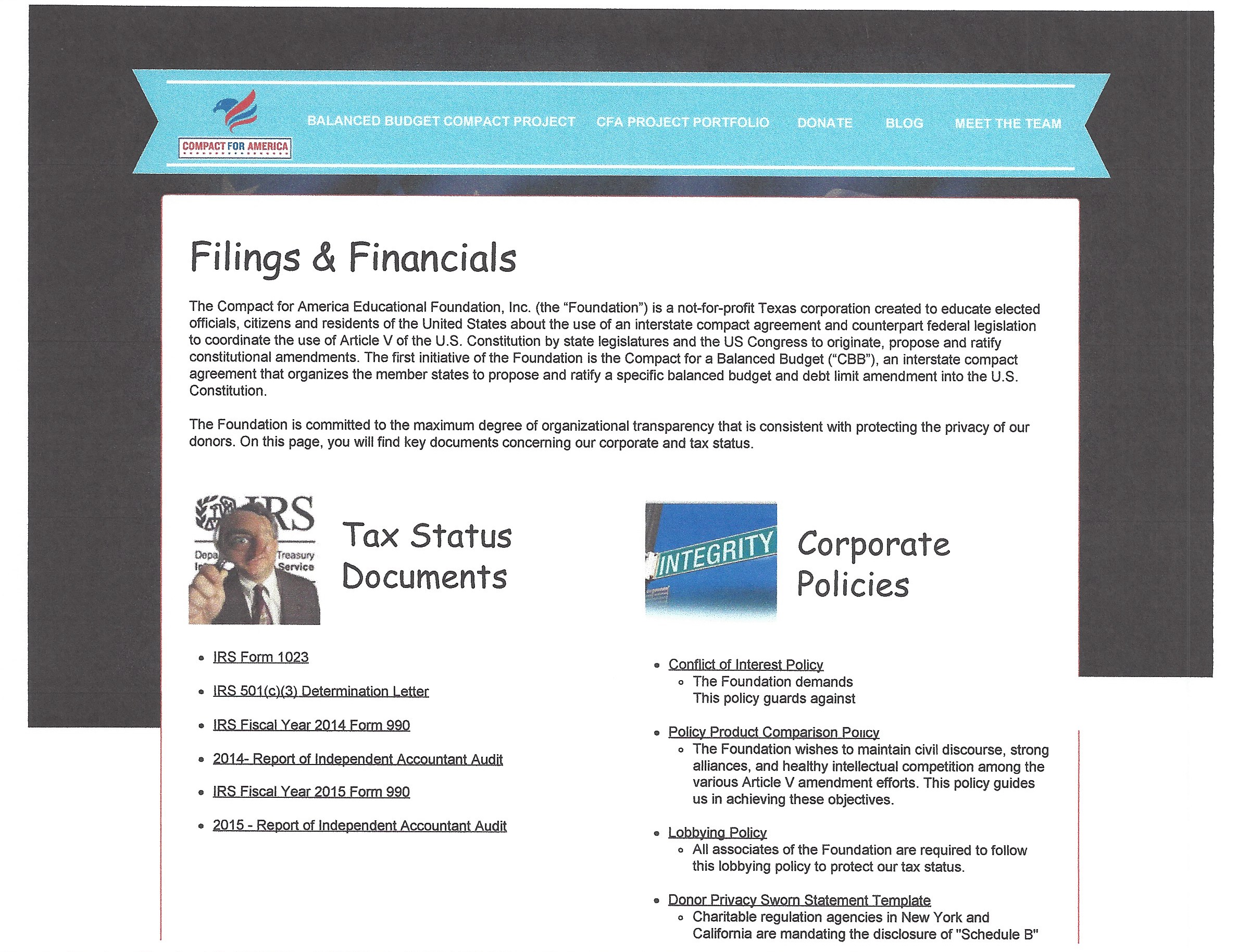 This
section will present all publications available dealing with
the organizational structure of Compact for America. The source of
these publication is the Compact for America website. As is our usual
policy
FOAVC
will provide unedited copies of all CFA documents but may highlight
certain
sections for reference and discussion. The CFA website page dealing
with financial information may be accessed by clicking the image at the
left.
This
section will present all publications available dealing with
the organizational structure of Compact for America. The source of
these publication is the Compact for America website. As is our usual
policy
FOAVC
will provide unedited copies of all CFA documents but may highlight
certain
sections for reference and discussion. The CFA website page dealing
with financial information may be accessed by clicking the image at the
left.Compact for America Corporation Papers and By-Laws
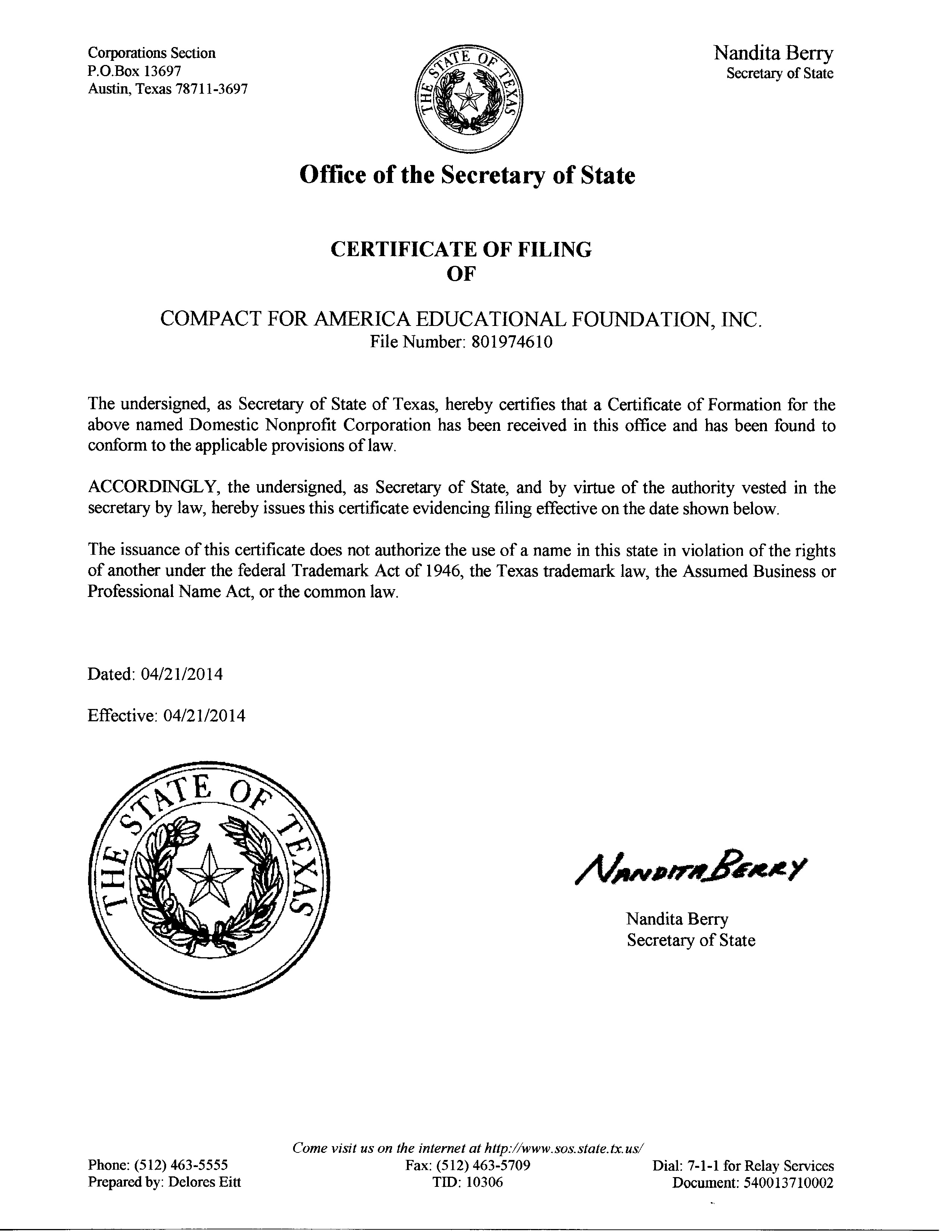 According
to records provided by Compact for America, the Compact for America
Educational Foundation Inc., referred to as the "Foundation" in its
corporate papers was incorporated in the State of Texas as a Domestic
Nonprofit Corporation on April 21, 2014 under file number 801974610 by
Texas Secretary of State Nandita Berry (click image right to enlarge).
According
to records provided by Compact for America, the Compact for America
Educational Foundation Inc., referred to as the "Foundation" in its
corporate papers was incorporated in the State of Texas as a Domestic
Nonprofit Corporation on April 21, 2014 under file number 801974610 by
Texas Secretary of State Nandita Berry (click image right to enlarge). Based on the public information available Compact for America Inc.,(Action) and Compact for American Educational Foundation Inc. appear to be the same organization. There is no corresponding corporate papers for Compact for America Inc., (Action) so far as FOAVC can determine. No corresponding corporate paperwork appears on the CFA website. The "Foundation" was formally incorporated in 2014 but it appears, so far as public record can determine, to be only a superficial name change from the original Compact for America, Inc. Despite the differences in names, all operational functions of the two organization appear to be simultaneous, that is, operating as a single organization.
Harold DeMoss is listed as CEO on all tax forms for both organizations. As discussed above the actual operations of the two organizations are supervised at the same address, the residence of "H...DeMoss." The reasons for Compact for America not providing the same information about Compact for America Inc.,(Action) (incorporation papers, certification of filing, list of officers, by-laws and so forth) as it has for the "Foundation" are unclear. All information provided by Compact for America on its website appear only to relate to the "Educational Foundation." There are no similar records relating to Compact for America Inc.,(Action) on the CFA website.
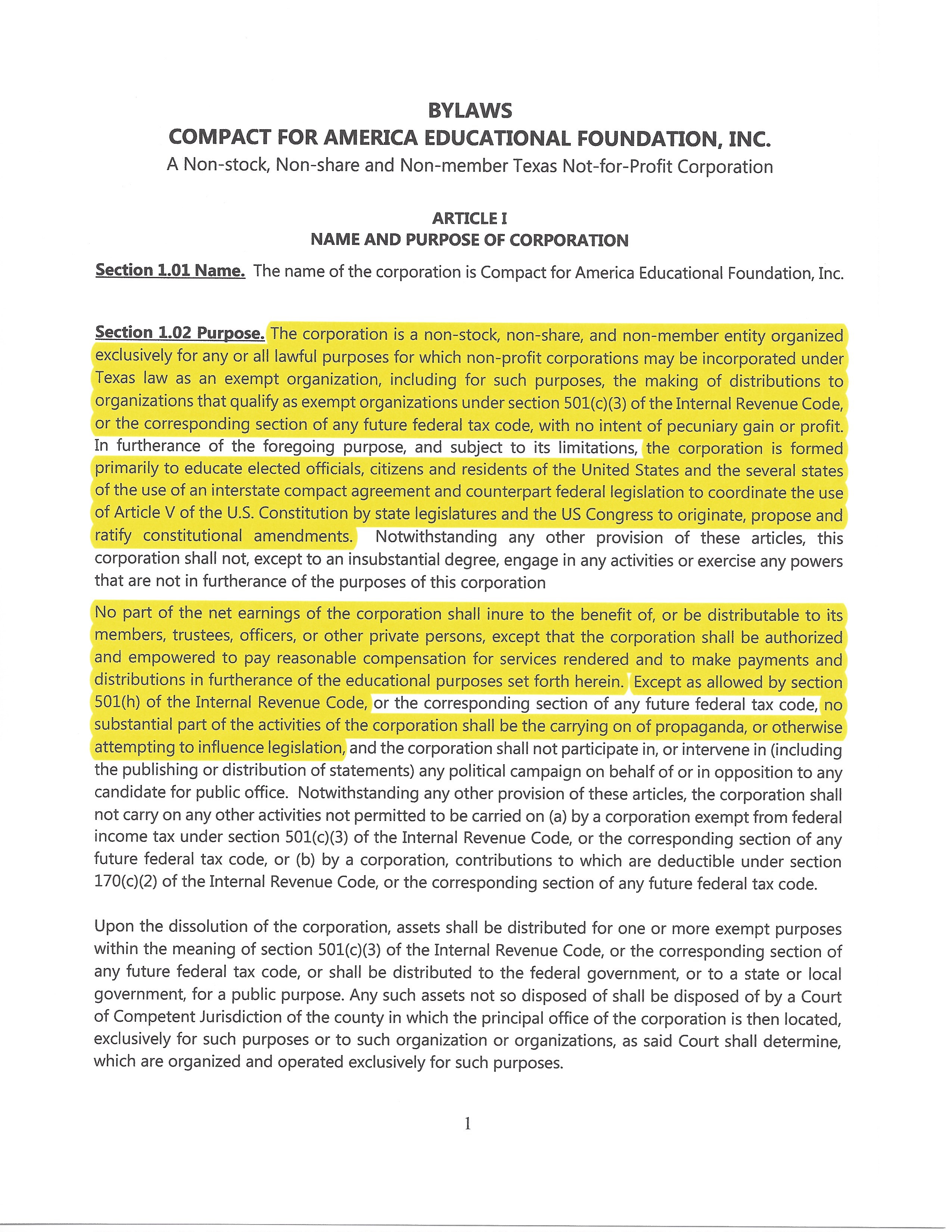 Based on the information signed by
CFA Corporate Secretary Keven R.C. Gutzman the Compact for America
Educational Foundation Inc., by-laws were originally signed on April
24, 2014 and later amended on October 24, 2014 (see page 8). Unlike the Constitution
which presents amendments separately the CFA by-laws were simply
rewritten in include any amendments. There is no way to determine what
text was amended or why it was amended. FOAVC provides a copy of
the CFA by-laws as posted on the CFA website (click image left to
enlarge). We have highlighted certain passages which we believe may
interest the public. Comments and discussion of the highlighted
portions will be referenced according to the page numbers of the
by-laws. There
is nothing in the by-laws of the "Foundation" stating it is a separate
organization from Compact for America Inc.,(Action) nor is there any
section devoted to Compact for America Inc.,(Action). CFA has not
published similar by-laws, internal regulations or similar material for
Compact for America, Inc.,(Action) thus leading to the conclusion
if such an organization exists, it exists in name only.
Based on the information signed by
CFA Corporate Secretary Keven R.C. Gutzman the Compact for America
Educational Foundation Inc., by-laws were originally signed on April
24, 2014 and later amended on October 24, 2014 (see page 8). Unlike the Constitution
which presents amendments separately the CFA by-laws were simply
rewritten in include any amendments. There is no way to determine what
text was amended or why it was amended. FOAVC provides a copy of
the CFA by-laws as posted on the CFA website (click image left to
enlarge). We have highlighted certain passages which we believe may
interest the public. Comments and discussion of the highlighted
portions will be referenced according to the page numbers of the
by-laws. There
is nothing in the by-laws of the "Foundation" stating it is a separate
organization from Compact for America Inc.,(Action) nor is there any
section devoted to Compact for America Inc.,(Action). CFA has not
published similar by-laws, internal regulations or similar material for
Compact for America, Inc.,(Action) thus leading to the conclusion
if such an organization exists, it exists in name only.The Question of "Education" Versus "Influence"
The most important clause in the CFA by-laws is on page 1, second paragraph. This clause states, "no substantial part of the activities of the corporation shall be the carrying on of propaganda, or otherwise attempting to influence legislation..." According to the requirements of the Constitution and federal law as well as Supreme Court rulings, the creation of a compact consists of nothing but passage of legislation by Congress and the states creating the compact. It is impossible to create a state compact without passage of legislation at both the federal and state level.
Therefore any effort (educational or otherwise) to create this particular form of compact (the first attempt in United States history) must be viewed as "attempting to influence legislation." This proposed form of amendment process has been created solely, exclusively and entirely by the organization known as Compact for America Inc. Whether the Internal Revenue Service would agree in this particular case, because of the unique nature of the compact sought by Compact for America and requirements of law which mandate nothing but passage of legislation that "education" and "influence" are, in fact, simultaneous, would of course be up to the IRS to determine.
Nevertheless FOAVC asks: how can Compact for America originate an entirely new form of compact law never existing in the history of the United States and not be attempting to influence legislation required to bring about the creation of this new form of compact law when no other option exists to accomplish that purpose except enactment of state and federal legislation creating this new form of compact law?
CFA Board of Directors
By-laws of Compact for America place total control of the organization in a "board of directors." (See page 2). Despite the fact the compact proposed by CFA influences the lives of every American with the passage of a proposed amendment by means of an entirely new amendment process, there is no provision in the by-laws for public input to influence any decision by this board of directors. FOAVC planned to present a pdf copy of the CFA page showing the CFA team (as the CFA web page phrases it). However it appears the page may be infected with a virus as attempts to download the page caused alerts from our virus protection software. FOAVC therefore provides the link to the CFA page instead: http://www.compactforamerica.org/meet-team. According to the by-laws (page 4) "any number of offices may be held by the same person." Thus, while the page shows several persons as members of the "team" as it is possible for one or two individuals to hold several titles within the organization, meaning only a few individuals may actually be involved in the day to day operations of Compact for America.
CFA Advisors--Just Window Dressing
On team page of the Compact for America website, CFA makes a emphasis on its "advisory" team members referred to as a "steering committee" in the by-laws (see pages 5-6). However closer examination of provisions in the by-laws reveals that, like the American people, these "advisors" have no real input in Compact for America. The by-laws state, "The sole function of the Steering Committee...shall be to advise and make non-binding recommendations to the Board of Directors within the areas of their respective experiences and expertise. In rendering advice to the Board of Directors, the Steering Committee shall have no obligation to conduct any individual research or investigation and shall be entitled to rely solely and exclusively upon the facts and information available to it at the time of the making of its recommendations, including, but not limited to, such facts and information as may be provided to the Steering Committee by the Corporation." [Emphasis added].
In sum, the CFA by-laws mandate any statements by any member of the CFA "steering committee" are not based on their own opinion or research but what they instructed to say by the Foundation board of directors. Any statement made by any member of the "steering committee" are therefore not statements made by the person himself based on his own independent thinking, but statements made by him as instructed by Compact for America. Therefore any reference by CFA to these "steering committee" statements really means CFA cites itself as its own reference of authority. FOAVC asks: As CFA by-laws forbid outside independent research or investigation of any CFA statement has any independent research or investigation of any "educational" information stated by CFA actually ever been conducted to verify the statements by Compact for America as valid, credible and accurate?
CFA Indemnification Policy
Compact for America by-laws contain a very extensive provision (see page 7-8) indemnifying the board of directors from any personal liability for "any action or omission of the Corporation." The inducement of indemnification is so central to officers and directors of Compact for America that CFA states in its by-laws indemnification from liability it is the major reason anyone has joined the organization at all. "The Corporation acknowledges that the foregoing indemnification is a material inducement to the officers and directors to serve in their capacities as such, and that such officers and directors would not agree to serve in the absence of the foregoing indemnification." With such obvious emphasis on indemnification and the fact Compact for America admits no one will serve in any capacity in Compact for America unless they are indemnified, FOAVC asks: why does Compact for America feel it must indemnify its directors and officers? According to their by-laws all CFA is attempting to do is "educate." What is it these officers and directors fear will occur to them if, as they say, all they are attempting to do is "educate" people?
Compact for America Conflict of Interest Policy
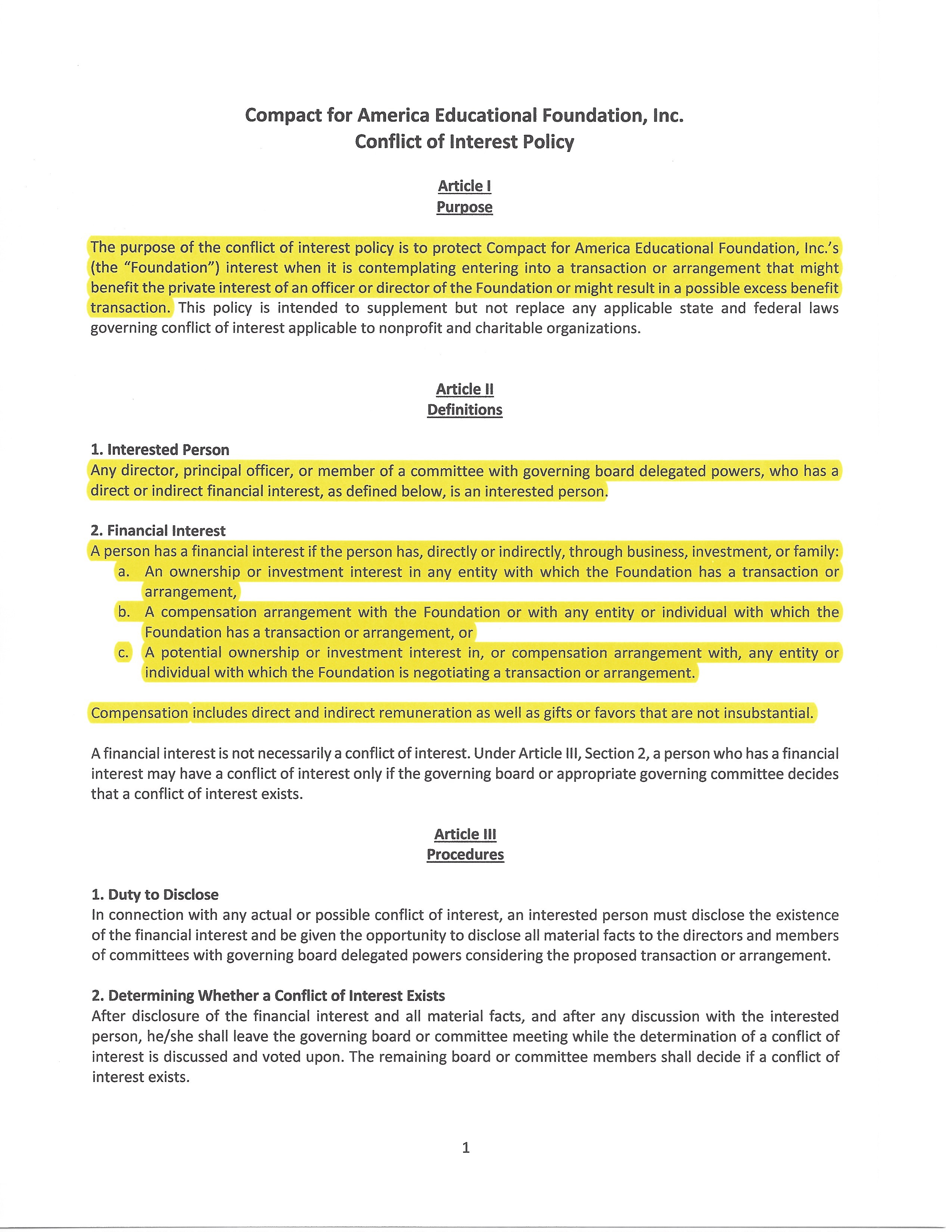 As
with many organizations, Compact for America has a financial conflict
of interest policy. The policy, (click image left to enlarge) deals
primarily with financial conflicts of interest between members of the
board of directors of Compact for America and "any entity with which
the Foundation has a transaction or arrangement...a compensation
arrangement [or] a potential ownership or investment interest in, or
compensation arrangement with, any entity or individual with which the
Foundation is negotiating a transaction or arrangement. (see page 1).
The Conflict of Interest Policy does not appear to apply to the general
membership of Compact for America. The policy calls for periodic
reviews of "activities that could jeopardize its [the Foundation's]
tax-exempt status.
As
with many organizations, Compact for America has a financial conflict
of interest policy. The policy, (click image left to enlarge) deals
primarily with financial conflicts of interest between members of the
board of directors of Compact for America and "any entity with which
the Foundation has a transaction or arrangement...a compensation
arrangement [or] a potential ownership or investment interest in, or
compensation arrangement with, any entity or individual with which the
Foundation is negotiating a transaction or arrangement. (see page 1).
The Conflict of Interest Policy does not appear to apply to the general
membership of Compact for America. The policy calls for periodic
reviews of "activities that could jeopardize its [the Foundation's]
tax-exempt status. Compact for America Independent Audits
According to the CFA Conflict of Interest Policy audit reviews are to include ("at the minimum") two subjects: "(a) Whether compensation arrangements and benefits are reasonable based on competent survey information, and the result of arm's length bargaining; and (b) whether partnerships, joint ventures, and arrangements with management organization conform to the Foundation's written policies, are properly record, reflect reasonable investment or payments for goods and services, further charitable purposes and do not result in inurement, impermissible private benefit or in an excess of benefit transaction." (See page 3).
As of May, 2017 Compact for America has published two independent audits both conducted by Ham, Langston & Brezina LLP, Certified Pubic Accountants, 11550 Fuqua, Suite 475, Houston, Texas 77034. Compact for America lists its address as 2323 Clear Lake Blvd., Suite 180-190, Houston, Texas, 77062, a UPS mailing box. The two addresses are located just over a mile from each other. Examination of Better Business Bureau records shows the firm of Ham, Langston & Brezina LLP, founded in 1996, to have an A+ rating with no complaints filed against it.
Despite the fact at least five states have passed legislation joining the Compact for a Balanced Budget there is no record of any member state conducting an independent audit of Compact for America Foundation, Inc., Compact for America(Action), or the Compact for a Balanced Budget Commission. Audit laws which appear to apply to either the Commission or Compact for America include Arizona, Alaska, Georgia and North Dakota. A specific decision to whether the laws are applicable would have to be made by state authorities.
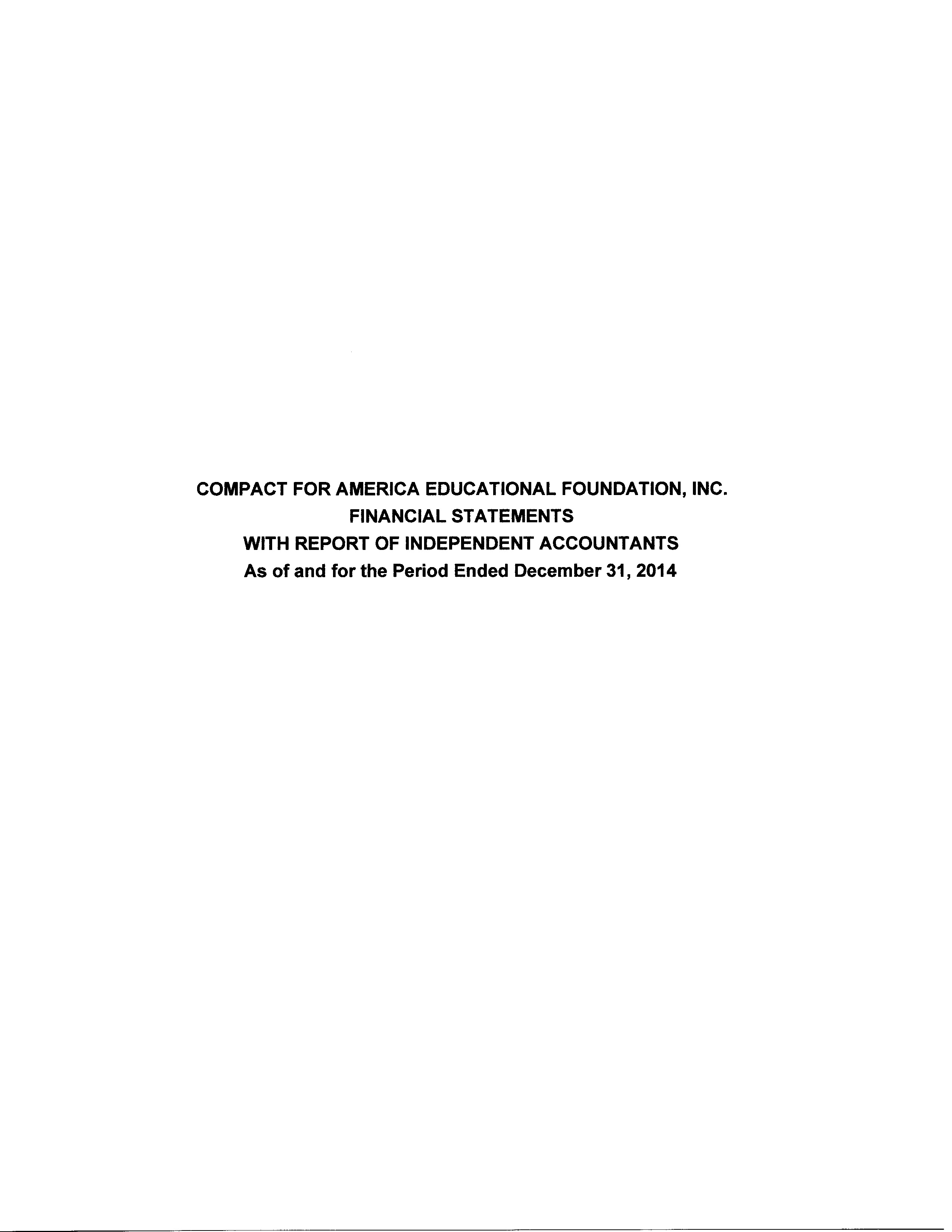 Ham, Langston & Brezina first audit of Compact for America Foundation, released June 29, 2015, covered the time period from the inception of Compact for America Foundation
on April 21, 2014 to December 31, 2014. No reference is made to Compact for America (Action). The audit described the
financial position of COS as of December 31, 2014 as well as providing
a statement of activities of COS from April 21, 2014 to December 31,
2014 and a statement of cash flow for the same time period (Click image
left to enlarge).
Ham, Langston & Brezina first audit of Compact for America Foundation, released June 29, 2015, covered the time period from the inception of Compact for America Foundation
on April 21, 2014 to December 31, 2014. No reference is made to Compact for America (Action). The audit described the
financial position of COS as of December 31, 2014 as well as providing
a statement of activities of COS from April 21, 2014 to December 31,
2014 and a statement of cash flow for the same time period (Click image
left to enlarge). 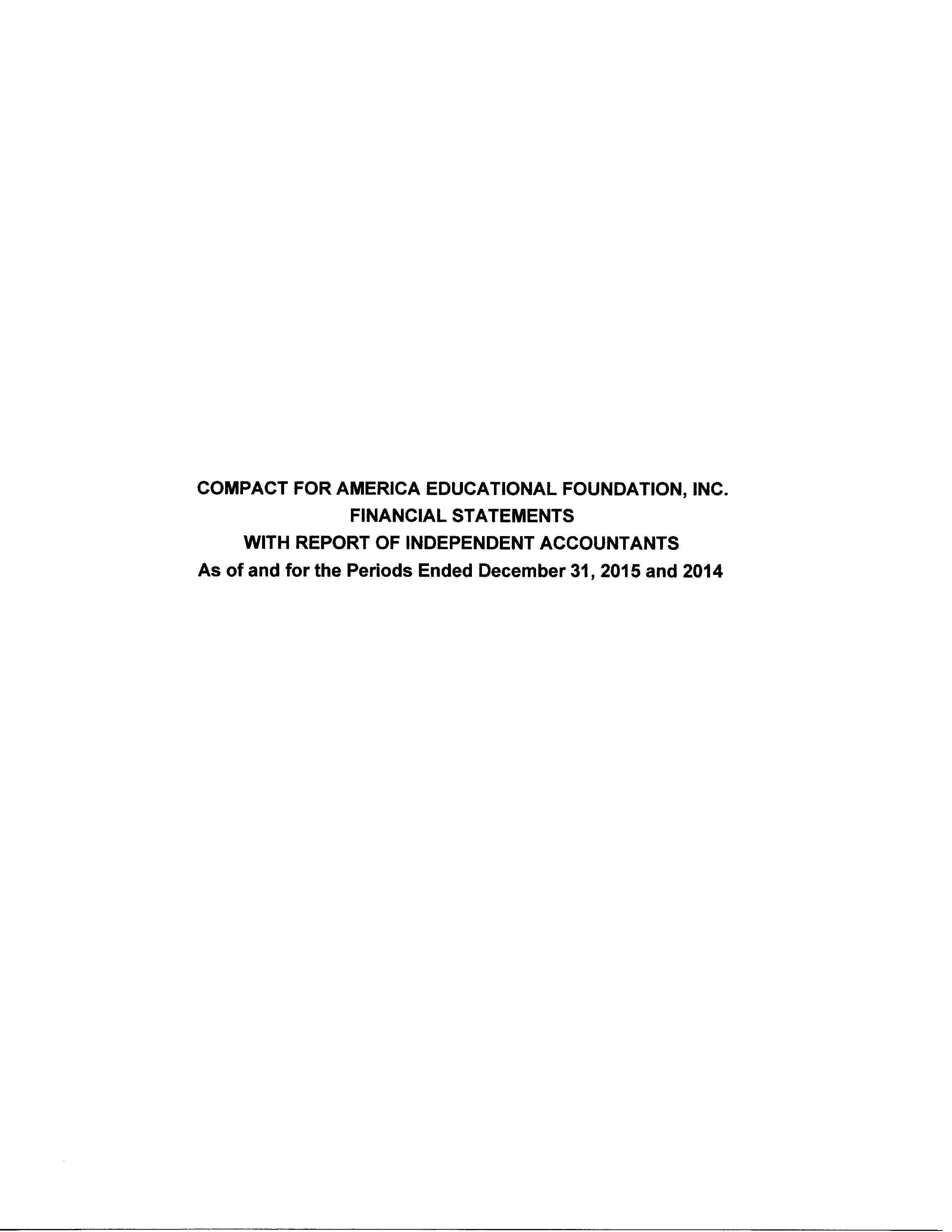 The
second audit, released August 16, 2016, covered the financial position
of Convention of States (Foundation) for December 31, 2015 and 2014 also showed the state of activities for the year ending December 31, 2015 and
for the "Period from Inception, April 21, 2014 to December 31, 2014."
The statement of cash flows similarly covered the year ending December
31, 2015 and
"for the
Period from Inception, April 21, 2014 to December 31, 2014." (Click
image right to enlarge). This is a common auditing practice allowing
the
reader to compare sequential financial periods of an organization.
The
second audit, released August 16, 2016, covered the financial position
of Convention of States (Foundation) for December 31, 2015 and 2014 also showed the state of activities for the year ending December 31, 2015 and
for the "Period from Inception, April 21, 2014 to December 31, 2014."
The statement of cash flows similarly covered the year ending December
31, 2015 and
"for the
Period from Inception, April 21, 2014 to December 31, 2014." (Click
image right to enlarge). This is a common auditing practice allowing
the
reader to compare sequential financial periods of an organization.
CFA(Action) Lacks Independent Audits
Compact for America has never released any audit by Ham, Langston & Brezina (or any other independent accounting firm) regarding the first two years of CFA (2012-2013) under the name Compact for America Inc. or any audit for any other tax year under the name Compact for America Inc.,(Action).
The lack of public tax records, audits, incorporation papers, by-laws and other documents, many of which are required by law to be publicly available, for the organization labeled by CFA as "Compact for America Inc.,(Action) raise questions not only as to the existence of Compact for America Inc.,(Action) but the credibility of statements by Compact for America of "independence" between the two purported organizations. It is difficult to prove "independence" between two supposed organizations when it is impossible to prove one of the two organizations actually exists as a truly operational entity.
The fact there has not been an independent audit of Compact for America Inc.,(Action) by an organization which otherwise has gone out of its way to present the appearance of integrity indicate: (1) Compact for America does not want anyone snooping around in the financial records of "Compact for America Inc.,(Action) and/or (2) there are no financial records of Compact for America Inc.,(Action) to audit as they do not exist. The fact the only public financial records of Compact for America Inc.,(Action) available indicate Compact for America Inc.,(Action) has zero assets, zero revenue and zero income appear to support both conclusions as being true.
Auditors Refuse to Comment on CFA Audit Standards
The Compact for America Conflict of Interest Policy states that "at the minimum" any audit shall determine (a) "whether compensation agreements are reasonable" and (b) "whether arrangements with management organizations conform to the Foundation's written policies." Despite these requirements the independent auditors hired by Compact for America specifically declined to make any statements regarding effectiveness of what CPA labeled as "the Foundation's internal control[s]." Instead Ham, Langston and Brezina LLP only makes a "qualified audit opinion" stating, "In our opinion the financial statements referred to .... present fairly, in all material respects the financial position of the Foundation ... in conformity with accounting principles generally accepted in the United States of America."
Further, Ham, Langston and Brezina LLP make no mention nor comment on the first requirement of the Compact for America by-laws that an independent audit determine "Whether compensation arrangements and benefits are reasonable based on competent survey information, and the result of arm's length bargaining." There is no evidence or reference in the report "competent survey information" of any description nor any evidence or reference to prove bargaining for compensation was at "arm's length" negotiations. It is unclear whether Compact for America provided the independent auditing firm the required surveys and proof of "arm's length bargaining" needed to make such determination as required in their by-laws. Thus it is unknown whether Ham, Langston and Brezina LLP declined to include that information in their independent audit on their own initiative or simply never was provided the information in the first place by Compact for America.
Most of the comments by the CPA firm deals with the "internal control relevant to the Foundation's preparation and fair presentation of the financial statements that are free from material misstatement, whether due to fraud or error." The term, "fraud or error" is mentioned twice in the CPA report. The comments of the CPA firm are identical in the 2014 and 2015 report.
Ham, Langston and Brezina state, "An audit involves performing procedures to obtain audit evidence about the amounts and disclosures in the financial statements. The procedures elected depend on the auditor's judgment, including the assessment of the risks of material misstatement of the financial statements, whether due to fraud or error. In making those risk assessments, the auditor considers internal control relevant to the Foundation's preparation and fair presentation of the financial statements in order to design audit procedures that are appropriate in the circumstances, but not for the purpose of expressing an opinion on the effectiveness of the Foundation's internal control. Accordingly, we express no such opinion." (See Page 2 of the audit).
As there is no change in language regarding concerns of effectiveness by the CPA firm between the 2014 and 2015 reports it is fairly reasonable to conclude that despite the requirements of its own by-laws that an independent audit address two specific areas of "internal control" no action has been taken by Compact for America to correct the deficiencies causing Ham, Langston and Brezina LLP to decline rendering an audit opinion on the effectiveness of CFA internal controls between the time of the first report (June 29, 2015) and the second report (August 16, 2016).
Perhaps discovering one of the two purported "independent" CFA organizations has zero assets, income and revenue and is controlled in the same single family residence as the other "independent" organization may have a bearing on the decision of Ham, Langston and Brezina not to express an opinion on the "effectiveness of the Foundation's internal control."
Details of the Audits
Massive Contributions, Few Individuals
In the first report covering the period from April 21, 2014 to December 31, 2014 contributions to Compact for America totaled $256,362. Management was paid a total of $44,900 for the purposes of managing and directing Compact for America Inc.,(Action). (See pages 4, 9 of the report). The report notes $600 was advanced from Compact for America Inc.,(Action) (an organization which reports zero assets, zero revenue and zero income) to the Foundation. (See page 5 of the report). "In January, 2015, the Foundation received a major unrestricted cash contribution of $500,000" from only identified as "Donor Number 3." (See page 10 of the report). The report reveals that 59% ($153,817) of the $256,362 in donations received by Compact for America during this period came from two unnamed donors identified as Donor Number 1 and Donor Number 2. Donor Number 1 donated 39% of the total donations ($99,981.18). Donor Number 2 donated 20% of the total donations ($53,835.82). (See page 9 of the report).
In the second report covering the year 2015 (ending December 31, 2015) as well as the period from inception in 2014, the independent audit states a third unnamed donor (Donor Number 3) provided 73% of the contributions received by Compact for America. According to the audit report the two previous donors (Donor Number 1 and Donor Number 2) contributed less than 10 percent of total donations received by CFA in 2015. It is likely the person referred to as "Donor Number 3" in the 2015 audit report was the same person referred to in the 2014 report as donating $500,000 to Compact for America. However the 2015 report lists total contributions as $663,491. Seventy-three percent of $663,491 is $488,728.43 which is not the $500,000 stated in the audit. The audit fails to explain the apparent discrepancy in donation figures when the percentages given are calculated and compared to the reported amounts donated. (See pages 4 and 9 of the report).
Compact for America donor policy encourages secrecy for the express purpose of avoiding state regulations requiring tax-exempt organizations within their jurisdiction reveal the names of donors listed on a Schedule B Tax Form of their 990 income tax return. The Compact for America Financial page provides a Donor Privacy Sworn Statement Template which states, "Charitable regulation agencies in New York and California are mandating the disclosure of "Schedule B" donors by charities seeking contributions within their jurisdiction. Donors who are concerned about maintaining the confidentiality of their gift from such mandatory disclosure should review this template with their legal counsel and consider signing and delivering, after appropriate modifications, to the Foundation."
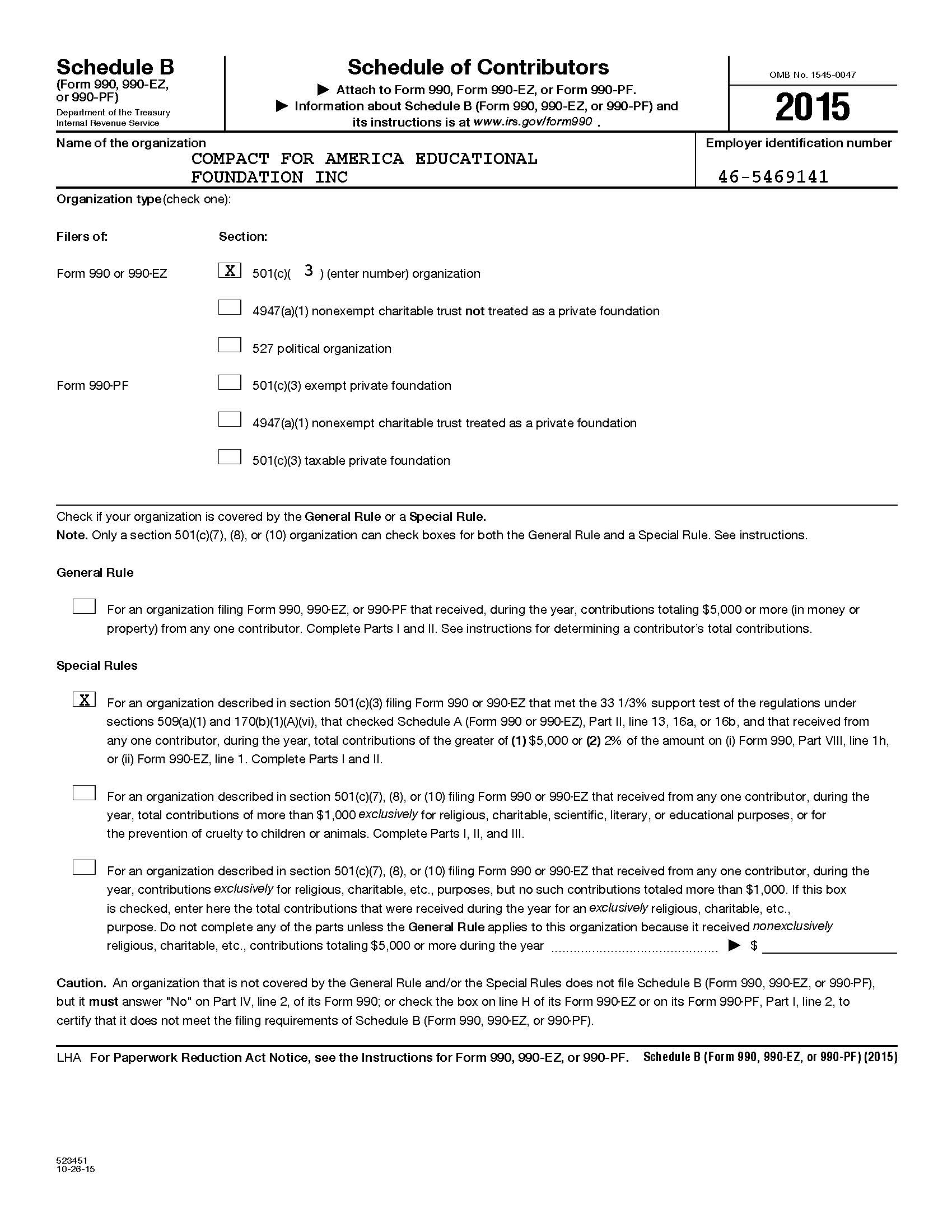 IRS regulations concerning listing names of donors on a Schedule B Tax Form are complex.
Whether a name is listed on the public inspection tax form is
determined by the amount of the donation and other factors described in
the tax form. In 2014 Compact for America Educational Foundation Inc.,
did not file a Schedule B Tax Form but stated in its 2014 audit report
that "Donor Number 1 and Donor Number 2" contributed approximately
$100,000 and $54,000 respectively to Compact for America that year.
Oddly, donations in amounts much less than the figures reported in the 2014 audit appear to have caused CFA to have to file a Schedule B Tax Form
in its 2015 tax return (click on image right to enlarge). CFA does not
provide the names of the donors in its 2015 Schedule B Tax Form.
IRS regulations concerning listing names of donors on a Schedule B Tax Form are complex.
Whether a name is listed on the public inspection tax form is
determined by the amount of the donation and other factors described in
the tax form. In 2014 Compact for America Educational Foundation Inc.,
did not file a Schedule B Tax Form but stated in its 2014 audit report
that "Donor Number 1 and Donor Number 2" contributed approximately
$100,000 and $54,000 respectively to Compact for America that year.
Oddly, donations in amounts much less than the figures reported in the 2014 audit appear to have caused CFA to have to file a Schedule B Tax Form
in its 2015 tax return (click on image right to enlarge). CFA does not
provide the names of the donors in its 2015 Schedule B Tax Form. Donated amounts shown on the 2015 Schedule B Tax Form do not correspond with amounts reported in the CFA 2015 independent audit. The independent audits and income tax forms for CFA were both prepared by the same CPA firm, Ham, Langston and Brezina. The reason for discrepancies is likely due to the fact the IRS sets different standards of reporting than Ham, Langston and Brezina felt was necessary for its own independent audit. Other than asking for general public donations, which for the years 2014-15 totaled $265,853, CFA appears to be an organization closed to the American public. The amount of general pubic donations of what can be described as "small amounts" received by CFA is arrived at by adding the total donations reported for the two years in the audit reports ($919,853) then subtracting donations described in the report by unnamed Donors Number 1,2 and 3 ($654,853). The result is $265,853 spread out over two years.
However, based on the amounts reported in the 2015 Schedule B Tax Form much of $265,853 came from three other unnamed donors. The amount donated by three individuals listed in the 2015 Schedule B Tax Form (not counting the $500,000 donation) totals $95,000. Subtracting this $95,000 from the $265,853 leaves approximately $170,853 in small amount public donations collected by Compact for America Educational Foundation Inc., over a two year period. CFA received approximately $94,998 a year (or approximately $7,900 a month) in small amount public donations. This amount is totally inadequate to support Compact for America based information contained in the independent audits. The approximately $95,000 in general public donations gathered over the year doesn't even cover the $280,900 spent in management compensation for Compact for America for the years 2014-15 (discussed in further detail below).
For all practical financial intents Compact for America Educational Foundation Inc., and Compact for America Inc.,(Action) appear to be supported by six wealthy unnamed individuals. Without the large donations from these six wealthy individuals Compact for America Education Foundation Inc., and Compact for America Inc.,(Action) would, financially speaking, cease to exist.
Statement of Limited Influence, Government Exemption
Both reports contain the identical statement, "The Foundation does not participate in any political activities involving the election of federal, state or local candidates for public office. Pursuant to section 501(h) of the Internal Revenue Code, the Foundation has elected to make limited expenditures to influence legislation. Further, in its capacity as the Compact Administer of the Compact for a Balanced Budget, the Foundation and its officers are serving at the direction of the Compact for a Balanced Budget Commission, a recognized interstate agency, and are therefore exempt from lobbying registration under most state laws. Separate and apart from the Foundation, Compact for America, Inc. ("CFA-Action"), a Texas not-for-profit tax-exempt social welfare organization formed under section 501(c)(4) of the Internal Revenue Code and recognized as such by the Internal Revenue Service, has been established to conduct additional lobbying activities to influence legislation related to the Foundation. ... [The] Foundation and CFA-Action are not technically affiliated entities and have officers and members of the board of directors that differ from each other..." (See page 6, 2014 report and page 6, 2015 report of the report).
CFA Management and Director Crossovers
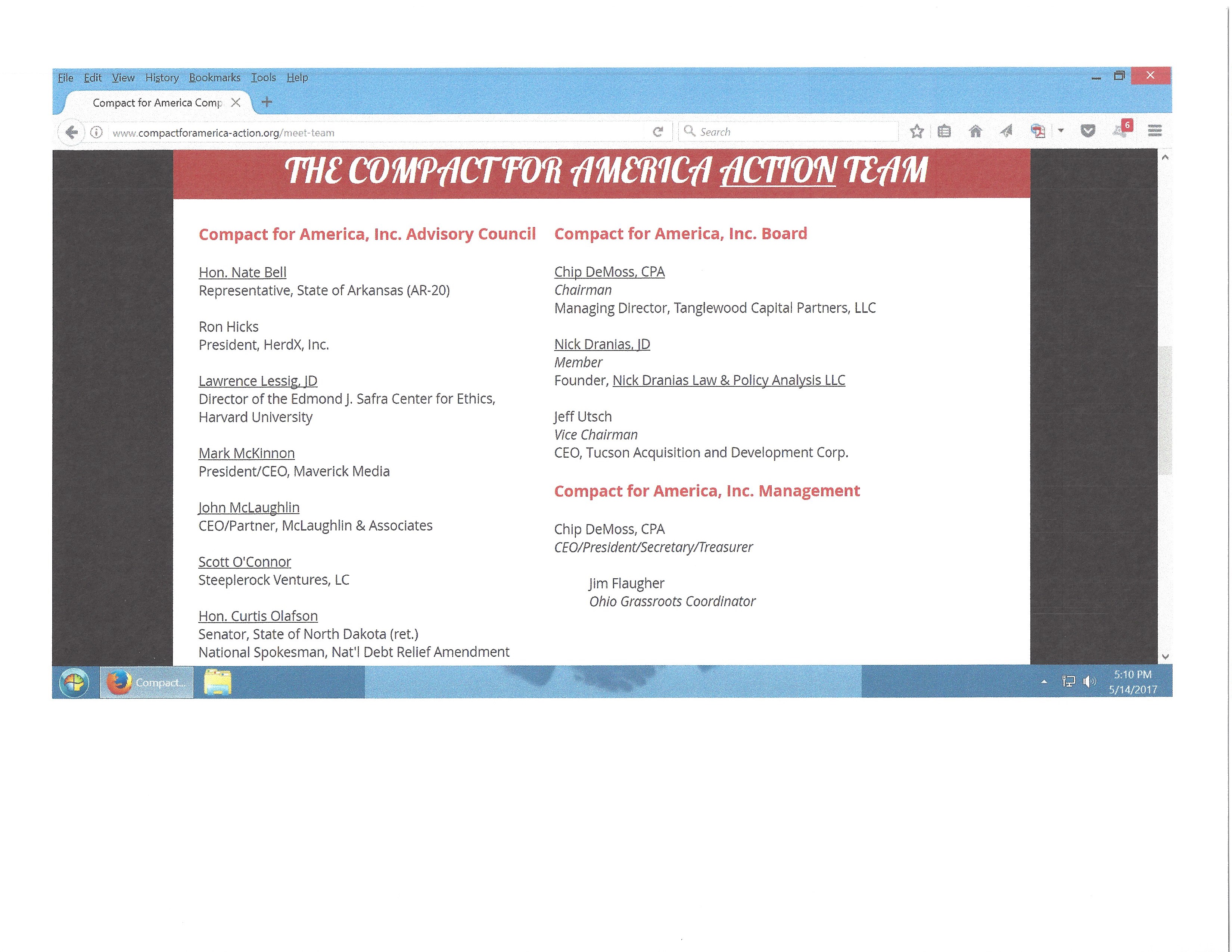
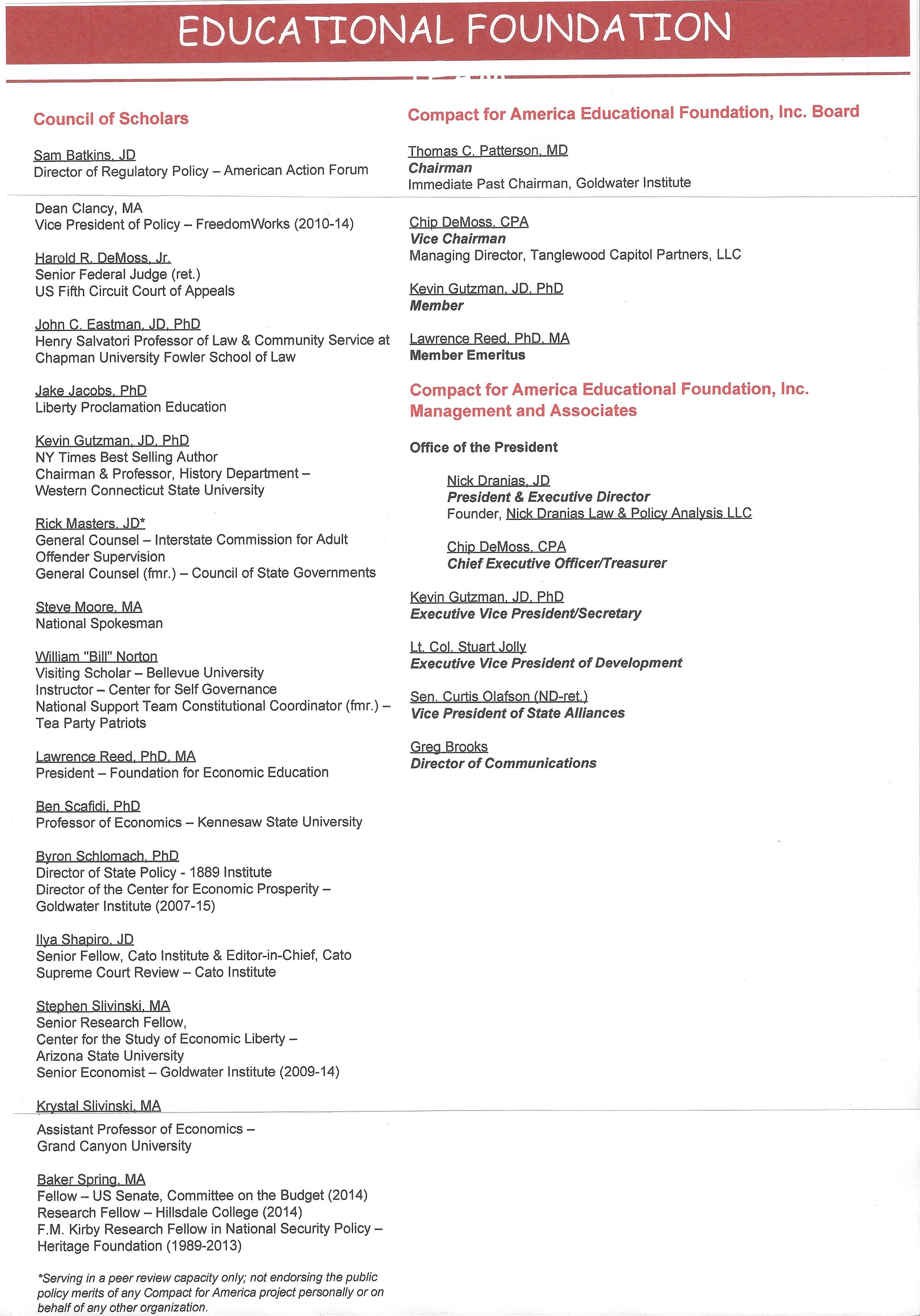 As shown by the screen shot of the Compact for
America Action website (click image left to enlarge), the
statement
made in the financial report relating to technical
affiliation is not entirely accurate. As permitted
under the by-laws of Compact for America Educational Foundation, Inc.
(which, presumably, are also the by-laws for Compact for America
Inc.,(Action) as no other by-laws appear to exist) officers are permitted
to hold several offices simultaneously. The board, management and
advisors of Compact for America Educational Foundation Inc. may be read
by clicking the image right to enlarge.
As shown by the screen shot of the Compact for
America Action website (click image left to enlarge), the
statement
made in the financial report relating to technical
affiliation is not entirely accurate. As permitted
under the by-laws of Compact for America Educational Foundation, Inc.
(which, presumably, are also the by-laws for Compact for America
Inc.,(Action) as no other by-laws appear to exist) officers are permitted
to hold several offices simultaneously. The board, management and
advisors of Compact for America Educational Foundation Inc. may be read
by clicking the image right to enlarge.  The
Compact for America Inc.,(Action) board of
directors
consists of three persons: Chip DeMoss, Nick Dranias and Jeff Utsch.
All three individuals are listed in Section A in the 2014 tax return
of Compact for America Educational Foundation Inc. Section A deals with
Officers,
Directors, Trustees, Key Employees and Highest Compensated Employees of
a tax-exempt organization. The three men are also listed as
either a Director, CEO or Vice President of CFA Educational Foundation.
(Click image left to enlarge).
The
Compact for America Inc.,(Action) board of
directors
consists of three persons: Chip DeMoss, Nick Dranias and Jeff Utsch.
All three individuals are listed in Section A in the 2014 tax return
of Compact for America Educational Foundation Inc. Section A deals with
Officers,
Directors, Trustees, Key Employees and Highest Compensated Employees of
a tax-exempt organization. The three men are also listed as
either a Director, CEO or Vice President of CFA Educational Foundation.
(Click image left to enlarge).Under the Foundation's by-laws members of the Advisory Council for the Foundation and the Council of Scholars for Compact for America Inc.,(Action) are irrelevant. As previously discussed, the board of directors is not required to take advice from either body. In fact, according to the by-laws, the board of directors controls the opinions expressed by the members of these two councils.
The single management officer listed for Compact for America Inc.,(Action) is Chip DeMoss. DeMoss holds three offices--president, secretary and treasurer. The CFA website lists the management officers for Compact for America Educational Foundation Inc., as being held by Chip DeMoss and Nick Dranias. DeMoss is also listed as a Vice Chairman of the board of directors for the Foundation.
Thus, according to the information supplied by Compact for America the day-to-day operations of Compact for America Educational Foundation Inc., and Compact for America Inc.,(Action) appear to be run by the same two people--Chip DeMoss and Nick Dranias.
Management Compensation
The June 29, 2015 and August 16, 2016 independent audit reports discusses the management relationship of Chip DeMoss and Nick Dranias between Compact for America Education Foundation Inc., and Compact for America Inc.,(Action). (See page 9, 2014 report and page 9, 2015 report). The reports state CFA Foundation and CFA (Action) shared a "common director" and single common manager. Instead of paying the individuals directly however the report states payment was made to "entities" which "furnished" the director and manager.
The 2014 audit describes payments made by Compact for America Education Foundation Inc. to an unnamed "entity" which "furnished the [unnamed] executive manger" for the Foundation as well as providing "the same executive manger to CFA-Action." The report states "a different [unnamed] member of the Foundation's executive management also served as a director on the board of CFA-Action." The report states in 2014, "The Foundation incurred management compensation expense in the amount of $24,000 under a service contract to the entity that furnished the executive manager to the Foundation and "provided the same executive manager to CFA-Action." Additionally, the "Foundation incurred management compensation expense in the amount of $20,900 to the entity that furnished the executive manager for the Foundation. This director for CFA-Action served solely as a volunteer for CFA-Action at all times."
The 2015 audit report states $118,000 was paid "to the [unnamed] entity that furnished the [unnamed] executive manager for the Foundation." Additionally the report states "the Foundation incurred management compensation expense of $118,000 to the [unnamed] entity that furnished the [unnamed] executive manger for the Foundation." The 2015 audit report again repeats, "this director for CFA-Action served solely as a volunteer for CFA-Action at all times." The reports describes "service contracts" which purportedly set limitations on these two individuals. However CFA has not provided (and is not legally required to provide) copies of these "service contracts" for public inspection showing what the terms and limitations of these contracts.
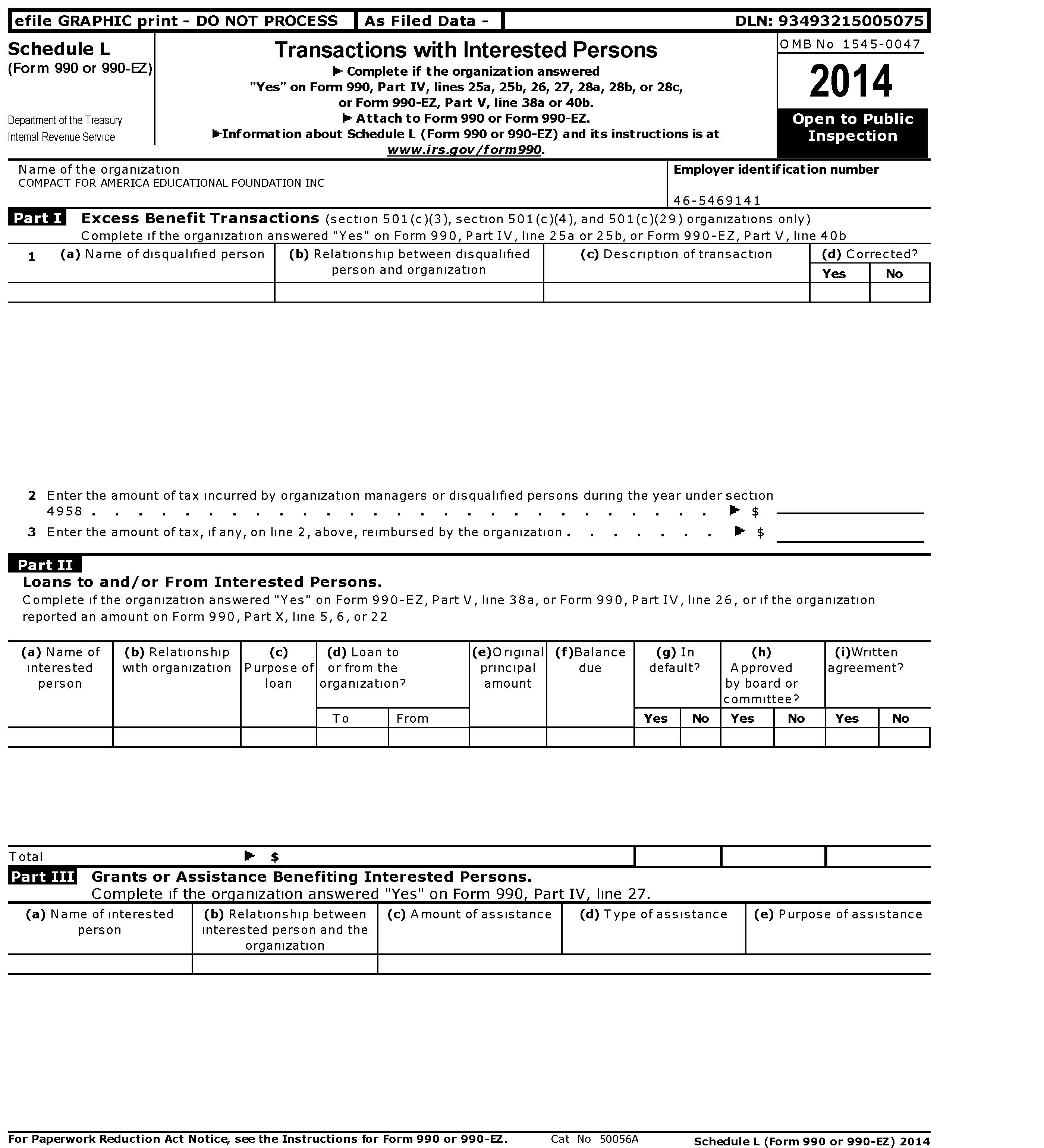
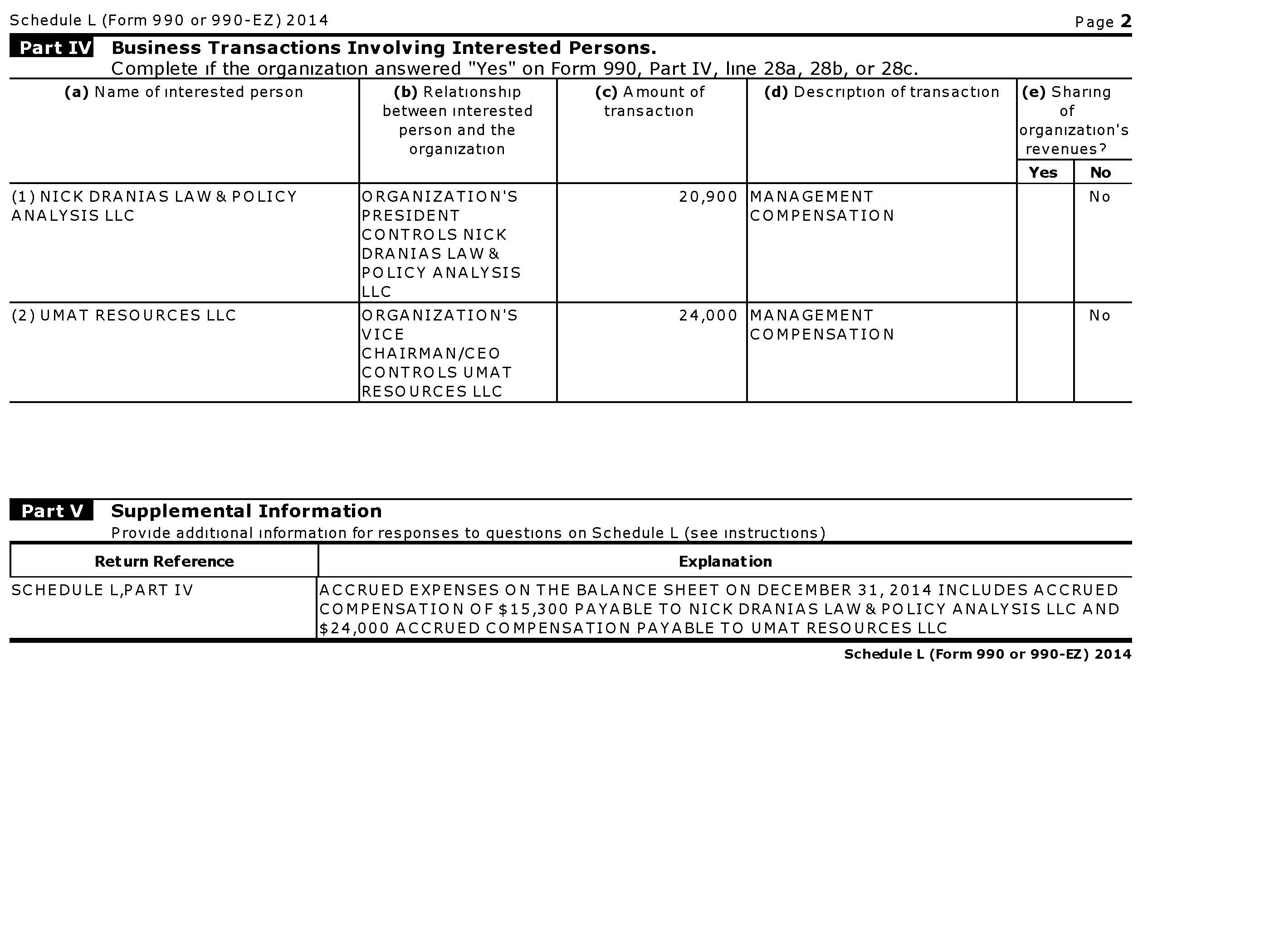 The 2014 and 2015 tax returns of Compact for America
Education Foundation Inc., clarifies matters by identifying the "entities" which provided
the manager and director for CFA(Action) and the specific individuals involved.
According to the 2014 Schedule L Form the firm of
Nick Dranias Law & Policy Analysis LLC received $20,900 (an hourly wage of $10.88) for
"management compensation" (click images left to enlarge). The form states, "Organization's president
controls Nick Dranias Law & Policy Analysis LLC." The 2014 Schedule
L Form also states the
Foundation paid $24,000 in "management compensation" to UMAT Resources
LLC which calculates to an hourly wage of $12.50. UMAT Resources LLC is described as being "controlled by the Foundation's
Vice Chairman/CEO
Harold DeMoss."
The 2014 and 2015 tax returns of Compact for America
Education Foundation Inc., clarifies matters by identifying the "entities" which provided
the manager and director for CFA(Action) and the specific individuals involved.
According to the 2014 Schedule L Form the firm of
Nick Dranias Law & Policy Analysis LLC received $20,900 (an hourly wage of $10.88) for
"management compensation" (click images left to enlarge). The form states, "Organization's president
controls Nick Dranias Law & Policy Analysis LLC." The 2014 Schedule
L Form also states the
Foundation paid $24,000 in "management compensation" to UMAT Resources
LLC which calculates to an hourly wage of $12.50. UMAT Resources LLC is described as being "controlled by the Foundation's
Vice Chairman/CEO
Harold DeMoss." 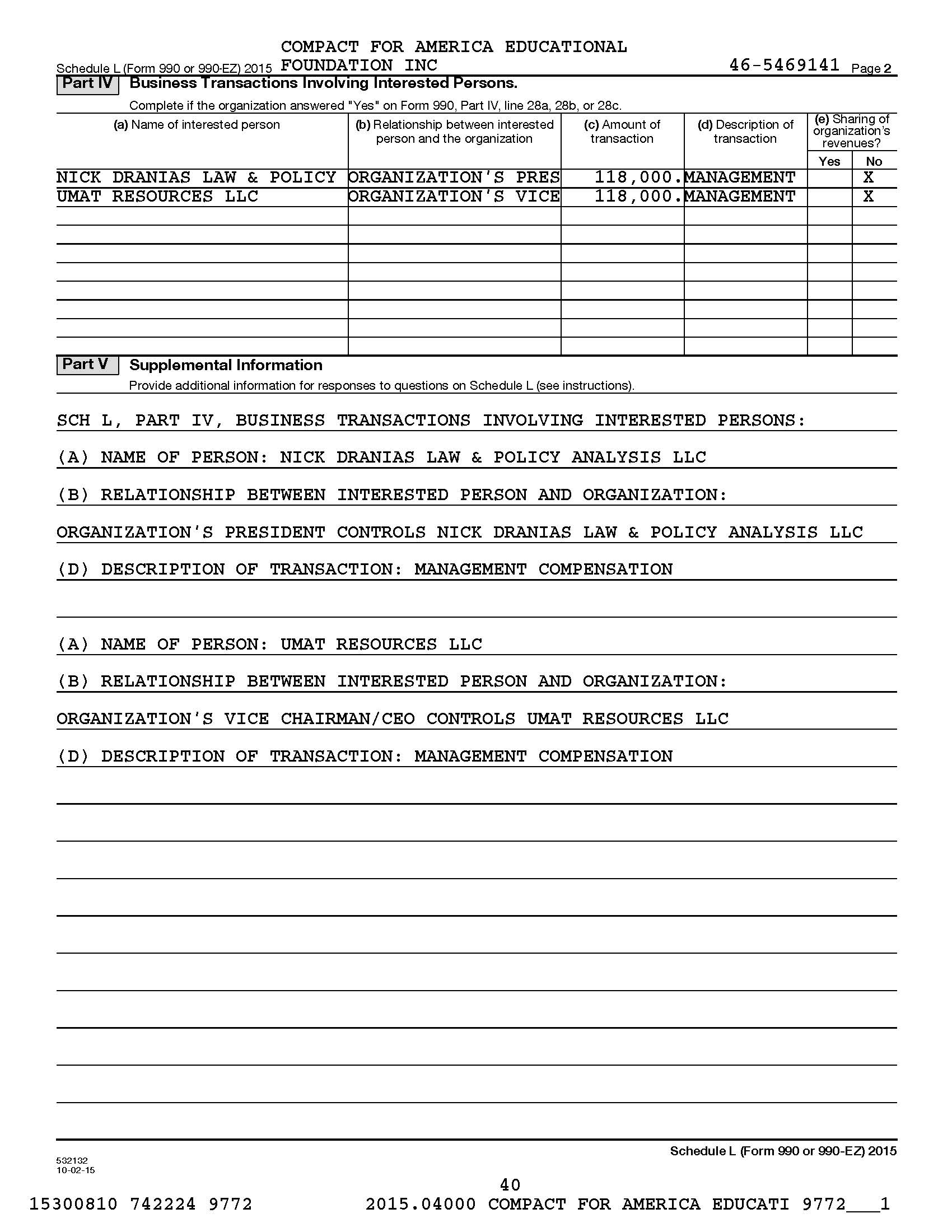
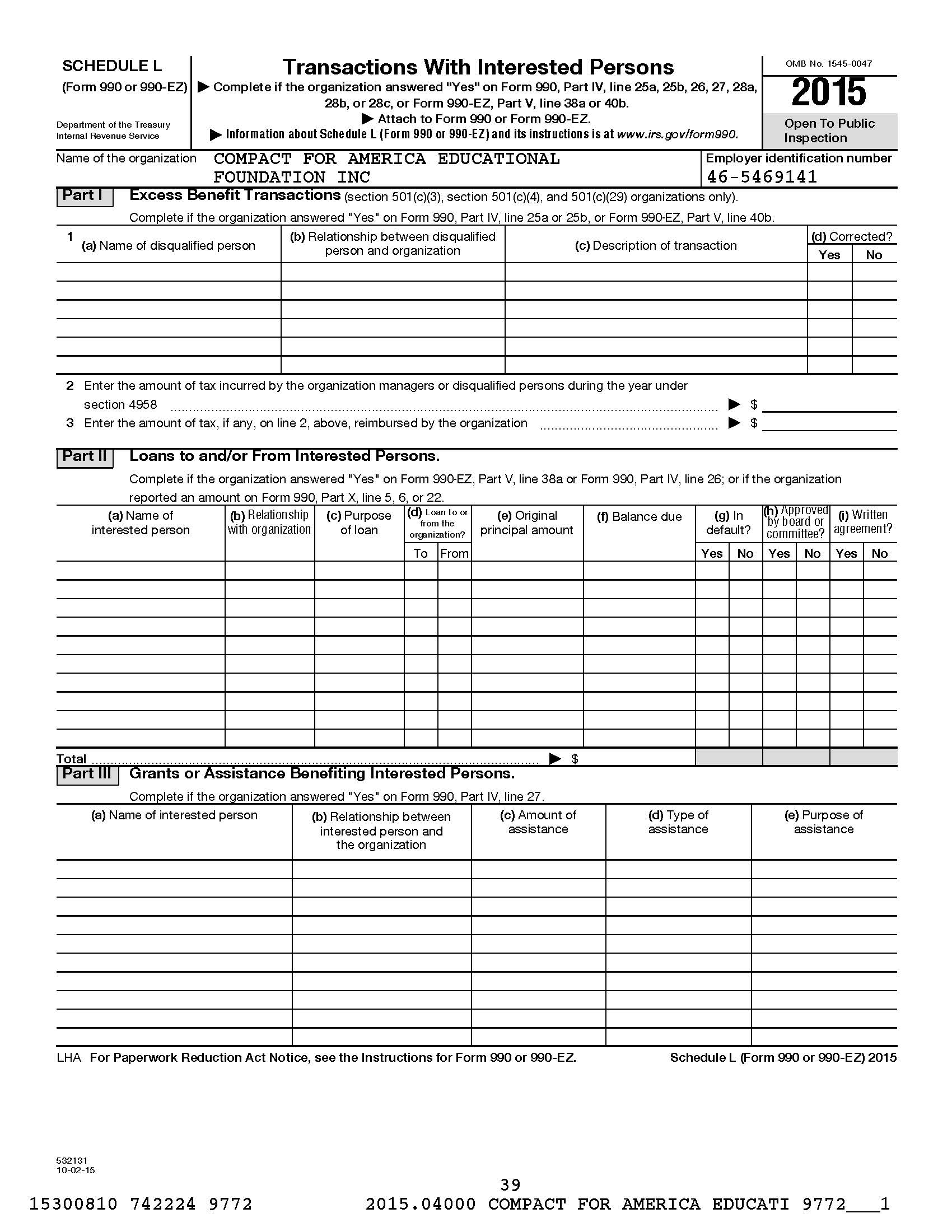 The 2015 Schedule L Form states the same two individuals DeMoss and Dranias received $118,00 each (an hourly wage of $61.45) totally
$236,000 in "management compensation" to manage Compact for America Inc.,(Action) which, according to all information
available, has zero assets, revenue and income. According to the independent audit the $236,000 in "management
compensation" was the single largest expense of Compact for America Educational Foundation Inc.,
amounting to nearly 34% of the total operating expenses ($702,201) of the
Foundation. Compact
for America provides no explanation why the "management
compensation" for an organization having no assets, revenue or income
was increased 392% between 2014 and 2015. CFA has not
explained how such an increase complies with the "reasonable
compensation" rule of its Conflict of Interest policy. CFA has not
provided any survey information required in its policy justifying a
392% increase in "management compensation" of an organization having
zero assets, income and revenue.
The 2015 Schedule L Form states the same two individuals DeMoss and Dranias received $118,00 each (an hourly wage of $61.45) totally
$236,000 in "management compensation" to manage Compact for America Inc.,(Action) which, according to all information
available, has zero assets, revenue and income. According to the independent audit the $236,000 in "management
compensation" was the single largest expense of Compact for America Educational Foundation Inc.,
amounting to nearly 34% of the total operating expenses ($702,201) of the
Foundation. Compact
for America provides no explanation why the "management
compensation" for an organization having no assets, revenue or income
was increased 392% between 2014 and 2015. CFA has not
explained how such an increase complies with the "reasonable
compensation" rule of its Conflict of Interest policy. CFA has not
provided any survey information required in its policy justifying a
392% increase in "management compensation" of an organization having
zero assets, income and revenue. CFA Volunteers?
Unlike most tax-exempt organizations Compact for America Educational Foundation Inc., and Compact for America Inc.,(Action) appear to have no volunteer base. Both 2014 and 2015 CFA tax forms state the number of CFA volunteers as "10."
 Under
normal circumstances whether someone is a volunteer or not has little
bearing on a tax-exempt organization. IRS regulations set limits on
how much lobbying a 501(c)(3) organization may do based on
participation of both paid and volunteer workers. However as Compact for America claims its officers are "public officials" and its "commission" is a governmental body, other federal laws apply. One example is Part 553 Section 553.101 (click image left to enlarge) of the federal Fair Labor Standards Act to Employees of State and Local Governments. The
Internal Revenue Service uses this law to define what is "volunteer"
work by government employees The law defines "volunteer" work by
government employee as being when "an individual who performs hours of
service for a public agency for civic, charitable, or humanitarian
reasons without promise, expectation or receipt of compensation for
services rendered..." The law further directs that "an individual shall
not be considered a volunteer if the individual is otherwise employed
by the same public agency to perform the same type of services as those
for which the individual proposes to volunteer."
Under
normal circumstances whether someone is a volunteer or not has little
bearing on a tax-exempt organization. IRS regulations set limits on
how much lobbying a 501(c)(3) organization may do based on
participation of both paid and volunteer workers. However as Compact for America claims its officers are "public officials" and its "commission" is a governmental body, other federal laws apply. One example is Part 553 Section 553.101 (click image left to enlarge) of the federal Fair Labor Standards Act to Employees of State and Local Governments. The
Internal Revenue Service uses this law to define what is "volunteer"
work by government employees The law defines "volunteer" work by
government employee as being when "an individual who performs hours of
service for a public agency for civic, charitable, or humanitarian
reasons without promise, expectation or receipt of compensation for
services rendered..." The law further directs that "an individual shall
not be considered a volunteer if the individual is otherwise employed
by the same public agency to perform the same type of services as those
for which the individual proposes to volunteer."Both audit reports state a "director for CFA_Action served solely as a volunteer for CFA_Action [despite the fact his law firm was paid $138,900 over two years to provide the director] at all times and did not engage in any executive management of CFA-Action." Despite the assertion of separation of "education" and "influence" by Compact for America, however, facts of public record do not support this. The requirements for causing passage of legislation necessary to bring about the creation of the compact sought by CFA, so far as FOAVC can determine by means of public record, do not allow sufficient separation of function to consider "education" and "influence" separate in the case of Compact of America. Moreover, based on public record, FOAVC has not located any substantial evidence demonstrating that as a "public officials," officers and directors of Compact for America are not performing the same identical functions regardless of whether they represent Compact for America Educational Foundation Inc., or Compact for America Inc.,(Action).
FOAVC asks: if someone is paid approximately $139,000 over a two year period under the terms of a "service" contract to be a "manager" of an organization, how can that individual be construed to be a "volunteer" when a business he wholly owns and in which he is apparently the sole employee, is being paid $139,000 by Compact for America to furnish his services to CFA? FOAVC emphasizes so far as it is aware there is no violation of law in these arrangements. Any such determination of infraction of law would have to be made by the appropriate governmental agency charged with investigation of any complaints alleging a violation of law.
Compact for America Communications Policy
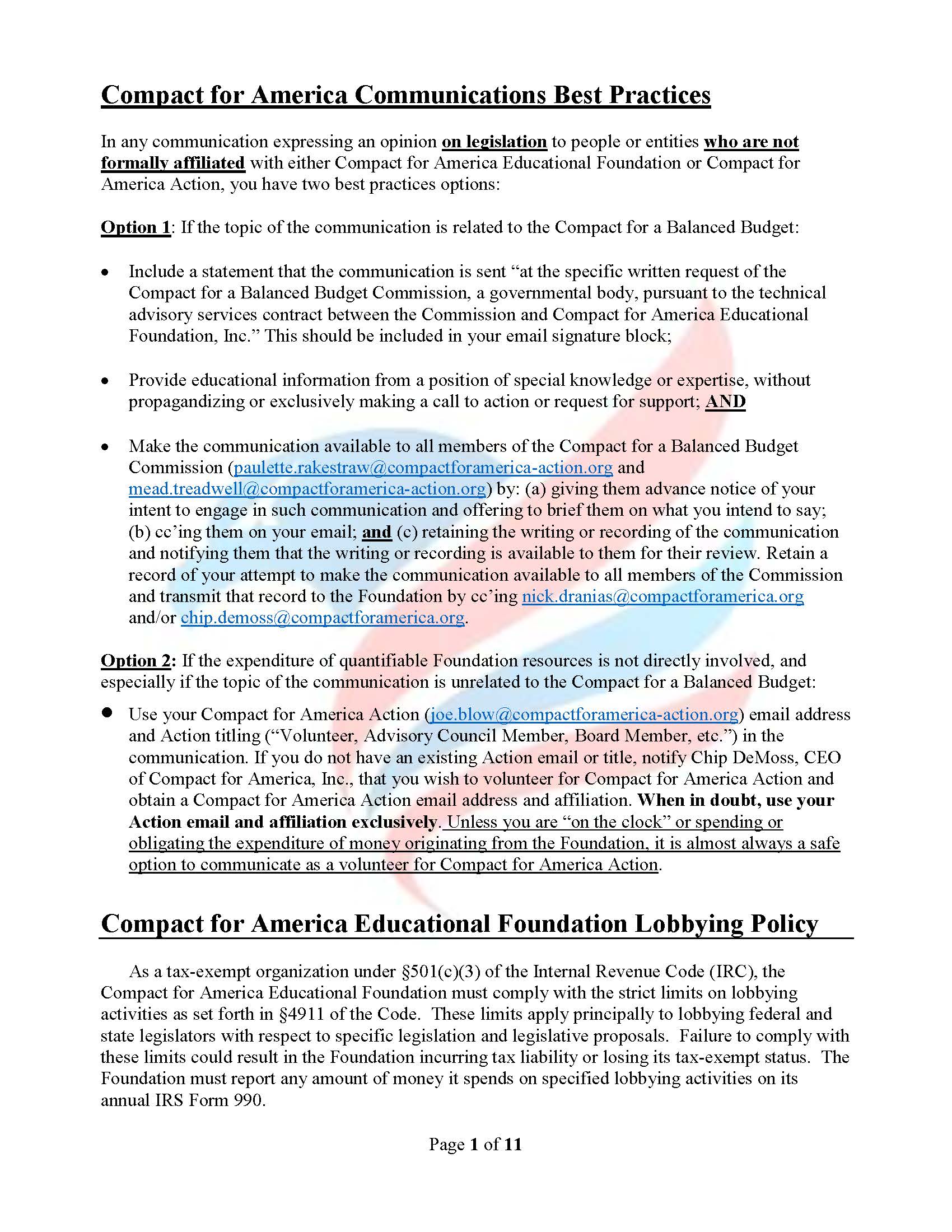
 Compact
for America's Communications Policy which, according to the first
paragraph of the 11 page document, apparently applies to both Compact
for America Educational Foundation and Compact for America
Inc.,(Action) (click image left to enlarge). The document discusses
"two options" which it recommends regarding communications about
legislation (presumably state legislation creating a compact to propose
amendments in a particular state) or "entities who are not formally
affiliated with Compact for America Educational Foundation or Compact
for America Action." (Click image right to enlarge). The report recommends that a "statement that
communication is sent at the specific written request of the Compact
for a Balanced Budget Commission, a governmental body, pursuant to the
technical advisory services contract between the Commission and Compact
for America Educational Foundation, Inc." be included in all communications.
Compact
for America's Communications Policy which, according to the first
paragraph of the 11 page document, apparently applies to both Compact
for America Educational Foundation and Compact for America
Inc.,(Action) (click image left to enlarge). The document discusses
"two options" which it recommends regarding communications about
legislation (presumably state legislation creating a compact to propose
amendments in a particular state) or "entities who are not formally
affiliated with Compact for America Educational Foundation or Compact
for America Action." (Click image right to enlarge). The report recommends that a "statement that
communication is sent at the specific written request of the Compact
for a Balanced Budget Commission, a governmental body, pursuant to the
technical advisory services contract between the Commission and Compact
for America Educational Foundation, Inc." be included in all communications.
 Compact for America Educational
Foundation Inc., places a great deal of reliance on the proposition
expressed on Page 2 (click on image left to enlarge) and Page 3 (click
on image right to enlarge) of its Communications Policy that because of
the "technical services" contract between it and the Compact for a
Balanced Budget Commission, "most of the activities the Foundation
currently engages in are not considered lobbying under federal tax law."
Compact for America Educational
Foundation Inc., places a great deal of reliance on the proposition
expressed on Page 2 (click on image left to enlarge) and Page 3 (click
on image right to enlarge) of its Communications Policy that because of
the "technical services" contract between it and the Compact for a
Balanced Budget Commission, "most of the activities the Foundation
currently engages in are not considered lobbying under federal tax law."
The CFA statement states "because, as of January 13, 2015, the Compact for a Balanced Budget Commission, a governmental body, retained and requested the Foundation in writing and by way of a technical services contract to provide technical advice and assistance in (a) formulating and transmitting and assisting the Compact Commission members in formulating and transmitting nonpartisan communications, which offer educational policy analysis, technical advice and expert testimony concerning the Compact for a Balanced Budget, to Congress, Members States and non-member States; (b) assisting the Compact Commission members in encouraging states to join the Compact for a Balanced Budget and Congress to call the Convention in accordance with this Compact; and (c) assisting the Compact Commission members in cooperating with any entity that shares a common interest with the Compact Commission and engages in policy research, public interest litigation or lobbying in support of the purposes of the Compact."
The Commission's "technical service" agreement with Compact for America Foundation, which refers to the Commission as a "multi-state agency" took effect on January 15, 2015. The agreement was later amended on July 31, 2015. The agreement requires the Foundation to "serve as interim Compact Administrator", "educate" various state and federal officials and others on the compact and its various aspects, "provide expert testimony before state legislative and congressional committees", "maintain the books and records of the Commission", "maintain a bank trust account for funds received" and "develop and maintain the Commission Internet website." In sum, for all practical purposes, the operations of the Commission were turned over to Compact for America Foundation.
The Communications Policy then states "such advice and assistance falls within the specific exemption from the definition of lobbying for preparation work and communications stemming from written requests from a governmental body for technical advice and assistance, specifically 26 C.F.R. § 56.4911-2(c)(3) and 53.4945-2(d)(2)." The policy then continues, "However [emphasis in original] to ensure that a communication or activity qualifies for this exception: (1) the subject matter must relate to the Compact Administrator's and Compact Commission's statutory and contractual duties in connection with the Compact for a Balanced Budget; (2) subject matter must reflect the Foundation's special knowledge or skill in a relevant area, it cannot be a naked request for sponsorship, a call to action without any analysis or grounding in apparent or actual expertise, or a pure rally of support or opposition without any education component stemming from the Foundation's expertise; [emphasis in original] and (3) the communication must be retained and made available to all members of the Compact for a Balanced Budget Commission." [emphasis in original].
The reliance of this form of indemnification, repeatedly expressed in the Compact for America documents, is anchored in the proposition the Compact for a Balanced Budget Commission is in all respects a "governmental body." If the Commission is not a "governmental body," that is, it does not qualify as a "governmental body" under law, then the entire premise of "immunity" for the actions of Compact for America Educational Foundation Inc., and all other groups associated with Compact for America falls to the ground. Further, if the Commission is not a "governmental body," any "technical services contract" between it and any party is voided as a contract between a "governmental body" and that party. The contract may still exist as an agreement between two private parties but any immunities or other authority alluded to it under the premise of it being made by a "governmental body" do not exist because the "governmental body" does not exist. Thus any action taken by any party under such "contract" would be judged, not by the terms of the "contract" and its purported immunity being made with a "governmental body" but under the terms and condition of appropriate law of a contract made between two private parties.
The document briefly discusses various state and federal laws to which Compact for America must "comply." These include 501(c)(3) regulations "set form in §4911 of the [IRS] Code." Also mentioned is compliance with the "federal Lobbying Disclosure Act (LDA) and "state law lobbying restrictions...with respect to is lobbying in Arizona and other states." Despite these statements, Compact for America Educational Foundation states, "the Foundation and its officers are serving as public officials at the direction of the Compact for a Balanced Budget Commission and therefore exempt from lobbying registration under most state laws." [Emphasis added].
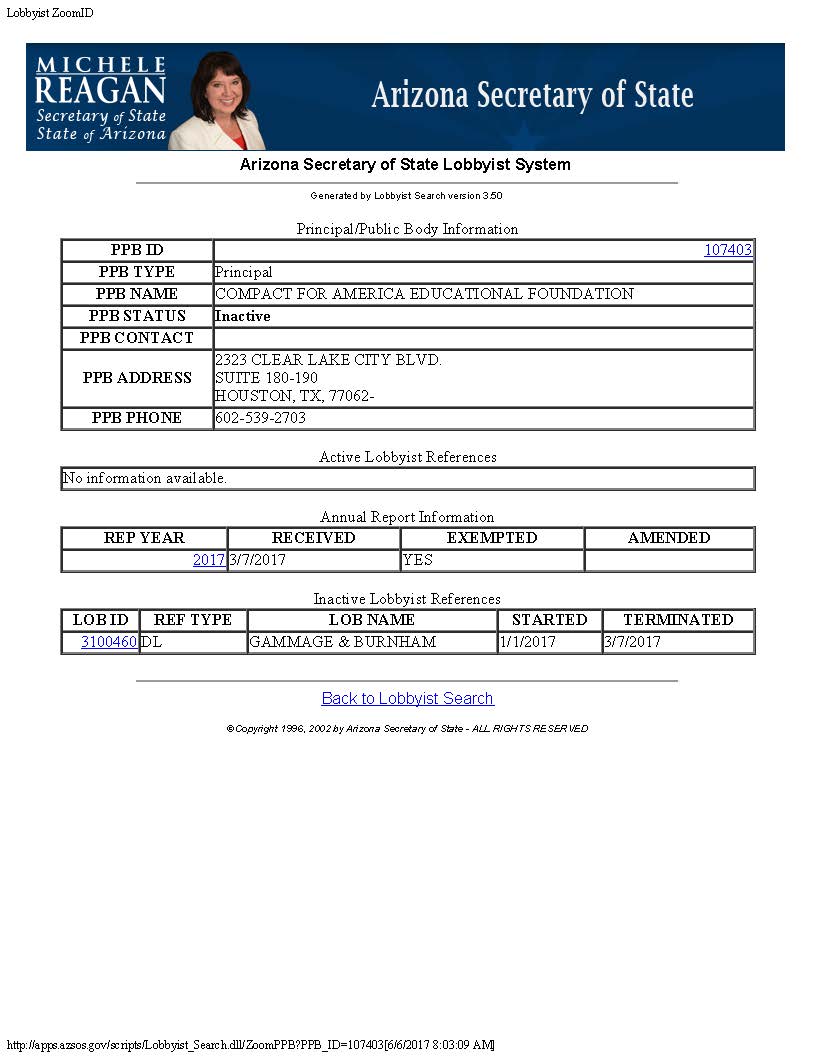 As stated on its website
the LDA has little effect on any lobbying performed by Compact for
America as it primarily addresses lobbying by professional lobbying
organizations hired by individuals or corporations lobbying Congress.
Because it is required under the terms of the Constitution however, passage of a federal law authorizing the
compact is required. This implies some form of federal
lobbying by CFA to bring about this legislation. Despite the caution
regarding the LDA in the Compact for America Communications Practices Policy, FOAVC is unable to locate any record of filing by
Compact for America or any of its officers as lobbyists as required by
LDA. Compact for America Educational Foundation Inc., is registered
(currently inactive) as a lobbying organization in the state of
Arizona. There is no record of Compact for America Inc.,(Action) being
registered as a lobbying organization in the state of Arizona nor with
LDA.
As stated on its website
the LDA has little effect on any lobbying performed by Compact for
America as it primarily addresses lobbying by professional lobbying
organizations hired by individuals or corporations lobbying Congress.
Because it is required under the terms of the Constitution however, passage of a federal law authorizing the
compact is required. This implies some form of federal
lobbying by CFA to bring about this legislation. Despite the caution
regarding the LDA in the Compact for America Communications Practices Policy, FOAVC is unable to locate any record of filing by
Compact for America or any of its officers as lobbyists as required by
LDA. Compact for America Educational Foundation Inc., is registered
(currently inactive) as a lobbying organization in the state of
Arizona. There is no record of Compact for America Inc.,(Action) being
registered as a lobbying organization in the state of Arizona nor with
LDA. The Compact for a Balanced Budget Commission
Investigation by FOAVC has revealed the financial records of Compact for America Educational Foundation Inc., and the Compact for a Balanced Budget Commission are inextricably linked. It is impossible to fully discuss the financial records of Compact for America without also discussing the Compact for a Balanced Budget Commission. In order to present a complete picture of the financial relationship between these two operations therefore, FOAVC will present information found on the Compact for a Balanced Budget Commission website as it continues its analysis of the financial records of Compact for America Inc.
The financial records shows a clear financial relationship between Compact for America Educational Foundation Inc., a 501(c)(3) tax-exempt organization and the Balanced Budget Commission but no such similar financial relationship between Compact for America Inc.,(Action) a purported 501(c)(4) tax-exempt organization and the Commission. Therefore all actions taken, so far as federal tax law is concerned, must be judged on the laws associated with a 501(c)(3) tax-exempt organization.
Compact for America claims the Compact for a Balanced Budget Commission is a "governmental body" that is an "interstate agency." In normal circumstances an "interstate agency" has relevant state and federal laws associated it making it "interstate." However FOAVC has been unable to find any federal law incorporating the Commission as an "interstate" agency. The only state law FOAVC has been able to uncover is the Compact for a Balanced Budget itself. Without federal law authorizing the Commission as an "interstate" agency it is impossible for the Commission to be an actual "interstate" agency. For the compact (and thus the Commission) to have actual legal authority as an "interstate agency" the Constitution demands the compact creating the "interstate agency" be approved by Congress. This has not occurred. Five states have approved the compact but this fact alone does not make the Commission an "interstate agency" as defined by the Constitution.
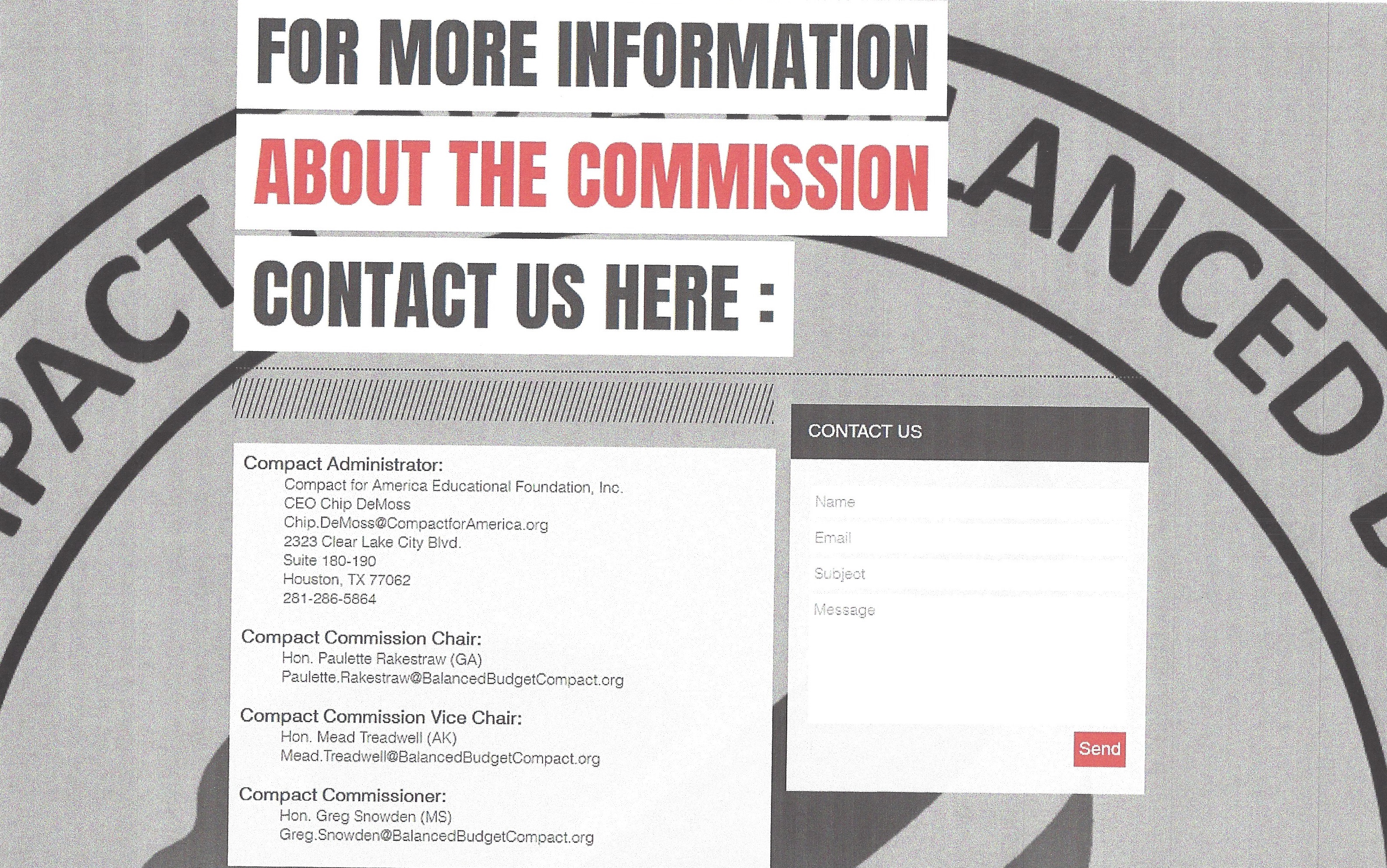 Other
facts do not support the "Commission" as an actual
"interstate" governmental agency as claimed by Compact for America. As an "interstate" governmental agency it is reasonable
to expect a certain level of professional business performance as is
typical with all governmental agencies including "interstate" agencies. The Commission
lists its address as 2323 Clear Lake City
Blvd., Suite 180-190, Houston, TX 77062. It lists its phone number of
281-286-5864 (click image left to enlarge). FOAVC called the "business
" number of the Commission during the regular work week and during what
is
normally considered regular business hours (8 a.m. to 5 p.m.). Instead
of a person answering the phone, FOAVC reached what appears to be a
private message machine. The machine's message
identified itself as "Jeff"
followed by
an apology that "Jeff and Jan could not get to the phone." No mention
of the phone number being the official office phone for the Compact for
a Balanced Budget Commission was made in the message. Assuming the
phone number is accurate it appears to be the phone number for a
private residence rather than the official office phone of an
"interstate agency" known as the Compact for a Balanced Budget
Commission. Unlike other "interstate" agencies the Commission
does not appear to have regular office
hours as none are posted
on the Commission website.
Other
facts do not support the "Commission" as an actual
"interstate" governmental agency as claimed by Compact for America. As an "interstate" governmental agency it is reasonable
to expect a certain level of professional business performance as is
typical with all governmental agencies including "interstate" agencies. The Commission
lists its address as 2323 Clear Lake City
Blvd., Suite 180-190, Houston, TX 77062. It lists its phone number of
281-286-5864 (click image left to enlarge). FOAVC called the "business
" number of the Commission during the regular work week and during what
is
normally considered regular business hours (8 a.m. to 5 p.m.). Instead
of a person answering the phone, FOAVC reached what appears to be a
private message machine. The machine's message
identified itself as "Jeff"
followed by
an apology that "Jeff and Jan could not get to the phone." No mention
of the phone number being the official office phone for the Compact for
a Balanced Budget Commission was made in the message. Assuming the
phone number is accurate it appears to be the phone number for a
private residence rather than the official office phone of an
"interstate agency" known as the Compact for a Balanced Budget
Commission. Unlike other "interstate" agencies the Commission
does not appear to have regular office
hours as none are posted
on the Commission website. As discussed above, the address 2323 Clear Lake City Blvd., Suite 180-190, Houston, TX 77062 is a UPS Mailing Box used
by Compact for America Educational Foundation Inc., and Compact for
America Inc.,(Action). The Clear Lake City Blvd., address is confirmed
by the 2015 Income Tax Form of Compact for America Educational
Foundation Inc., which, according to the form, provided several grants
to the Commission for a Balanced Budget (click image right to enlarge).
FOAVC believes it highly unlikely the physical location of the office of
the Compact for a Balanced Budget Commission, an "interstate
governmental" agency to be that of a UPS Mailing Box meaning Commission
meetings are held either inside of, or next to, a UPS Mailing Box.
Reasonable deduction concludes
the actual physical location of the office of the Compact for a Balanced
Budget Commission is "2710
Ivy Dell Ct.,
Houston, TX 77059-3568, a single family
residence occupied by "J....Gott" and "H...DeMoss" together with
several family members." It is therefore quite likely the "office" of
the Commission is, in fact, nothing more than another file inside the
filing cabinet containing the files of Compact for America Educational
Foundation Inc., and Compact for America Inc.,(Action).
As discussed above, the address 2323 Clear Lake City Blvd., Suite 180-190, Houston, TX 77062 is a UPS Mailing Box used
by Compact for America Educational Foundation Inc., and Compact for
America Inc.,(Action). The Clear Lake City Blvd., address is confirmed
by the 2015 Income Tax Form of Compact for America Educational
Foundation Inc., which, according to the form, provided several grants
to the Commission for a Balanced Budget (click image right to enlarge).
FOAVC believes it highly unlikely the physical location of the office of
the Compact for a Balanced Budget Commission, an "interstate
governmental" agency to be that of a UPS Mailing Box meaning Commission
meetings are held either inside of, or next to, a UPS Mailing Box.
Reasonable deduction concludes
the actual physical location of the office of the Compact for a Balanced
Budget Commission is "2710
Ivy Dell Ct.,
Houston, TX 77059-3568, a single family
residence occupied by "J....Gott" and "H...DeMoss" together with
several family members." It is therefore quite likely the "office" of
the Commission is, in fact, nothing more than another file inside the
filing cabinet containing the files of Compact for America Educational
Foundation Inc., and Compact for America Inc.,(Action).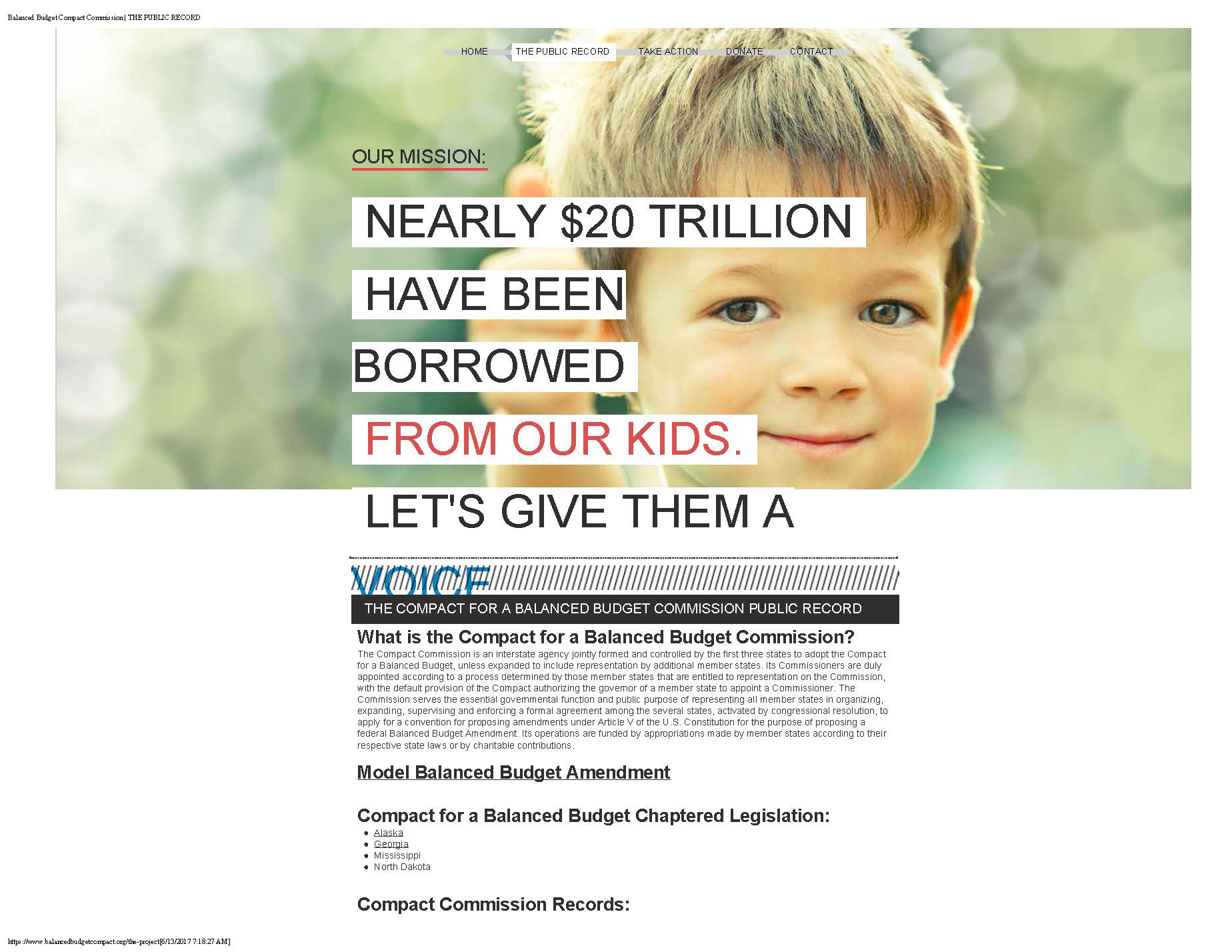
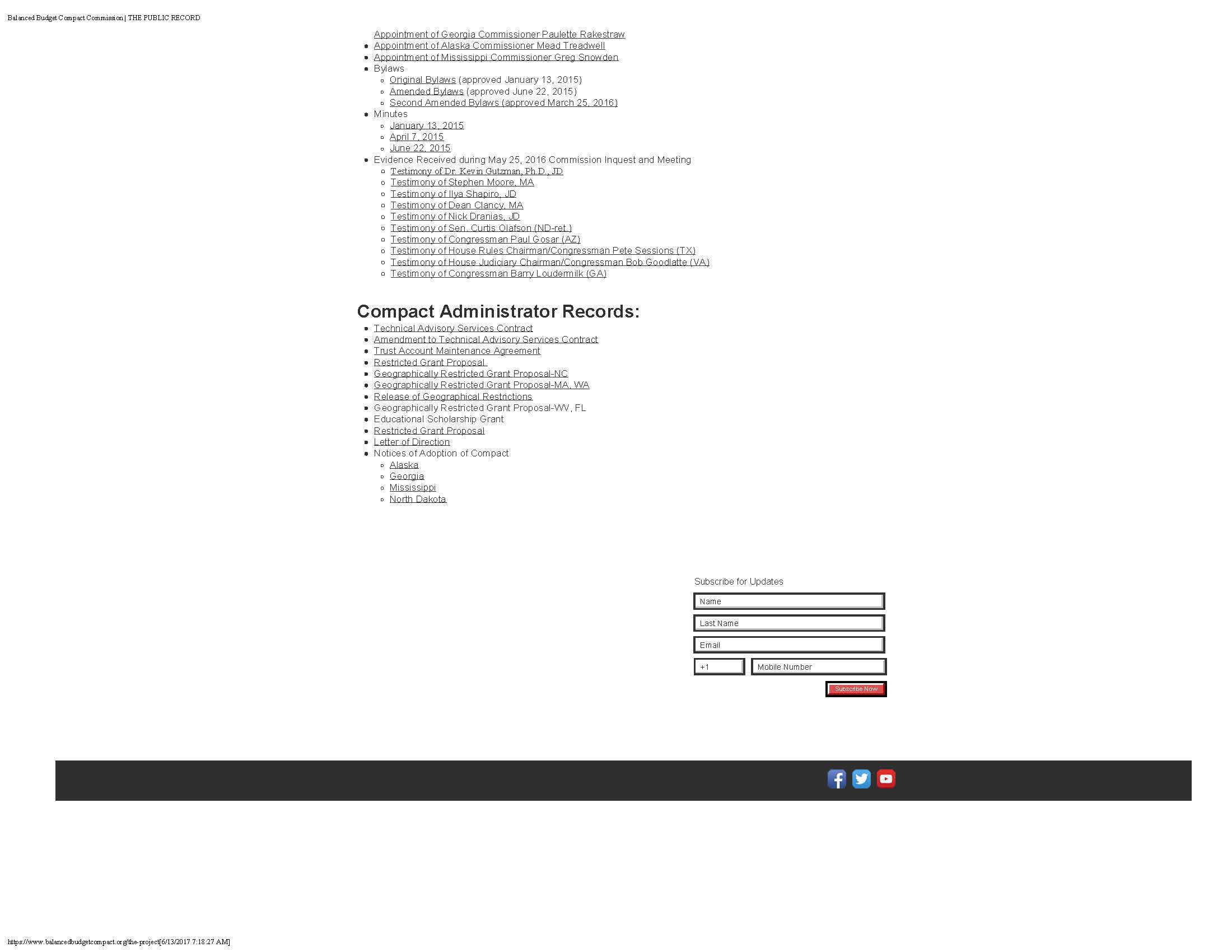 There are other issues regarding the Commission being an actual "interstate" agency. The
Balanced Budget Commission website does not update its
information in a timely fashion as is typical for most "interstate"
agencies. For
example, until mid June, 2017 the site contained no update of information noting the addition of another state
(Arizona) as a member of the compact or the Commission. Despite the
fact the state of Arizona joined the compact in March, 2017, the site only listed four member states
(click images left to enlarge). FOAVC
believes such lapses as this prove information on the Commission site as
unreliable, inaccurate and incomplete thus making it useless for purposes of
public record.
There are other issues regarding the Commission being an actual "interstate" agency. The
Balanced Budget Commission website does not update its
information in a timely fashion as is typical for most "interstate"
agencies. For
example, until mid June, 2017 the site contained no update of information noting the addition of another state
(Arizona) as a member of the compact or the Commission. Despite the
fact the state of Arizona joined the compact in March, 2017, the site only listed four member states
(click images left to enlarge). FOAVC
believes such lapses as this prove information on the Commission site as
unreliable, inaccurate and incomplete thus making it useless for purposes of
public record. Commission By-Laws
Since its inception on January 13, 2015, the Compact for a Balanced Budget Commission has operated under three sets of by-laws. "Meeting minutes" (discussed below) show the Commission ratified its first set of by-laws on January 13, 2015, amended those by-laws on June 22, 2015 and again on March 25, 2016. Unless otherwise stated, in discussing the Commission by-laws, FOAVC will be referring to the latest by-laws and will give the page number of that by-law as reference as required.
The Commission and Texas Law
The evidence uncovered by FOAVC showing the address of the Commission as a UPS Mailing Box (listed on the Commission website and confirmed in the 2015 Compact for America Educational Foundation Inc., income tax form) prove the Commission is located in the State of Texas. While it must be surmised the actual physical location of the Commission (its place of business) is a private residence, never the less, all evidence proves CFA is located in the state of Texas. The Commission, (and the compact) are therefore subject to the jurisdiction and laws of the state of Texas.
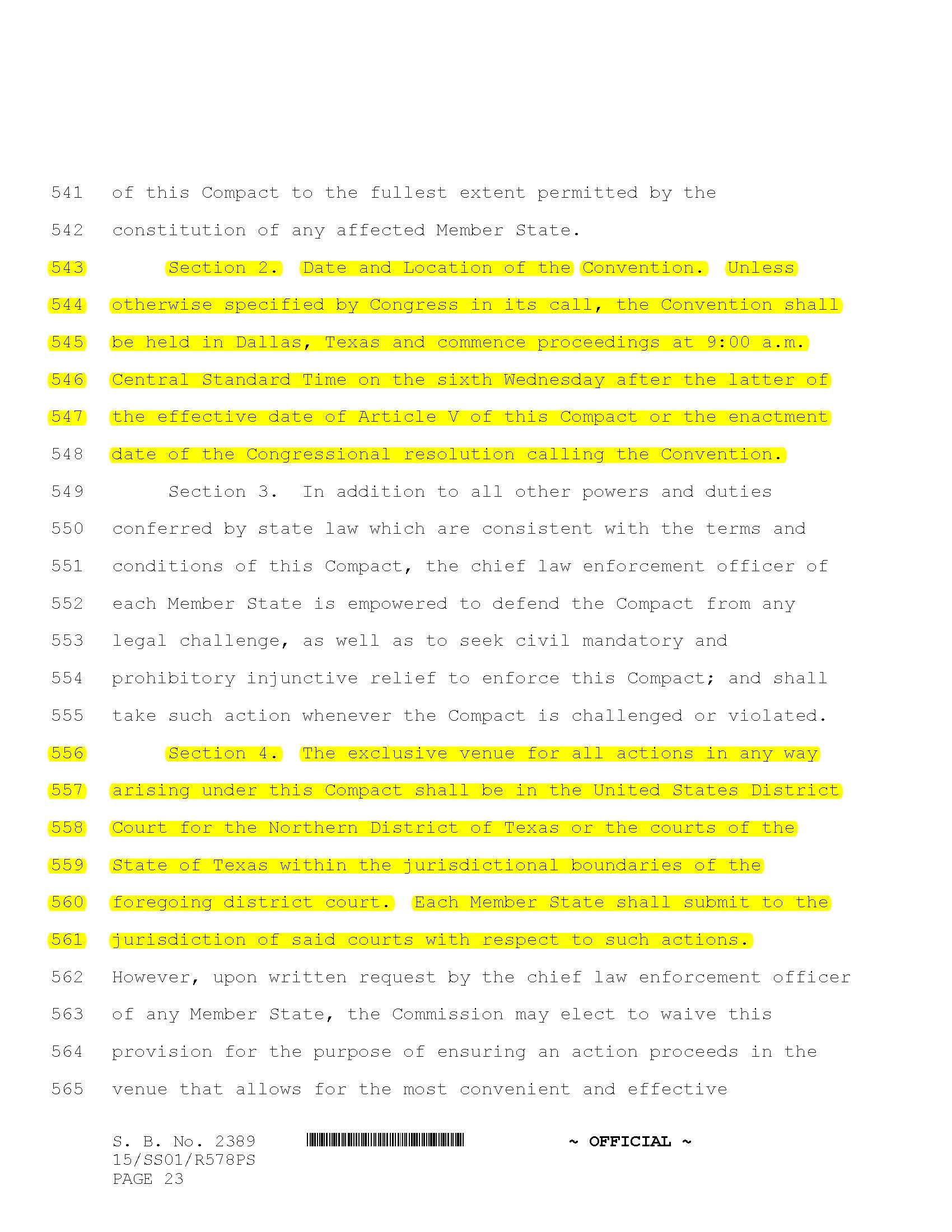 The language of the Compact for a Balanced Budget affirms this. The compact states, "Unless otherwise specified
by Congress in
its call, the Convention shall be held in Dallas, Texas..." The compact
further states, "The exclusive venue for all actions in any arising
under this Compact shall be in the United States District Court for the
Northern District of Texas or
the courts of the State of Texas within the jurisdictional boundaries of
the foregoing district court. Each member state shall submit to the
jurisdiction of said courts with respect to said actions." [Emphasis added]
(click image
left to enlarge). Whether the compact, which has yet to be approved by
Congress, can dictate which federal and state courts have jurisdiction,
is a question open for debate. What is undebatable is the Commission is located in the state of Texas and therefore subject
to that state's laws.
The language of the Compact for a Balanced Budget affirms this. The compact states, "Unless otherwise specified
by Congress in
its call, the Convention shall be held in Dallas, Texas..." The compact
further states, "The exclusive venue for all actions in any arising
under this Compact shall be in the United States District Court for the
Northern District of Texas or
the courts of the State of Texas within the jurisdictional boundaries of
the foregoing district court. Each member state shall submit to the
jurisdiction of said courts with respect to said actions." [Emphasis added]
(click image
left to enlarge). Whether the compact, which has yet to be approved by
Congress, can dictate which federal and state courts have jurisdiction,
is a question open for debate. What is undebatable is the Commission is located in the state of Texas and therefore subject
to that state's laws.Thus, according to all information, the laws of the state of Texas are the ruling authority for the Compact for a Balanced Budget Commission. The compact specifies Texas court jurisdiction (and thus Texas law) and the Commission is physically located in the state of Texas. Despite the compact asserting federal jurisdiction, at present federal courts have no jurisdiction thus leaving only state jurisdiction as the ruling authority. This is because under the rules of the federal court system until the compact is enacted by Congress it has no force of federal law and therefore is not subject to federal court jurisdiction. As the federal court lacks jurisdiction, the text of the compact notwithstanding, any action brought in federal court would be dismissed for lack standing. In fact, as the Supreme Court has ruled that states must first obtain expressed consent from Congress to form a compact which, in this case, has not been done, it is reasonable to state the compact has no legal federal force whatsoever.
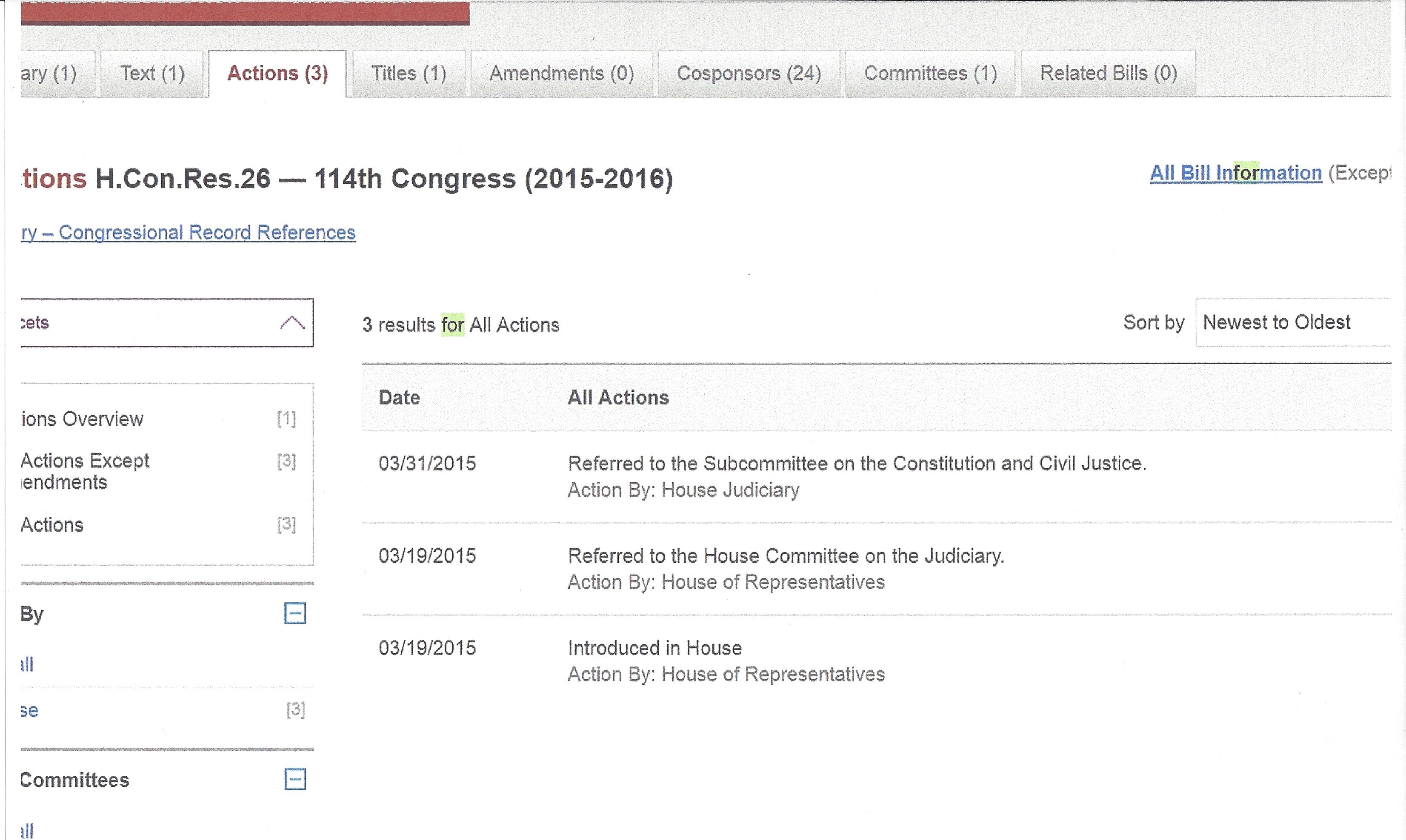 Passage of a federal law approving the compact has made little headway in Congress. H. Con. Res. 26, proposed
in 2015, remained in House Committee throughout that session of
Congress (click image left to enlarge). On July 26, 2017 Congressman Luke Messer (R-In), and four co-sponsors, introduced H. Con. Res. 73 to effectuate the Compact for a Balanced Budget.
Passage of a federal law approving the compact has made little headway in Congress. H. Con. Res. 26, proposed
in 2015, remained in House Committee throughout that session of
Congress (click image left to enlarge). On July 26, 2017 Congressman Luke Messer (R-In), and four co-sponsors, introduced H. Con. Res. 73 to effectuate the Compact for a Balanced Budget. Equally important is the fact the text of the compact cannot be altered by Compact for America without having to terminate the compact in all states which have "joined" as well as terminating the Commission itself and start the process all over again. The compact contains no amendment clause allowing its text to be amended by the state legislatures or Compact for America once it has been enacted by that state. This is not peculiar to this compact. The principles of compact law as well as the terms of the Constitution do not allow for amendment of the compact once it has been agreed to by a state unless that state consents to the amendment and the amendment is subsequently approved by Congress. Thus, to amend the language of the compact requires Compact for America have all member state legislatures first terminate the present compact then reenact a new compact in its place. Such action provides compact opponents the opportunity to defeat the measure. Politically this could end Compact for America. It is possible the states might not reenact the compact if given the opportunity. Thus, for all practical purposes Compact for America is "locked in" with the current language of the compact establishing a single state jurisdiction as the ruling authority of the compact irrespective of whether or not that state is a member of the compact. All signing states have therefore agreed: the compact is subject to the laws of Texas.
The compact contains language allowing the Commission to ignore the provisions of venue (jurisdiction) specified in the compact upon request of chief law enforcement officer of one of the member states, meaning the attorney general of the state. Whether a state AG would agree to allow the Commission to escape prosecution in another state's jurisdiction by allowing the Commission change venues and whether such a decision has any legal validity whatsoever, is an open question. In effect the clause, if valid, allows for the Commission, for example, to violate local Texas law then, at its choosing, simply decline to be prosecuted for those violations by declaring it has elected to change court venues. Whether the Commission has authority to do this would be for the Texas courts to decide however, not the Commission nor even the member states. Until the compact is approved by Congress (and reviewed by the courts) many of its provisions have no legal effect, are currently inoperative or legally questionable. While the compact refers to sections of the Constitution as a basis for changing venues, the text ignores other constitutional provisions allowing for a state, such as the state of Texas, to exercise its right of extradition and thus reestablish venue in a court of its choosing.
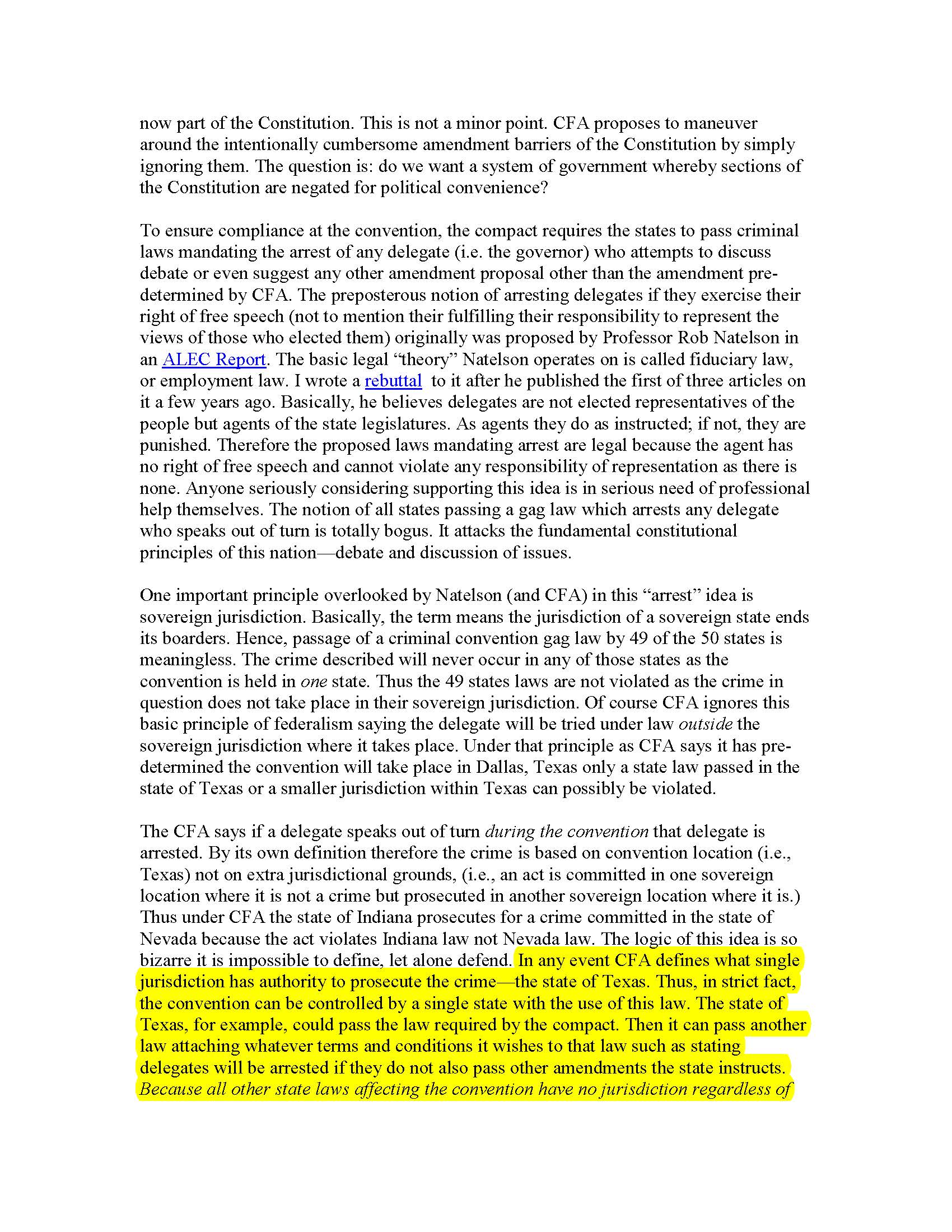
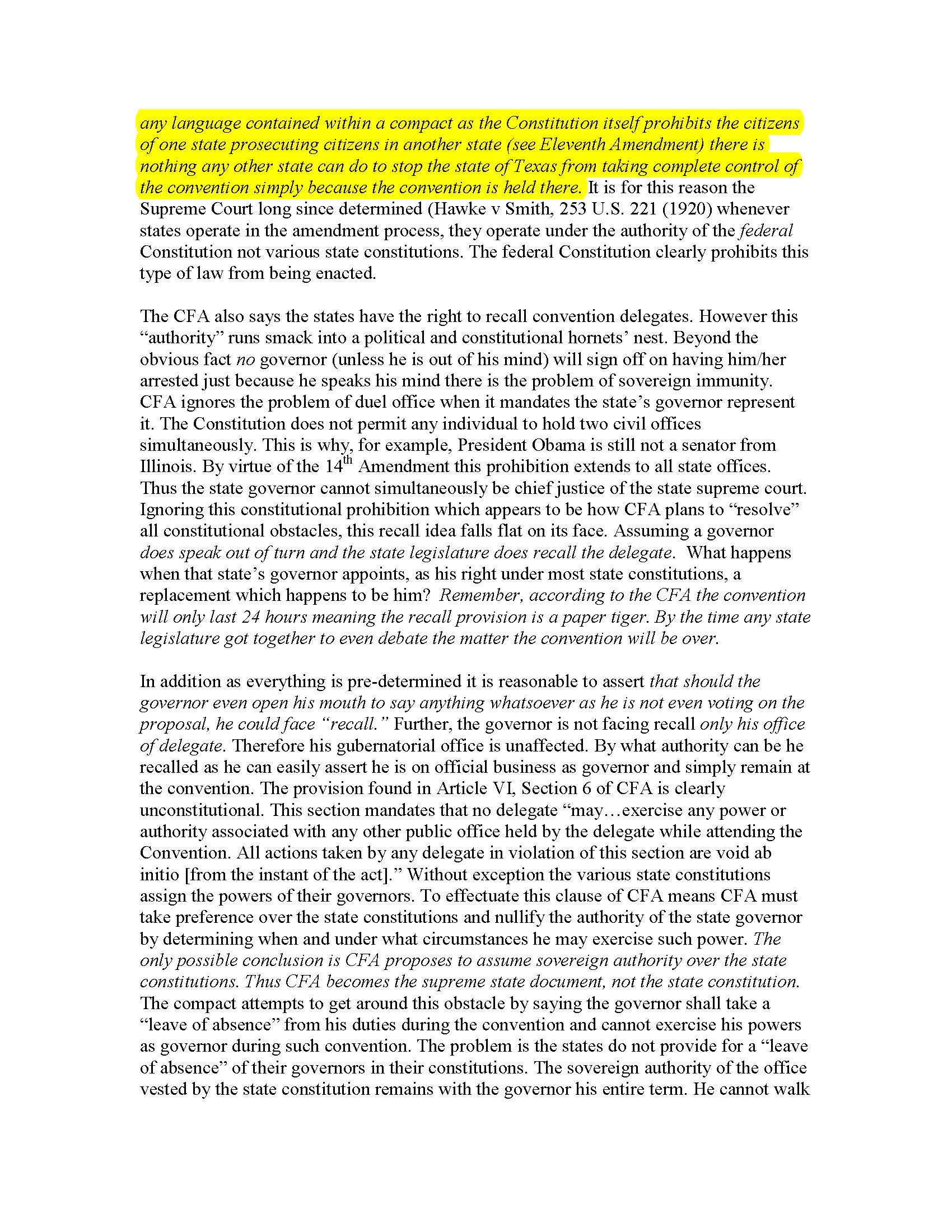 FOAVC has expressed concerns
in the past
that one danger of
this compact is the compact can end up being controlled by a single
state
jurisdiction
even if the state is not part of the compact (click on images left to
enlarge). Proof of this is demonstrated by discussing the effect of current
Texas law
on the Compact for a Balanced Budget Commission and Compact for
America. In creating its compact and subjecting that compact to control by a single state
jurisdiction (no doubt for political reasons), Compact for America ignored a fundamental legal fact: that all state law
of that jurisdiction applies to the Compact for a Balanced Budget
Commission and Compact for
America not just those laws CFA expects would apply.
FOAVC has expressed concerns
in the past
that one danger of
this compact is the compact can end up being controlled by a single
state
jurisdiction
even if the state is not part of the compact (click on images left to
enlarge). Proof of this is demonstrated by discussing the effect of current
Texas law
on the Compact for a Balanced Budget Commission and Compact for
America. In creating its compact and subjecting that compact to control by a single state
jurisdiction (no doubt for political reasons), Compact for America ignored a fundamental legal fact: that all state law
of that jurisdiction applies to the Compact for a Balanced Budget
Commission and Compact for
America not just those laws CFA expects would apply. 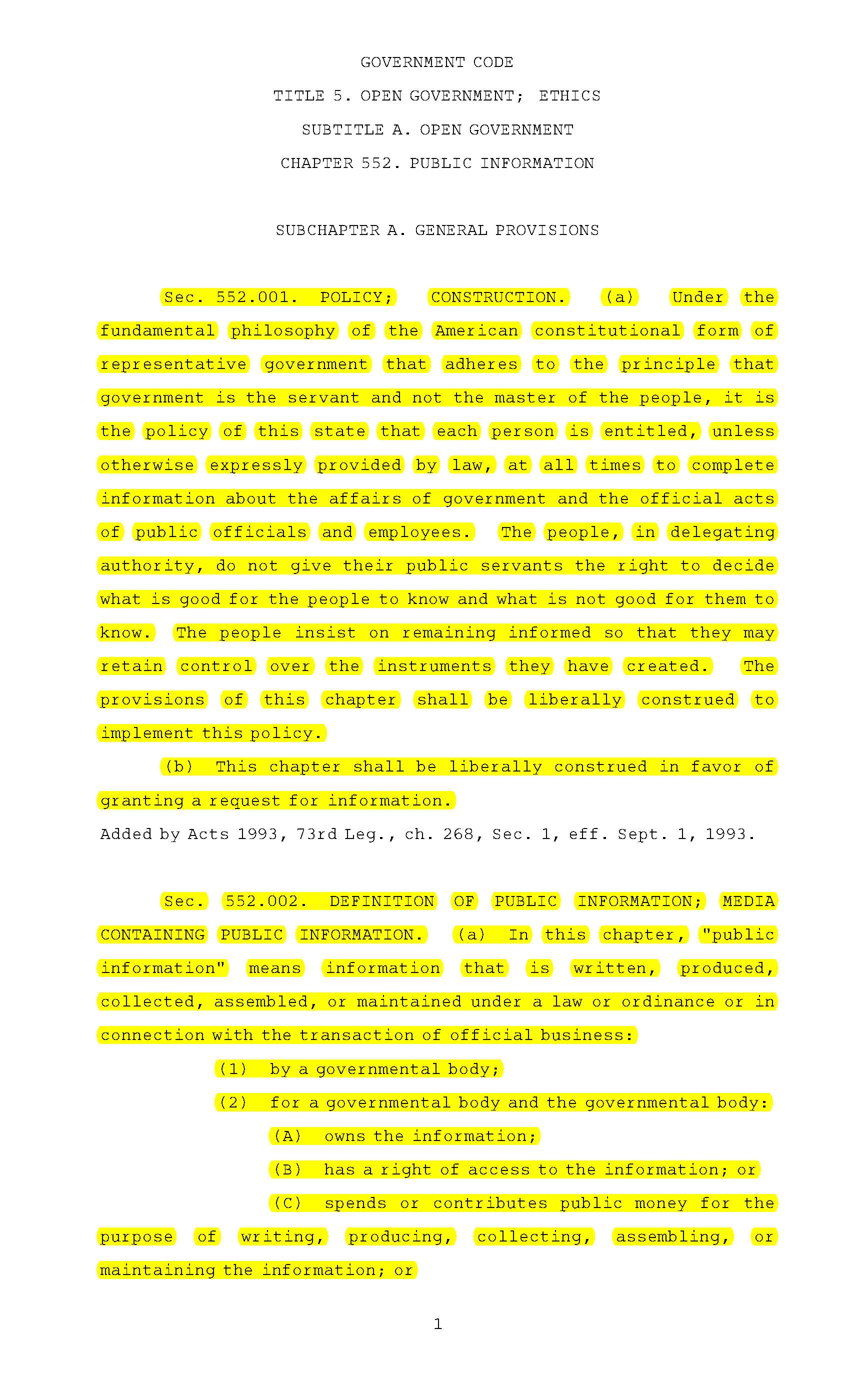 Examples
of current Texas law effecting the Compact for a Balanced
Budget Commission, a "governmental body," include Chapter 552, Public Information Law, state of Texas. As stated Section 552.001 of Chapter 552, "Under
the fundamental philosophy of the American constitutional form of
representative government that adheres to the principle that government
is the servant and not the master of the people, it is the policy of this state that each person is entitled, unless otherwise expressly provided by law, at all times to complete information about the affairs of government and the official acts of public officials and employees. The
people, in delegating authority, do not give their public servants the
right to decide what is good for the people to know and what is not
good for them to know. The people insist on remaining informed so that they may retain control of the instruments they have created.
The provisions of this chapter shall be liberally construed to
implement this policy." (Click on image right to enlarge, emphasis
added).
Examples
of current Texas law effecting the Compact for a Balanced
Budget Commission, a "governmental body," include Chapter 552, Public Information Law, state of Texas. As stated Section 552.001 of Chapter 552, "Under
the fundamental philosophy of the American constitutional form of
representative government that adheres to the principle that government
is the servant and not the master of the people, it is the policy of this state that each person is entitled, unless otherwise expressly provided by law, at all times to complete information about the affairs of government and the official acts of public officials and employees. The
people, in delegating authority, do not give their public servants the
right to decide what is good for the people to know and what is not
good for them to know. The people insist on remaining informed so that they may retain control of the instruments they have created.
The provisions of this chapter shall be liberally construed to
implement this policy." (Click on image right to enlarge, emphasis
added). Also relevant to the discussion to the effect of Texas state law on the Compact for a Balanced Budget Commission "a governmental body" (and the compact itself) is the Chapter 551, Open Public Meetings Law, State of Texas which establishes the terms and conditions under which public meetings by governmental bodies are held. Based on available evidence the Commission appears to have violated both state laws. FOAVC emphasizes its access to the records of the Commission is limited to what the Commission publishes on its website. However it is reasonable to presume the Commission is stating, by its publication of what appears on its website that this is the full public record of the Commission as the website has no reference stating the record exists elsewhere. Texas law demands all public records of a "governmental" body be available for public inspection. Not having the full public record available for public inspection on the website or elsewhere as described by law is, itself, a violation of Texas state law. As will be discussed, many elements of public record required by Texas state law have either not been published by the Commission, are not available for public inspection or appear not to exist.
Both Chapter 551 and Chapter 552 prescribe civil and criminal penalties for violation of these state laws. The state of Texas does not recognize indemnification by the organization violating their law. Nor does Texas permit a party accused of violation to decline prosecution by choosing to change court venues at its convenience. The consequences of violation of these laws can be severe for the organization which violates them.
In the case of violation of the public meeting law (Chapter 551) a determination of violation by a Texas court can result in the voiding of any action taken at any meeting held in violation of the law. Further Texas law authorizes a state judge to determine the question of whether the "Commission" is "governmental body" or simply a political ruse of Compact for America to accomplish its political agenda by circumventing law. As this question has not been settled by a court as stipulated by law, FOAVC takes the statement of Compact for America (and the Commission) at face value and assumes the Commission is a "governmental body" under Texas law. FOAVC presents evidence of violation of Texas law of this "governmental" body.
Evidence of Violations
 According to the "Meeting Minutes" posted on the Compact for a Balanced
Budget Commission's website the Commission held telephone conference call meetings on Tuesday, January 13, 2015, Tuesday, April 7, 2015 and Monday, June
22, 2015
(click image left to enlarge). Two of the meetings are
described as "emergency" meetings. Additionally, the website describes the Commission's "first full meeting" held
in Washington DC on May 25, 2016.
According to the "Meeting Minutes" posted on the Compact for a Balanced
Budget Commission's website the Commission held telephone conference call meetings on Tuesday, January 13, 2015, Tuesday, April 7, 2015 and Monday, June
22, 2015
(click image left to enlarge). Two of the meetings are
described as "emergency" meetings. Additionally, the website describes the Commission's "first full meeting" held
in Washington DC on May 25, 2016.While a portion of the Commission's by-laws (see pages 7-8 current by-laws) appear on the surface to reflect the requirements of the Texas Open Public Meetings law, evidence does not support that in actual practice the provisions of Texas law are obeyed by the Commission. Further, there is no Commission policy in the by-laws reflecting obedience to the requirements of the Texas Public Information law.
There is no question the Compact for a Balanced Budget Commission as a "governmental body" is regulated by Texas Open Meetings and Public Information laws. Texas law defines a "governmental body" as a "board, commission, department, committee, or agency within the executive or legislative branch of state government that is directed by one or more elected or appointed members." [Emphasis added]. Significantly, the rest of the definition of government bodies in the state law use the phrase "in the state" as opposed to the broader phrase "within the...legislative branch of state government." Therefore the law does not limit the definition only to Texas but all state legislatures. Further, the compact text creating the Commission disposes of any question of Texas jurisdiction. Therefore the broader phrase obviously, in this case, applies to the Commission placing it under the jurisdiction of the Texas law. In this case, reference to "legislative branch of state government" refers to all state legislatures which, as members of the compact, agreed to the creation of the Commission as a "interstate governmental agency" physically located in the state of Texas and subject to that state's laws. Similarly, the Texas law defining what is a "meeting" as well what is an "open" public meeting applies to the Commission, a "governmental body." Texas law requires all meetings (regular, special, or otherwise) of a "governmental body" (unless specifically exempted by law) shall be open to the public.
Evidence of Violations of Chapter 551, Open Public Meetings Law
- Texas law specifies that within 90 days of taking office "each elected or appointed public official who is a member of governmental body subject to this chapter shall complete course of training of not less than one and not more than two hours regarding the responsibilities of the governmental body...under this chapter [open public meetings] not later than the 90th day after...[assuming] responsibilities as a member of the governmental body..." The law further requires that a "governmental body shall maintain and make available for public inspection the record of its members' completion of the training."
- Texas law requires
any email communications between members of a governmental body
regarding the "public policy" over which the governmental body has
"supervision or control" must be "posted to an online message board
that is viewable and searchable by the public, is displayed in real time
and remains displayed for no less than 30 days after the email is first
posted. Additionally the law demands the message board be "owned or
controlled by the governmental body, prominently displayed on the
governmental body's primary Internet web page and is "no more than one
click away from the governmental body's primary Internet web page." The
law also requires any messages taken down from the message board after
the 30 day posting be maintained "for a period of six years" and are
considered public information under Chapter 552. The law also forbids
any action "that is required to be taken at a meeting" from being taken
by online message of the members of the Commission.
- Texas law requires a "governmental body shall prepare and keep minutes or make a recording of each open meeting of the body." The law also requires that "a person in attendance may record all or any of any open meeting of a governmental body."
- Texas law requires that a "governmental body shall give written notice of the date, hour, place and subject of each meeting held by the governmental body."
There is no evidence proving members of the general public were allowed access to the Ivy Dell Ct. address, a private residence, during the meetings of the Commission in order to be able to record any part of the meeting they desired. There is no evidence proving members of the general public were allowed to assemble at the UPS Mailing Box in order to record the Commission as it conducted its business at the UPS Mailing Box. There is no evidence the general public was informed in any written notice of the subjects of the Commission meetings prior to their being held.
- Texas law requires the "notice of a meeting of a governmental body must be posted in a place readily accessible to the general public at all times for at least 72 hours before the scheduled meeting." While the law allows for posting on the Internet, it still requires "physically posting the notice at a particular location."
- Texas law stipulates under what conditions an "emergency" meeting of a governmental body may be held.
Approval of grants and changes in by-laws are clearly neither an "imminent threat to public health or safety" nor an "unforeseeable" situation. As the Commission and the CFA Educational Foundation are located at the same address be it the UPS Mailing Box or the private residence, transfer of funds from one CFA body to another when, to all appearances, the Commission is entirely financially supported by the Educational Foundation, is hardly an "unforeseeable" situation. Further, evidence shows that the Commission has held weekly "closed" meetings for the purpose of discussing political strategy which would, of course, include planning for the expenditure of funds to advance the political agenda of Compact for America. Thus, any such expenditures would clearly be "foreseeable." Besides there being no evidence a notice of the "emergency" meeting was posted at all, there is no evidence proving in the required notice the Commission cited under which provision of law requiring description of the "emergency" or "urgent public necessity" the "emergency" meetings of the Commission were held.
- Texas law permits "closed" meetings of a "governmental body" under several specified circumstances none of which appear to apply to the Commission. The only possible provision which might apply permitting a "closed" meeting of the Commission is in consultation regarding pending litigation, a settlement offer or where the duty of the attorney to the "governmental body" conflicts with the law. The law requires that if a "governmental body" holds a "closed" meeting it is first to convene in an "open" meeting "for which notice has been given as provided by this chapter [of Texas law] and during which the presiding officer shall announce publicly "that a closed meeting will be held and identifies the section or sections of this chapter under which the closed meeting is held."
- The law further requires that any "final action,
decision, or vote on a matter deliberated in a closed meeting "may only
be made in an open meeting that is held in compliance with the notice
provisions of this chapter." Further the law requires that a
"governmental body" "shall keep either a certified agenda or make a
recording of the proceedings of each closed meeting" and that the
presiding officer "shall certify that an agenda kept" as required by
law "is a true and correct record of the proceedings" and includes "a
statement of the subject matter of each deliberation; a record of any
further action taken; and announcement by the presiding officer at the
beginning and the end of the meeting indicating the date and time."
According to the Commission minutes of January 13, 2015 (page 3-4) weekly "closed" meetings have been held by the Commission since that date. If the Commission has maintained its schedule of one "closed" meeting a week since January, 2015 this means the Commission has, as of June, 2017 held at least 130 closed meetings in violation of Texas state law. The purpose of these closed meetings, according to the minutes, is to receive "weekly status updates to strategize on the expansion of membership in the Compact and the passage of the required Congressional Resolution." As its excuse for blanket "closed" meetings the minutes state unspecified "sensitive information will be discussed in these weekly conferences." Texas law only permits discussion of "sensitive information" of specific nature meaning only certain types of "sensitive information" may be discussed in a "closed" meeting held by a "governmental body." Texas law does not permit a "governmental body" to hold "closed" meetings for purposes of discussion of political strategy or to receive weekly reports from a political advocacy group. Therefore any discussion of any "sensitive information" by the "governmental body" discussing political strategy or weekly reports from a political advocacy group is public information and subject to the provisions of Chapter 552, Public Information Law, state of Texas.
The exemption of law which might be permissible in the case of the Commission would be in relation to a litigation involving the Commission or where the Commission's attorney believed the actions of the Commission were in violation of attorney ethics. According to the technical services agreement, the Foundation does not serve at its attorney. There is no record of any litigation pending toward the Commission. Therefore, at present, this exemption does not appear to be available to the Commission. Moreover the stated purpose of the "closed" meetings expressed in the January 13, 2015 minutes (political briefing and strategy planning) preclude this exemption as an excuse for holding the "closed" meetings.
Evidence suggests several financial "grants" not mentioned in any of the three open public meetings of the Commission were approved in "closed" session without being approved in open meeting as required by law. None of these "weekly" closed meetings of the Commission were announced in a corresponding "open" meeting held before and after the closed meeting as required by law. There was no notification of the "closed" meeting as required law and no record of the legal authority under which the "closed" meeting was held being announced at an "open" meeting of the Commission. Texas law does not permit a one-time, generalized announcement made one time in "governmental body" minutes permitting the "governmental body" to then hold endless "closed" meetings. The law is specific: each "closed" meeting must be held during an "open" meeting and announced at that meeting. There is no record of a certified agenda of these closed meetings as required by law.
As all meetings, including any "closed" meetings of the Commission, appear to have been held by telephone conference, the law requires a recording of that "closed" meeting be made in addition to a certified agenda of the "closed" meeting. There is no record of any recording made of any of the "closed" meetings of the Commission as required by Texas state law.
In sum, the Compact for a Balanced Budget Commission appears to have violated the Texas Open Public Meetings law on at least 130 occasions by holding "closed" meetings in violation of several provisions of state law.
- Texas law describes
the special circumstances and conditions under which a "governmental
body" may hold its meetings by use of telephone (a telephone conference
call), video conference or the Internet. These requirements are in
addition to other requirements of law associated with holding a
"governmental body" meeting in a physical location. Therefore the fact
the Commission has published its meeting minutes on its website does
not mean the Commission satisfied all requirements of law in regards to
its meetings.
There is no evidence the telephone conference meetings of the Commission in any complied with the requirements of Texas law. The law stipulates under what circumstances a telephone conference meeting of a "governmental body" may be held. A telephone conference meeting is only permitted if "an emergency or public necessity exists as defined by law and the convening at one location of the quorum of the governmental body is "difficult or impossible." There is nothing to suggest scheduled airline service from the various states in which the commissioners reside to the "place" of the Commission in Texas was unavailable at the scheduled times of the meetings. According to the Commission by-laws (Page 7) a five day notice is required for each meeting giving the commissioners more than sufficient time to arrive from their place of residence out of state and attend the public meeting of the Commission at either the UPS Mailing Box location or at the private residence address. Therefore a physical meeting of the Commission was neither difficult nor impossible. It is also clear the agenda of the meetings did not constitute an emergency or public necessity as it concerned, the "approval" of funds from Compact for America Educational Foundation Inc., to be spent for lobbying efforts. Such efforts clearly do not qualify as an "emergency" or a public necessity as defined by Texas law.
As already discussed notice of the meetings were apparently not posted in a physical location as required by law, did not specify the physical location of the Commission "where meetings of the governmental body are usually held,"and did not satisfy the requirement of law that "each part of the telephone conference call meeting "shall be audible to the public at the location specified in the notice of the meeting as the location of the meeting." Further the law mandates the telephone conference shall be recorded and made available to the public. There is no evidence the meetings were recorded. No link to a recording of the meeting is posted on the Commission website. The law states each person speaking during the telephone conference call shall be "clearly stated prior to speaking." As there is no recording of the meeting, there is no way to confirm this requirement of law was done by the Commission.
Summation
Documented evidence (or the lack thereof) shows on numerous occasions the Compact for a Balanced Budget Commission appears to have violated the Texas state open public meetings law. These violations include: failure of commission members to take mandated training regarding the open public meetings law in a timely fashion; failure to post required email communications between commission members as required by law; failure to give proper written notice of meetings of the commission as required by law; holding "closed" meetings in violation of the law; holding "emergency" meetings of the commission when no such "emergency" exists in violation of the law; holding telephone conference meetings in a manner contrary to the law and holding a public meeting in Washington DC without giving proper notice as required by law of the meeting in the state of Texas.
Under Texas state law any action taken by a governmental body during in a meeting held in violation of the Texas Open Public meetings law may be voided by court order. As there is evidence all meetings of the Compact for a Balanced Budget Commission have been held in violation of this law, the court can void all actions taken in January 13, 2015 Commission meeting which include a resolution to declare the Commission formally established, approval of the by-laws of the Commission, approval of officers, and approval a Pro Bono Technical Advisory Services contract with Compact for America Education Foundation, Inc., (a Texas not for profit corporation). The court action could also effect any indemnification policy contained within the by-laws of the Commission (or the Foundation as it is also subject to Texas law) resulting in the full exposure of all members to the full weight of Texas law.
Under the terms of the Texas meeting law the court is free to examine the entire question of whether the Commission operates under the law. Because of the peculiar language of the compact itself this means the Texas state court can rule violations of the Texas Open Meetings Act nullify the entire compact. The terms of the compact permit this by subjecting the compact to the jurisdiction of a single state. Therefore CFA cannot object to a Texas state court nullifying the compact if it chooses to do so even if this means a Texas court nullifies laws passed in other states. Texas law permits any interested party, whether a resident of the state of Texas or not, to file a complaint of violation of the open public meetings law to begin the court process.
Evidence of Violations of Chapter 552, Texas Public Information Law
In addition to apparent violations of the Texas Open Meetings Law, the Commission appears to have violated several provisions of the Texas Public Information Law. Texas law defines "public information" as "information that is written, collected, assembled or maintained in connection with the transaction of official business of a governmental body" for which the governmental body owns the information; has a right of access to the information" or by an individual officer or employee of a governmental body in the officer's official capacity and the information pertains to official business of the governmental body." The law broadly defines the definition of "public information" as pertaining to all forms of record including electronic and physical records.
As with Chapter 551, the Texas Open Public Meetings law, Texas law defines a "governmental body" as "a...commission...that is within or is created by the executive or legislative branch of state government and that is directed by one or more elected or appointed members." As with Chapter 551, the rest of the definitions of "governmental body" use the phrase "in the state" or refer to a political subsection of the state of Texas. As the statute mandates that it shall be "liberally construed" it is clear that as the Commission was created by the legislative branch of state government(s) by means of becoming members of the Compact for a Balanced Budget and the commissions were appointed under terms of that compact, Chapter 552, Texas Public Information Law applies. Texas law "does not authorize the withholding of public information or limit the availability of public information to the public" except as expressly provided by law. Apparent violations by the Commission include:
- Texas law specifies that within 90 days of taking office "each elected or appointed public official who is a member of governmental body subject to this chapter shall complete course of training of not less than one and not more than two hours regarding the responsibilities of the governmental body...under this chapter [public information law] not later than the 90th day after... otherwise assum[ing] the person's duties as a public official." The law further requires that a "governmental body shall maintain and make available for public inspection the record of its members' completion of the training."
- Texas law
requires that public information of a "governmental body" is,
"available to the public at the minimum during normal business hours of
the governmental body." Normal business hours are generally assumed to
be Monday to Friday, 8 a.m. to 5 p.m., holidays excluded.
- Texas law establishes several examples of the kind of information that is public information under the law that are "not excepted from required disclosure unless provided by law. These include "information in an account, voucher, or contract relating to the receipt or expenditure of public or other funds by a governmental body"; a description of the agency's central and field organizations including the established places at which the public may obtain information; a statement of the general course and method by which an agency's functions are channeled and determined including the nature and requirements of all formal and informal policies and procedures; a rule of procedure...relating to the scope and content of all papers, reports, or examinations."
- Texas law specifies the chief administrative office of a governmental body is the office for public information. In the case of the Commission the chief administrative officer is Chip DeMoss. Under Texas law the officer is to make the public information of the Commission available for public inspection and copying. Texas law requires an "officer for public information shall prominently display a sign in the form prescribed by the attorney general that contains basic information about the rights of a requestor [for public information], the responsibilities of the governmental body and procedures for inspecting or obtaining a copy of public information." The law further requires the public information officer to display the sign at "one or more places" in the administrative offices of the governmental body where it is plainly visible to members of the public who request public information."
- Texas law requires that the public information officer shall "promptly" produce public information for inspection or duplication and is required to provide an explanation in writing if the information is not produced within 10 days. The law forbids the public information officer from inquiring into the motives or reason for the request for information from the person making the request except for the purpose of establishing identity. The law further requires the public information officer shall give a "requestor all comfort and facility for the full exercise of the right granted" by law. Finally, the law permits a person requesting public information from a "governmental body" ten business days to examine the public records.
In practical terms this means the private residence must be open at all times during regular business hours (Monday to Friday 8 a.m. to 5 p.m. except holidays) for any number of the general public to enter at will and examine the records of the Commission for a period up to ten business days. There is no evidence proving the Commission or its chief administrator has, in any way, complied with, provided for, or even allowed members of the general public to enter his private residence at their will in order to examine the public records of the Commission. There is no evidence any provision for the "comfort and facility" of the public during its examination of those records exists. In practical terms this means allowing members of the public access to bathroom facilities and other similar amenities of the house during their stay.
Summation
Documented evidence (or the lack thereof) shows on several occasions the Compact for a Balanced Budget Commission has apparently violated provisions of the Texas Public Information law. These violations include: failure of commission members to take mandated training regarding the public information law in a timely fashion; failure to have regular business hours in a physical location available to the public for the purposes of examination of the public records of the Commission; failure to provide all required public information required by law including financial accounts, vouchers and similar written information; failure to post required signage in public view describing the right of pubic access to Commission records; and failure to provide proper access to the public to the private residence which serves as the physical address of the Commission.
Where's the Money?
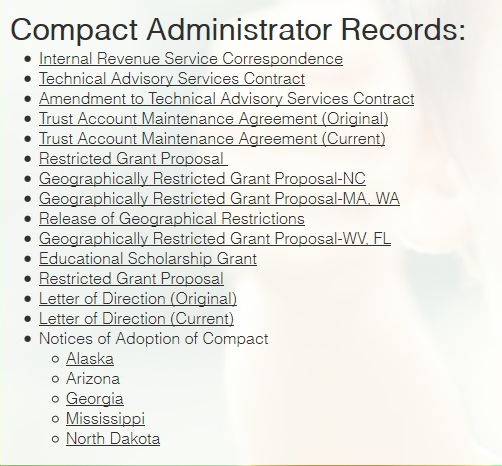 The Commission website lists several expenditures of money (referred
to as "grants") received from the Compact for
American Educational Foundation Inc., (click image left to enlarge). According to a grant stipulation from the Foundation the Commission appears to be required to operate exclusively
on monies received from the Educational Foundation. There is no record,
so far as FOAVC can determine, of any other monies being received by the
Commission from any other source.
The Commission website lists several expenditures of money (referred
to as "grants") received from the Compact for
American Educational Foundation Inc., (click image left to enlarge). According to a grant stipulation from the Foundation the Commission appears to be required to operate exclusively
on monies received from the Educational Foundation. There is no record,
so far as FOAVC can determine, of any other monies being received by the
Commission from any other source. The Foundations' 2015 income tax form states the Foundation gave the Commission $88,500 "in grants or
assistance...primarily to fund activities and travel expenses of the
Commission and Commissioners to educate state legislators and members
of Congress." (click image right to enlarge; see also 2015_039; 2015_040). According to Commission records the $88,500 was held "in
trust" in an Arizona bank account managed by Nick Dranias. A written instruction signed by members of the Commission regarding release of specific funds was made on one occasion. There
are no similar records of written instructions releasing specific funds regarding any other
grants.
The Foundations' 2015 income tax form states the Foundation gave the Commission $88,500 "in grants or
assistance...primarily to fund activities and travel expenses of the
Commission and Commissioners to educate state legislators and members
of Congress." (click image right to enlarge; see also 2015_039; 2015_040). According to Commission records the $88,500 was held "in
trust" in an Arizona bank account managed by Nick Dranias. A written instruction signed by members of the Commission regarding release of specific funds was made on one occasion. There
are no similar records of written instructions releasing specific funds regarding any other
grants. There is no record of a vote in a public meeting (held in compliance with the Texas Open Public Meetings law) of the Commission approving this trust or of a subsequent vote in a public meeting (held in compliance with the Texas Open Public Meetings law) to dissolve the trust on August 12, 2016 and transfer the balance of its funds ($38.03) to the Commission Chief Administrator Chip DeMoss. Once monies were received by the Commission a "governmental body," they become public funds subject to the provisions of the Texas Public Information law. There are no records of vouchers or other accounting information (required by law) showing the details of the Commission bank account (which would include reports showing on-going balances of the account) or the precise nature of expenditures (receipts and other vouchers) made by the Commission regarding these public funds that have been made available for public inspection by the Commission.
In an initial grant dated April 4, 2015 Compact for America Educational Foundation Inc., budgeted $7500 a month for six months ($45,000 total) in Commission grants. Apparently additional grant money (totaling $43,500) was also given to the Commission at undisclosed times for a total of $88,500 as reported in the 2015 Foundation income tax return. While the initial grant specified several conditions the Commission was to meet in order to receive Foundation grant money there is no record showing under what terms the additional $43,500 was given.
Among the requirements the Foundation (referred to as CFAEF in the grant) stipulated was the Commission (referred to as CBBC in the grant) was to provide "ongoing periodic report of anticipated official compensated and reimbursed actions at operational meetings of CFAEF"; "furnish an ongoing periodic post-monthly report of official compensated and reimbursed actions at monthly operational meetings of CFAEF"; respect the confidentiality of all corporate activities and donor information, which are held in confidence by CFAEF and Compact for America, Inc."; "maintain the CBBC's tax exempt status under Internal Revenue Code, 26 U.S. Code § 115 such that (i) the funds granted hereunder constitute deductible charitable contributions under 26 U.S. Code § 170(c)(1), (ii) a form 990 need not be filed by the CBBC under Rev. Proc. 95-489, 199-2 C.B. 418, 1995-47 I.R.B 13, and (iii) the furnishing of technical advice and assistance by the CFAEF to the CBBC shall remain excluded from the definition of lobbying under 26 C.F.R. §§ 53.4945-2(d)(2), 56.4911-2(c)(3)."
Under the Texas Public Information law as all of the above requirements established by the Foundation clearly fall under the definition of official business by the Commission, a "governmental body." Therefore, as required by law, all reports required by CFAEF in its grant that are to be sent to it by the Commission, any information regarding corporate or donor information of CFAEF in the possession of the Commission, all information regarding receipt and expenditure of money received from CFAEF and proof of the Commission satisfying all requirements of federal income tax law, as required by the CFAEF grant, are public record and therefore subject to public inspection. None of the required reports or records mandated by CFAEF grant has been made public or is available for public inspection as required by law.
The records the Commission has published on its website show Compact for America grants to the Commission in the following amounts:
- June 15, 2015 $3000
- July 27, 2015 $6000
- September 14, 2015 $9900 (for weekend escape package)
- October 1, 2015 $2500
- December 8, 2015 $10,000
In sum, it appears Compact for America Educational Foundation Inc., funneled at least $88,500 in 2015 to the Commission in order for the Commission conduct lobbying efforts in several states (referred to as "education" by CFA) to further the political agenda of Compact for America. While the Foundation apparently went to great lengths in its grants to require the Commission demonstrate it is a "governmental body" and thus eligible to receive these "grants" under IRS regulations as tax exempt "contributions," the record actual compliance raises questions of whether these requirements were for show or actually intended to be enforced by CFA. Thus, there is a question whether the Commission actually proved as required by the Foundation that it was, in fact, a "governmental body" under federal income tax law. It appears contributions by the Foundation ceased in December, 2015 as there is no record of any further grants on the Commission website.
According to its records the total amount of grants spent by the Commission in 2015 was $38,000. The Foundation gave a total of $88,500 according to its IRS tax form. While the Commission budgeted amounts of $2000 a month in compensation to each commissioner for a period of six months (a total of $36,000) plus $500 a day in per diem travel expenses for each commissioner, there is no record of any of this budgeted money actually having been spent by the Commission or accounted for by the Commission in the form of vouchers and other accounting records. Allowing for the $38.03 left in the Commission bank account at it closure and subtracting the $38,000 accounted for in public grant statements, this leaves a balance of $50,461.97 in public funds unaccounted for by the Commission. FOAVC asks: Where's the money?
The Commission and the IRS--A Question of Paperwork
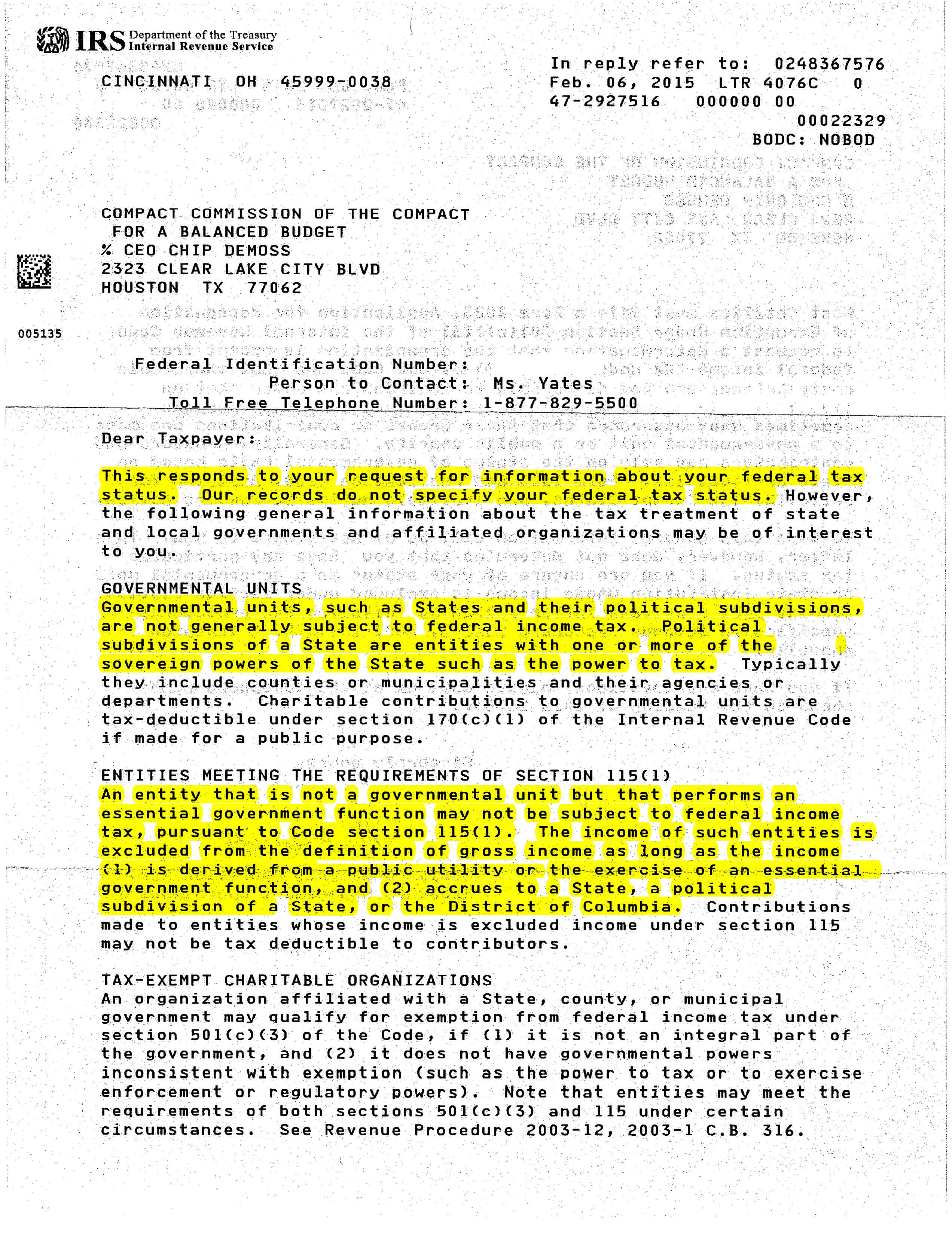 Compact
for America Educational Foundation Inc., required in its initial grant to the Commission that it satisfy several provisions of
federal income tax law proving the Commission is a "governmental body."
As no other information by the Commission or Compact for America
websites is provided proving this, it appears these requirements, so far as
the Foundation and the Commission are concerned, were satisfied by a February 6, 2015
IRS response letter posted on both the
Commission and CFA websites (click image left to enlarge). The letter was addressed to the "Compact
Commission of the Compact for a Balanced Budget" in care of CEO Chip
DeMoss apparently referring to his position in Compact for America Educational Foundation, Inc.
Compact
for America Educational Foundation Inc., required in its initial grant to the Commission that it satisfy several provisions of
federal income tax law proving the Commission is a "governmental body."
As no other information by the Commission or Compact for America
websites is provided proving this, it appears these requirements, so far as
the Foundation and the Commission are concerned, were satisfied by a February 6, 2015
IRS response letter posted on both the
Commission and CFA websites (click image left to enlarge). The letter was addressed to the "Compact
Commission of the Compact for a Balanced Budget" in care of CEO Chip
DeMoss apparently referring to his position in Compact for America Educational Foundation, Inc. Notably, the date of the IRS response letter predates (by at least a month) the formal enactment by a third state (Mississippi) required by the terms of the Compact for a Balanced Budget to create the Commission. This fact may explain why the IRS states in its letter that it has no specific record of the "Commission's" tax or "governmental body" status because the Commission didn't even exist until at least a month after the letter was sent by the IRS. According to Commission minutes the Commission didn't even even come into existence until January, 2015 nearly a year after the IRS sent its letter. There is no record showing that after the Commission came into existence with passage of the Compact for a Balanced Budget by the state of Mississippi and after the Commission was formed in January, 2015 any action was made, either by the Commission or Compact for America, to verify the tax and "governmental body" status of the Compact for a Balanced Budget Commission with the IRS.
The text of the 2015 IRS letter shows it does not prove the Commission is a "governmental body" approved by the IRS as it clearly states, "This letter, however, does not determine that you have any particular tax status." Thus the letter does not satisfy the terms required by the grants from Compact for America Educational Foundation Inc. The letter briefly summarizes very complex IRS law and regulations and invites the Commission (CEO DeMoss) to "seek a private letter ruling by following the procedures specified in Revenue Procedure 2007-1, 2007-1 I.R.B. 1 (updated annually)." This appears not to have been done by either DeMoss, Compact for America or the Commission.
Based on the evidence presented by Compact for America, despite requirements expressed in its compact grant to the Commission mandating proof the Commission is a "governmental body" under federal tax law, the Commission appears to have provided no valid proof of its tax or "governmental body" status to CFA. Despite the CFA requirement the Commission prove its governmental status, all evidence suggests CFA ignored the terms of its own grants and donated the money to the Commission anyway. While the CFA grant describes several IRS regulations (Rev. Proc. 95-489, 199-2 C.B. 418, 1995-47 I.R.B 13) which it states the Commission must satisfy in order to receive grant money, there is no proof the Commission took any action to satisfy any of these requirements.
As indicated in the IRS response letter, IRS regulations are frequently updated. Therefore it is likely the specific references in the initial CFA grant were, at some point, updated by the IRS making the specific reference outdated. FOAVC was able to locate a similar version of the regulation Rev. Proc. 95-489 referred to in the CFA grant. However FOAVC cannot state whether this regulation superseded or preceded the regulation cited by the CFA. FOAVC assumes the regulations are similar. Therefore most of the information remains unchanged through various versions. If it is discovered that the specific regulation referred to in the CFA grant (1) is still in effect and (2) contains substantial textual differences that effect the information presented by FOAVC, FOAVC will, if notified, alter our information accordingly.
The CFA grant does not contain a successor clause, such as is referred to in the IRS response letter by noting its regulations are updated annually. A successor clause is a clause in a contract requiring satisfaction of some provision of law or regulation which may be updated by the legal body in control of the law or regulation. In order to maintain the requirement the clause requires adherence to that law or regulation or its successor. Without this clause the obligation called for in the contract expires as soon as the specified law or regulation expires. Such is the case in the initial CFA grant. The grant specifies compliance to specific IRS regulations, but does not contain a successor clause for those regulations. Without this clause in the grant the Commission is only obligated to prove it is a "governmental body" under the specific reference cited. Further the grant contains no time limit clause establishing when the Commission is required to provide the required proof to Compact for America.
Without successor and time limit clauses in the grant if the Commission does not prove it is a "governmental body" under the IRS provisions listed in the grant, and those regulations are later updated by the IRS making the original regulations inoperative, nothing in the grant requires the Commission satisfy those successive IRS regulations. In other words, the terms of the CFA grant allow the requirements of the grant requiring proof as to independence, governmental standing and so forth to expire without the Commission actually satisfying them. Moreover the grant allows the Commission to determine when (if ever) it provides proof to CFA. In sum, the requirements are, for all practical purposes, meaningless. In actual practice Compact for America can donate to the Commission under whatever terms it chooses. The "terms" of the grants appear to demand strict evidence the Commission is a "governmental body" but in fact can and apparently have been ignored by the Commission.
IRS Governmental Information Letters
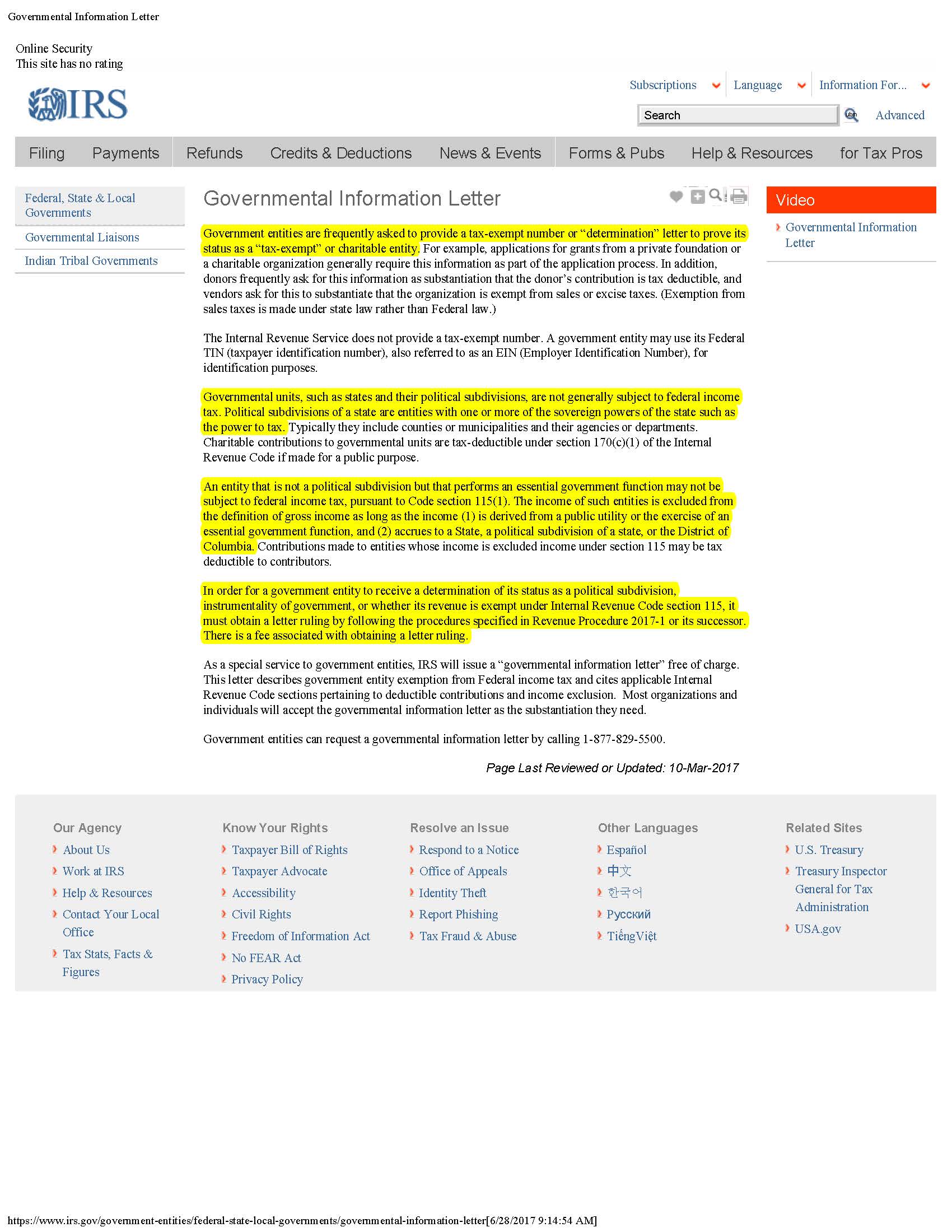 As
with everything regarding income tax law, the IRS has a page on
its website discussing Governmental Information Letters such as the one
referred to in the February, 2015
letter to the Commission (click image right to enlarge). While the IRS
may determine differently when officially requested by the Commission,
an examination of the terms of the notices appears to indicate the
Commission does not qualify as a "governmental body" under IRS
regulations. The IRS notice
says, "states and their political subdivisions are not generally
subject to federal income tax." The IRS defines a political subdivision
of a state as "entities with one or more of the sovereign powers of the
state such as the power to tax."
As
with everything regarding income tax law, the IRS has a page on
its website discussing Governmental Information Letters such as the one
referred to in the February, 2015
letter to the Commission (click image right to enlarge). While the IRS
may determine differently when officially requested by the Commission,
an examination of the terms of the notices appears to indicate the
Commission does not qualify as a "governmental body" under IRS
regulations. The IRS notice
says, "states and their political subdivisions are not generally
subject to federal income tax." The IRS defines a political subdivision
of a state as "entities with one or more of the sovereign powers of the
state such as the power to tax." The Commission has no taxing power. Without approval of the compact by Congress, it has not been granted "sovereign powers" under the Compact Clause as those powers are derived from the Constitution. Therefore until the Compact for a Balanced Budget is approved by Congress, this provision of IRS regulations does not appear to apply to the Commission thus granting status as a "governmental body."
In another IRS posting, the IRS defines what are "Government Entities." The post states, "The identify of an entity as a government is based on constitutional, federal and state law, as well as on court decisions." It describes some governmental functions as "government instrumentalities" which it describes as "an organization created by or pursuant to state statute and operated for public purposes. Generally, an instrumentality performs governmental functions, but does not have the full powers of a government, such as police authority, taxation and eminent domain." The post also refers to "interstate instrumentalities" as a "independent legal entity organized by two or more states to carry on governmental functions."
While this provision would appear to support the claim the Commission is a "governmental body" the fact remains the compact creating the Commission has not been approved by Congress. The IRS regulation makes it clear that status as a "governmental body" is determined by the Constitution as well as court rulings. Under both of these until the Compact for a Balanced Budget is approved by Congress is has no legal effect. The provision therefore does not apply to the Commission at this time.
Even if the provision did apply, several questions arise as to whether the Commission would still be qualified. The IRS states that, "If an organization is essentially under private ownership and control, it is not an instrumentality." To determine whether or not an organization qualifies as a government instrumentality, the IRS has developed six criteria which include, "Whether there are any private interests involved"; Whether control and supervision of the organization is vested in public authority or authorities," and "the degree of financial autonomy and the source of operating expenses."
Evidence clearly indicates that despite appointment of "commissioners" by various states, private interests are clearly involved. The physical location of the Commission is a private family residence which clearly indicates the involvement of private interests. The failure of the Commission to satisfy provisions of open public meetings and public information law of the state in which the Commission is located raise further doubt as to questions of control and supervision by a "public authority." The Commission utterly fails the sixth criteria related to financial autonomy and source of operating expenses. All expenses of the Commission are controlled entirely by Compact for America Educational Foundation Inc, which has established numerous provisions purportedly for the purpose of preserving tax-exempt status for the Foundation. The financial records are clear on one point: the Commission is entirely dependent on that single financial resource (a private political organization) for its entire operating budget.
Further, other IRS tax regulations appear to exclude the Commission. The Government Information Letter states for entities to be excluded from paying income tax, monies received must be (1) derived from a public utility or the exercise of an essential government function, and (2) accrues to a State, political subdivision of a state or the District of Columbia." Neither the Commission nor CFA has provided any proof monies given it are from the exercise of an "essential government function" or that any monies received the Compact for a Balanced Budget Commission "accrued" (were sent or are to be sent) to any state or political subdivision of a state or the District of Columbia. Instead the records show the Foundation held the Commission money "in trust" effectively retaining control of all funds. All available records indicate all monies received by the Commission were received from Compact for America. There is no evidence proving monies given to the Commission by the Foundation were as a result of Compact for America performing an "essential government function" as defined by the IRS. Further, all monies received by the Commission were spent lobbying efforts in various states for passage of the Compact for a Balanced Budget on behalf of, and paid for, by Compact for America Educational Foundation, Inc. The IRS does not define this action as an "essential government function."
Finally, the IRS information letter makes it clear that "in order for a government entity to receive a determination of its status as a political subdivision, instrumentality of government, or whether its revenue is exempt under Internal Revenue Code, it must obtain a letter by following the procedures specified in Revenue Procedure 2007-1 or it successor." In short there is no proof the Internal Revenue Service has at any time, formally determined the Compact for a Balanced Budget Commission is a "governmental body" under IRS regulations and therefore entitled to any tax exempt status whatsoever.
There is no evidence the Commission or CFA has ever applied for the letter as specified by IRS Revenue Procedure 2017-1. Neither the Commission nor CFA has ever posted such a letter on its website. If this IRS letter existed, CFA or the Commission certainly would have posted it. As neither has posted the letter, it is fair to assume the letter required to prove the Commission is a tax exempt "governmental body" under IRS regulations does not exist. Therefore there is no evidence proving the Commission is not subject to federal income tax laws for monies it has received from Compact for America.
As the Commission has apparently not determined it is a "governmental body" under IRS regulations, the grant provision requiring that "the furnishing of technical advice and assistance by the CFAEF to the CBBC shall remain excluded from the definition of lobbying under 26 C.F.R. §§ 53.4945-2(d)(2), 56.4911-2(c)(3)" cannot be confirmed. Neither can it be determined that "the funds granted hereunder constitute deductible charitable contributions under 26 U.S. Code § 170(c)(1). In both cases any such determination would be up to the IRS to make and not the Commission. An IRS investigation would have to determine whether or not the activities of Compact for America Educational Foundation Inc., are excluded from the definition of lobbying under the provisions of law cited in the grant provision or constitute deductible contributions to a "governmental body."
Conclusion
FOAVC believes the IRS letter presented by CFA and the Commission is in fact, a general response letter by the IRS to an inquiry by Compact for America and not a letter of determination of status of the Commission as a "governmental body" by the IRS (as clearly stated in the letter). Compact for America (and the Commission) obviously posted the IRS with the intent of making the average person believe the Commission is a "governmental body" when in fact, as far as the IRS is concerned, it is not. If the Commission is not a "governmental body" under IRS regulations, then federal tax law may require all monies received by the "Commission" be subject to federal income tax. Further a IRS determination the Commission is not a "governmental body" could effect the status of the grants made claimed by Foundation to a "governmental body" resulting in them being disallowed by the IRS. Such a determinations however must be made by the Internal Revenue Service.
The fact the "Commission" has not been determined to be a "governmental body" under federal regulations however does not automatically preclude it from being a "governmental body" under Texas state law. That determination must be made by a Texas court. Until rulings are made by official bodies charged with such determinations, the fact the Commission (and Compact for America) have declared the Commission is a "governmental body" subject to the jurisdiction of Texas law, and the fact this "governmental body" operates within the state of Texas, and the fact Texas law appears to apply to this "governmental body" is sufficient grounds to establish the Commission is regulated by Texas law and thus subject to all provisions of that law.
FOAVC asks: "Where is the formal IRS letter of determination proving the Compact for a Balanced Budget Commission is, in fact, a "governmental body" as defined by federal income tax law?
Compact for America, IRS Regulations and Forms
Citations used by Compact for America Educational Foundation Inc., (CFAEF) in its initial grant the Compact for a Balanced Budget Commission (CBBC) regarding various tax laws and regulations have, upon closer examination of those laws and regulations, raised several questions. The grant language requires CBBC "maintain the CBBC's tax exempt status under Internal Revenue Code, 26 U.S. Code § 115 such that (i) the funds granted hereunder constitute deductible charitable contributions under 26 U.S. Code §170(c)(1), (ii) a form 990 need not be filed by the CBBC under Rev. Proc. 95-489, 199-2 C.B. 418, 1995-47 I.R.B 13, and (iii) the furnishing of technical advice and assistance by the CFAEF to the CBBC shall remain excluded from the definition of lobbying under 26 C.F.R. §§ 53.4945-2(d)(2), 56.4911-2(c)(3)."
26 U.S. Code §170(c)(1)
Taking the various tax law and regulations in the order presented the initial grant, 26 U.S. Code §170(c)(1) refers to the definition of charitable contributions to various entities. §170(c)(1) describes "a contribution or gift to or for the use of--(1) A State, a possession of the United State, or any political subdivision of any of the foregoing, or the United States or the District of Columbia, but only if the contribution or gift is made exclusively for public purposes."
The section also states donations to a foundation are considered charitable contributions only if the foundation is "organized and operated exclusively for religious, charitable, scientific, literary, or educational purposes" and "which is not disqualified for tax exemption under section 501(c)(3) by reason of attempting to influence legislation..."
Based on the reference in the grant text citing Section 170(c)(1), Compact for America believes any donation to the Commission is permitted under the terms of (c)(1) which refers to "political subdivisions" of a State." CFA ignores the fact the term "political subdivision" as defined by the IRS does not include the Commission (see directly below discussion of IRS Rev. Proc. 95-489). CFA further ignores (apparently) the provision at the end of the (c)(1) definition which states contributions are only permitted if "the contribution...is made exclusively for public purposes." According to IRS documents (see Page 4) show the six criteria discussed above are applied by the IRS to determine on a case by case basis whether any donation qualifies as "public purpose." As already discussed, the Commission fails this criteria on several counts.
Whether "exclusively for public purposes" includes the activities of CFA and the Commission is a question for the IRS to determine. According to CFA and Commission records the "exclusive" purpose of the "donated" money appears to be paying for expenses to allow members of an unrecognized "governmental body" to lobby various state legislatures and the halls of Congress under the dubious guise of labeling such action as "educating" various legislatures. The clear aim of the "education" is to obtain passage of proposed legislation creating the compact. There is no record of the Commission using its funds for any other purpose other than advancing the political agenda of Compact for America.
FOAVC asks: "Where is the proof showing monies used by the Commission are used "exclusively for public purposes" as defined by IRS regulations?"
Rev. Proc. 95-489, 199-2 C.B. 418, 1995-47
I.R.B 13
While the specific IRS procedure referred to in the Foundation's grant has not be located, as previously stated FOAVC will examine a similar document based on the assumption the fundamental information contained within this version of IRS regulations remains unchanged from version to version of IRS documents. FOAVC has highlighted several sections of the document showing the regulations do not favor the Commission being able to avoid filing a 990 tax form as stipulated by the CFA grant.
Page 2 (.01(a)) of the regulation allowing a "governmental unit" or "affiliate of a governmental unit" not file a Form 990 as required by federal income tax law state this is permissible if "It is a state or local government unit as defined in section 1.103-1(b) of the [IRS] regulations." According to an IRS letter of determination in an unrelated case (See Page 3) Section 1.103-1(b) describes a "political subdivision" as "any division of any state or local governmental unit...that has been delegated the right to exercise part of the sovereign power of the unit." The determination then states, "Three generally acknowledged sovereign powers of states are the power to tax, the power of eminent domain and the police power. It is not necessary that all three of these powers be delegated in order to treat an entity as a political subdivision for purpose of the [tax] Code. However, possession of only an insubstantial amount of any or all of the sovereign powers is not sufficient."
The Commission has no taxing power, no power of eminent domain or police power. Therefore it has no right to "exercise" any part of the sovereign power of any state or political subdivision which have such powers. Therefore Section .01(a) allowing the Commission not to file a Form 990 tax form is inapplicable to the Commission.
The remainder of the regulation (Section .02) does not help the Commission either. Section .02 (Page 2) requires the Commission "[have] a ruling or determination from the [Internal Revenue] Service that "It's income, derived from activities constituting the basis for its exemption under section 501(c) of the [IRS] Code, is excluded from gross income under section 115..." The Commission has no IRS ruling or determination stating its income, "derived from its activities constitute the basis for its exemption." The section is therefore inapplicable to the Commission.
There is no other means in the regulations specified by CFA permitting the Commission not to file tax form 990 as required by federal income tax law. It therefore appears (1) the Commission has not satisfied the terms of the CFA grant and (2) is required to file a 990 tax form (subject to public inspection) which it appears it has not done since it came into existence in 2015. Indeed there is no record showing the Commission, which has received at least $88,500 in income has ever filed any federal income tax form whatsoever.
FOAVC asks: "As the Commission appears not to qualify for the "government unit" IRS exemption but has received money which, appears to be taxable income unless otherwise exempt, where are the required 990 Forms for the Compact for a Balanced Budget Commission together with all other public disclosure tax forms required by federal income tax law proving this tax exempt status?
FOAVC asks: "If the Commission does not have tax exempt status as provided by IRS regulations, has the Commission filed any income tax forms at all which reflect the receiving of $88,500 and the subsequent expenditure of those funds?"
26 C.F.R. §§ 53.4945-2(d)(2) and 56.4911-2(c)(3)
The CFA grant requires "the furnishing of technical advice and assistance by the CFAEF to the CBBC shall remain excluded from the definition of lobbying under 26 C.F.R. §§53.4945-2(d)(2), 56.4911-2(c)(3)." IRS Regulation 26 C.F.R. §53.4945-2(d)(2) (hereafter CFR 4945) establishes regulations regarding "nonpartisan analysis, study or research." Paragraph (d)(2) deals with "technical advice or assistance." IRS Regulation §56.4911-2(c)(3) (hereafter CFR 4911) deals with "exceptions to the definitions of direct lobbying communication and grassroots lobbying communications." Paragraph (3) specifically deals with "requests for technical advice."
An examination of these regulations and other IRS regulations described in those regulations raise doubts not only as to whether they favorably apply to the Commission but whether Compact for America Educational Foundation Inc., is qualified under IRS regulations as an "educational" entity and thus entitled to tax exemption under 501(c)(3) regulations.
CFR 4945
CFR 4945 contains in it a reference to IRS Regulation §1.50(c)(3)-1, which defines the word "educational" as used in CFR 4945. The Internal Revenue Service defines "educational" as relating to, "The instruction of the public on subjects useful to the individual and beneficial to the community." Putting aside the question of whether a compact which excludes the American people entirely from any participation in the amendment process as intended by the Founders and which violates federal criminal law as the compact carries within it a threat of removal of office should the "delegate" fail to follow instructions of the compact, is "beneficial to the community," there still remains the remainder of the IRS definition:
"An organization may be educational even though it advocates a particular position or viewpoint so long as it presents a sufficiently full and fair exposition of the pertinent facts as to permit an individual or the public to form an independent opinion or conclusion. On the other hand, an organization is not educational if its principle function is the mere presentation of unsupported opinion."
Exclusion from IRS lobbying regulations claimed by Compact for America and required in its grant to the Commission is premised on the proposition the Compact for a Balanced Budget Commission is a "governmental body" as recognized by the Internal Revenue Service. As previously discussed, the IRS has never formally determined the Commission is a "government body." This is primarily because no application to the IRS as required by its regulations has ever been filed by the Commission or CFA requesting determination of such governmental status. The process for filing such application was specified in the general IRS response letter to CFA in February, 2015. However, even if an application were filed and the full facts of record of the Commission presented to the IRS, given the circumstances of private control by CFA, source of income entirely coming from a private organization as opposed to a public source of income, and lack of sovereign authority as the Commission has none of the three sovereign authorities demanded by IRS regulations, it is unlikely the IRS would determine the Commission meets the standards of a "governmental body" and thus is entitled to income tax exemption.
CFR 4945 states that in general, "A communication is not a lobbying communication...if the communication constitutions engaging in nonpartisan analysis, study or research and making available to the general public or a segment or members thereof or to governmental bodies, officials or employees the results of such work." The section then continues, "Nonpartisan analysis, study or research" means an independent and objective exposition of a particular subject matter, including any activity that is "educational" with the meaning of § 1.501(c)3)-1(d)(3). Thus, "nonpartisan analysis, study, or research may advocate a particular position or viewpoint so long as there is sufficiently full and fair exposition of the pertinent facts to enable the public or an individual to form an independent opinion or conclusion. On the other hand, the mere presentation of unsupported opinion does not qualify as "nonpartisan analysis, study or research."
The regulations provide several examples of what does and does not constitute "nonpartisan study, analysis or research" exempted from IRS lobbying regulations. The IRS uses an example of a private foundation taking a position on the dangers of the use of pesticides in raising crops. The example cites the use of data "with respect to proposed legislation pending before several State legislatures" such as proposed legislation creating the compact is before several State legislatures. In the example which the IRS states is not excluded from lobbying regulations, the IRS states, "The project takes favorable positions on such legislation [banning pesticides] without producing a sufficiently full and fair exposition of the pertinent facts to enable the public or an individuals to form an independent opinion or conclusion on the pros and cons of the use of pesticides. This project is not within the exception for nonpartisan analysis, study or research because it is designed to present information merely on one side of the legislative controversy."
The IRS then contrasts that example with a second example with what is "nonpartisan study, analysis or research" exempted from lobbying regulations. The example states the foundation establishes a research project to collect information concerning the dangers of the use of pesticides in raising crops for the ostensible purpose of examining and reporting information as to the pros and cons of the use of pesticides in raising crops. [The foundation] presents a report "which analyzes the effects and costs of the use and non use of various pesticides under various conditions..." ... "The report also presents the advantage, disadvantages and economic cost of allowing the continued use of pesticides unabated, or controlling the use of pesticides, and of developing alternatives to pesticides." The example then states, "Even if the report sets forth conclusions that the disadvantages as a result of using pesticides are greater than the advantages of using pesticides and that prompt legislative regulation of the use of pesticides is needed, the project is within the exception for nonpartisan analysis, study or research since it is designed to present information on both sides of the legislative controversy and presents a sufficiently full and fair exposition of the pertinent facts to enable the public or an individual to form an independent opinion or conclusion."
In other words for there to be an exemption to IRS lobbying regulations under CFR 4945, the Commission and Compact for America must make presentations designed (intended and written) to present both sides of the issue (pros and cons) equally and fairly and to a level sufficient to present a full and fair presentation of all pertinent facts such that anyone can make an objective opinion based on the facts presented. The regulation does not provide for aggregation of various presentations; thus each article or presentation by CFA must be judged on its own merits.
In plain English this means any "nonpartisan" presentation by CFA or the Commission purportedly exempt from lobbying regulations must be written to present both sides of the issue equally fully and equally fairly thus resulting in the presentation actually being nonpartisan. Whether this is accomplished in each CFA article is best determined by examining the information presented in each CFA article and asking, "Can it be truly said an individual reading this article is as equally likely to agree with the information as to disagree with the information?" If an honest answer to that question is "probably not," that is, that an individual reading the article will most likely take the "pro/CFA" side, then the article most likely does not qualify as "nonpartisan."
"Equally fully" appears to refers to the total amount of text in an article presenting one side of the argument. Thus, does Compact for America devote as much text to the "pro" side (supporting a compact) in each of its articles as it devotes to the "con" side (opposing a compact)? Determining whether Compact for America presents equal text space in each of its articles is accomplished by an obvious process. The article is printed out and all text favoring the "pro" side is removed and pasted together. The same process is applied to to the "con" side. The total length of copy is then measured in inches. If the length of text of the "pro" side and "con" side are approximately equal in length then the article most likely satisfies the "equally fully" provision of IRS regulations. If they are not the same length then the article fails the IRS "equally fully" standard.
"Equally fair" appears to apply to article content. Whether a CFA article presents the "pro" and "con" arguments in each article equally means judging the content of the article as well as its length. While the criteria of judging whether an issue is presented fairly, in each article is more subjective than the "equally fully" standard, nevertheless specific questions can resolve most of the issue. "If the title and information regarding who wrote the article were removed, would a person after reading the article come to the conclusion it was unbiased and provided an objective view of the material presented?" "If you favored the other side of the issue can you state without hesitation your arguments and information received equal consideration in terms of strength, completeness and accuracy in the article as those of the side you oppose?" "Were all possible references used to support your position presented?" "Was key information or references "left out" indicating an effort to "slant," misquote or weaken the information by ignoring arguments, evidence and references which might otherwise refute the opposite side's information?" If questions such as these can be answered affirmatively and without hesitation then it is likely the article passes the "equally fair" provision of the IRS. On the other hand if the questions must be answered negatively, then the article fails the "equally fair" standard.
After examining several CFA articles, there are questions as to whether Compact for America, while stating it satisfies the CFR 4945 requirements, actually satisfies the minimum requirements of "full and fair" or "equally and fairly" presentation required by the regulations. Issues with several CFA articles or overall presentation by CFA illustrates the questions of equality and fairness:
- CFA presents no information from the FOAVC website on the CFA site. FOAVC has expressed several "con" positions regarding CFA such as the FOAVC article which addresses several concerns regarding the Compact that are not presented at all to someone reading the CFA website.
- CFA has not responded to nor addressed other concerns expressed in other FOAVC web pages by presenting these concerns on its website.
- In a report discussing the cost of a proposed CFA convention no reference whatsoever is made to any "con" information which contradicts the projected cost estimates of a proposed CFA convention.
- In a report discussing how applications for a convention are to be counted
no
reference whatsoever is made to the "con" information which is
applications are not "aggregated" but instead counted numerically with
no terms or conditions by the number of applying states. References to
Supreme Court rulings as well as official actions by Congress which
support and validate this method of application tabulation as the only
constitutional mode of count are
ignored in the report.
- In a report discussing aggregation of applications in a particular amendment subject no reference whatsoever is provided to the "con" side citing or directing the reader to a full presentation by the organization (BBTF) discussed in the report. No reference is made to any public record of applications nor to the compilation of record by FOAVC showing the fallacy of the argument as calls for a balanced budget reached the two thirds mark nearly 40 years ago resulting in no congressional call whatsoever.
- In a report rebutting an "attack" on CFA by Robert Natelson, the CFA report does not provide a copy of the original Natelson article and thus presenting the "con" side of the argument fully and fairly as required by IRS regulations by giving Natelson an equal voice in the CFA article through the full publication of his original article.
- In a report detailing the "safeguards" of the Compact for America,
the report lists several safeguards but presents no "con" information
whatsoever which rebut these "safeguards" even though numerous
organizations have expressed concerns in this regard.
Finally, the text in the CFA by-laws regarding presentations (See Page 5,6 of the CFA By-Laws) raise doubt as to whether any presentation by CFA is "designed" to present both sides of the issue equally and fairly. The text of the by-law state CFA is under no obligation to conduct any individual research or investigation and that any presentation may rely "solely and exclusively upon the facts and information...provided by the Corporation [Compact for America]."
Any question of equality and fairness as to the design of CFA presentations, and whether the writing satisfies the standards set by IRS regulations and thus are exempt from lobbying regulations, would ultimately have to be determined by the Internal Revenue Service. While there is no specific definition of the words "equality" and "fairly" in IRS regulations, a general sense of what the IRS views as equal and fair can be surmised from reading its mission statement. That statement refers to "applying the tax law with integrity and fairness to all." The statement then continues saying the IRS is to perform its work "in a fair and impartial manner, with neither a government nor a taxpayer point of view." Based on these comments it appears in applying the "equal and fair" standard the IRS likely adopts its own standard of "neither a government nor a taxpayer point of view" and thus nonpartisan, to any question of CFA information.
After examination of the CFA information FOAVC does not believe that overall the CFA articles are designed to equally and fairly present the pros and cons of a Compact for a Balanced Budget. Thus, based on the information available, IRS regulations do not appear to provide an exemption from lobbying regulations as CFA believes. This is because CFA does not present a "sufficiently full and fair exposition of the pertinent facts" regarding their proposed compact in the information they present to public in that "pertinent facts" regarding the "con" side of the issue. In sum, to be qualified as a "nonpartisan" communication and therefore tax exempt, the communication must be nonpartisan, which FOAVC believes is not the case in this instance. However any determination of whether Compact for America and the Commission meet the standards of CFR 4945 and are thus qualified for a tax exemption from lobbying regulations must be made by the Internal Revenue Service. Such a determination would come only if and only after a complaint were filed alleging violation by CFA or the Commission and then examined by the IRS. If no complaint is filed then the CFA assumption the communications are tax exempt remains.
FOAVC asks: Are articles and other information from CFA and the Commission equally and fairly presenting the "pro" and "con" of a compact for a balanced budget as required by IRS regulation CFR 4945 granting exemption from lobbying laws?
CFR 4911
CFR 4911 addresses lobbying expenditures, direct lobbying communications and grass roots lobbying communications. Part of CFR 4911 addresses with "requests for technical advice" by governmental bodies and provides for exemption from lobbying laws under certain circumstances for "nonpartisan analysis, study, or research." It is this section of Internal Revenue Service regulations that is used by Compact for America Educational Foundation Inc., to justify that its "advice" and technical services agreement with the Compact for a Balanced Budget Commission is exempt from IRS lobbying regulations.
Moreover a portion of IRS regulations (CFR 4945) describing the "nature" of technical advice or assistance states that, "'technical advice or assistance' may be given as a result of knowledge or skill in a given area. Because such assistance or advice may be given only at the express request of a governmental body, committee or subdivision, the oral or written presentation of such assistance or advice need not qualify as nonpartisan analysis, study or research. The offering of opinions or recommendations will ordinarily qualify under this exception only if such opinions or recommendations are specifically requested by the governmental body, committee or subdivision or are directly related to the materials so requested." [Emphasis added].
The use of these regulations by CFA to justify its "advice" not being subject to IRS lobbying regulations does not appear to be correct. First, as already demonstrated, the "nonpartisan analysis, study or research" conducted by the Foundation is not "nonpartisan." The information, or "advice" provided by CFA does not appear to satisfy IRS standards of "nonpartisan" analysis (full and fair exposition of the pertinent facts to enable the public or an individual to form an independent opinion or conclusion). As this standard is employed throughout IRS regulations it appears such "advice" is not subject to IRS exemption from lobbying laws based on CFR 4911 as the "advice" does not qualify for exemption.
While other IRS regulations (CFR 4945) allow that "advice" that is not "nonpartisan" and thus biased may be submitted to a "governmental body" these same regulations place stipulations on that process which CFA and Commission appear not to have followed. The regulations require in order to be exempt from IRS lobbying regulations the Commission must "expressly" and "specifically" request opinions from CFA which are not nonpartisan analysis, study or research. Therefore to be in compliance with this portion of IRS regulations requires CFA present new information other than the information which it claims is "nonpartisan." While it may be construed from its service contract between the Commission and CFA that the Commission has requested such biased "advice" from CFA, the fact remains is there are no published requests from the Commission which "expressly" and "specifically" request such "advice" from Compact for America as required by IRS regulations.
The use of the words "express" and "specific" together with the phrase "directly related to the materials so requested" do not appear to allow for a generalized, one time, one size fits all "agreement" between the Commission and CFA thus permitting CFA to present unlimited biased information to the Commission with no further action by the Commission. Instead the words indicate that for each time the Commission desires biased "advice" from CFA, in order to be exempt from IRS lobbying regulations, the Commission must "expressly" request the biased "advice" and specifically state what materials or information it wishes the "advice" to address.
In order for the Commission to "expressly" and "specifically" request bias "advice" from the CFA in accordance with IRS regulations therefore requires a formal, official request by the Commission each time it desires biased "advice" from Compact for America stating what biased opinion the Commission desires and on what particular subject. As this request and subsequent vote by the Commission to request such information clearly falls into the category of official business of the Commission, Texas law mandates the request, vote and subsequent "advice" be a matter of public record available for public inspection. Further, as the request would be a matter of public record, the subsequent "advice" would also become public record. There is no exemption in Texas law allowing the request, vote or the content of the "advice," received to be withheld from the public.
There are no Commission records of any expressed or specific requests for biased "advice" from CFA as required by IRS regulations. There is no record showing the record of CFA "advice" that has been given to the Commission that is either available for public inspection as required by Texas law, or proves such "advice" was "specifically" and "expressly" requested "directly related to the materials so requested" as required by IRS regulations. A sudden appearance of such requests by the Commission would be suspect at best as well as a violation of Texas law for withholding public information at the time the Commission acted. It is equally likely the IRS would not accept the "belated" requests by the Commission as it would be impossible to prove conclusively the requests were made in conjunction with and at the time the "advice" was actually provided.
Further, as the Commission is not a governmental body formally recognized by the IRS, the IRS regulations which might otherwise grant exemption from IRS lobbying laws do not apply to the arrangement between Compact for America Educational Foundation Inc., and the Compact for a Balanced Budget Commission referred to as a "technical services agreement" by CFA. Since actual no "governmental body" is involved, any "technical services agreement" between the Commission and CFA is not an agreement between a tax exempt organization and a "governmental body" but between two private parties both of which are subject to all appropriate IRS regulations.
Any purported immunity from IRS lobbying laws that CFA asserts appear not to legally exist. Other than assertions by either CFA or the Commission there is no record whatsoever proving the "technical services agreement" has any validity in so far as providing "immunity" from any IRS regulation. Such immunity is not even mentioned in the services agreement. As shown by CFA records the Commission is a political body entirely supported by Compact for America which appears to operate for the sole purpose of advancing the political agenda of Compact for America under the guise of being a "governmental body."
Were these facts brought to the attention of the IRS, it may well be the Internal Revenue Service might view these two private parties as a single private political organization having no special immunity from its lobbying regulations. As to whatever tax consequences may occur would be entirely determined by the Internal Revenue Service. However, any "service agreement" or grant stipulations between these two private parties does not immunize them from any tax consequences which may befall the Commission or CFA because the basis for all CFA/Commission actions is the premise the Commission is a "governmental body" which it is not.
FOAVC asks: "Where is the legal proof showing Compact for America enjoys any special immunity from IRS lobbying laws because of the purported "technical services agreement" between itself and the Commission outside of statements made by either CFA or the Commission?"
Are CFA Members Public Officials?
In a recent June 14, 2017 memo written Commission chair Mead Treadwell entitled "Advisory Memorandum regarding the Congressional Resolution in the new Congress," Treadwell states it is the goal of the Commission "to have the activating Congressional Resolution for the Compact for a Balanced Budget sponsored, filed and adopted by the current Congress without delay." The memo states, "This is the required activating resolution for the Compact for a Balanced Budget." [Emphasis added]. As part of this process the memo states that, "Such guidance and counsel shall...apply to all individuals and entities that are formally associated with the Foundation...including volunteers, independent contractors and employees that are engaged by the Foundation."..."All such individuals and entities are deemed by the Compact Commission and shall be regarded as "Public Officials" of the Compact Administrator when acting in such capacity..." The memo states, "Further, provided that a call to action is avoided in any related communication their actions will not be subject to limitations on lobbying otherwise imposed by the Internal Revenue Code on the Foundation."
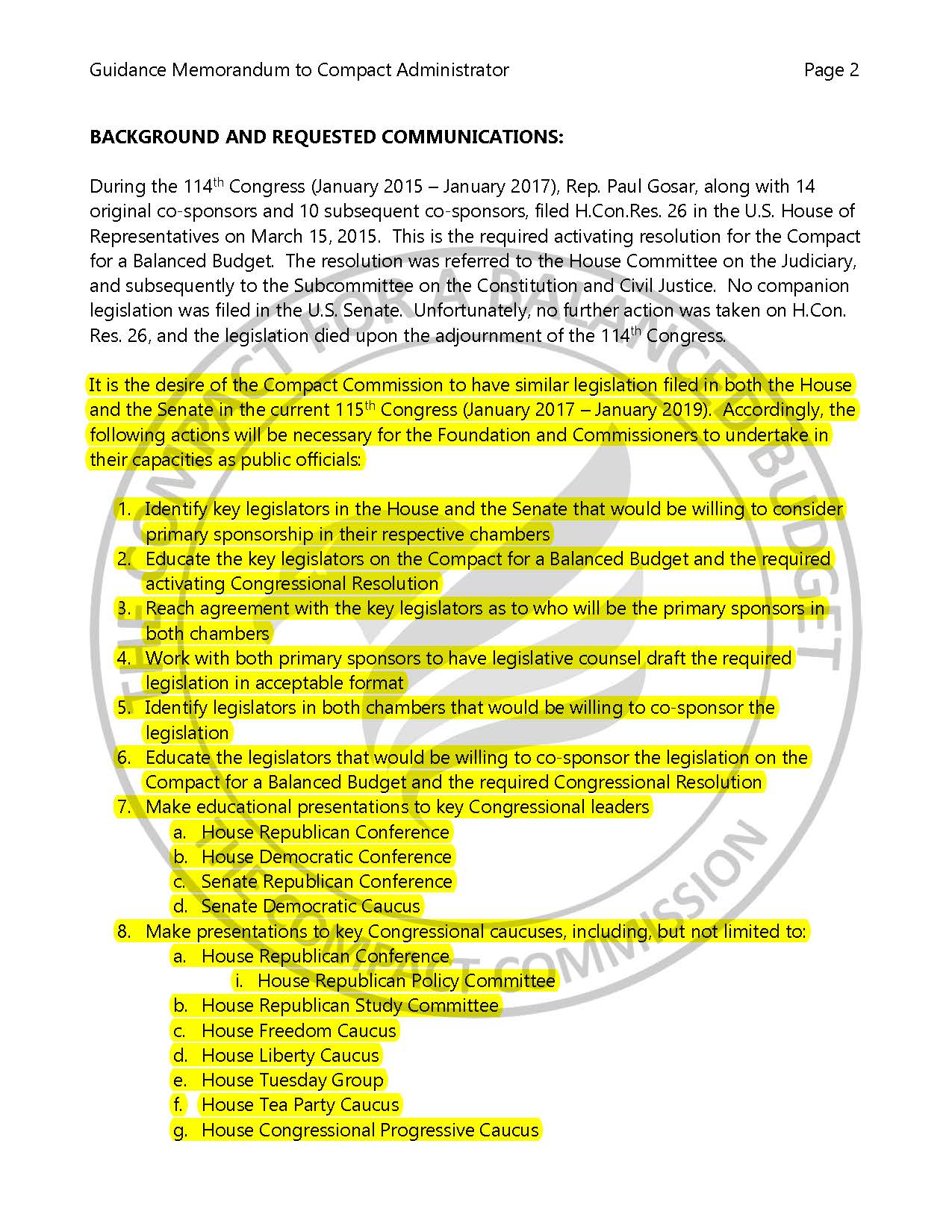
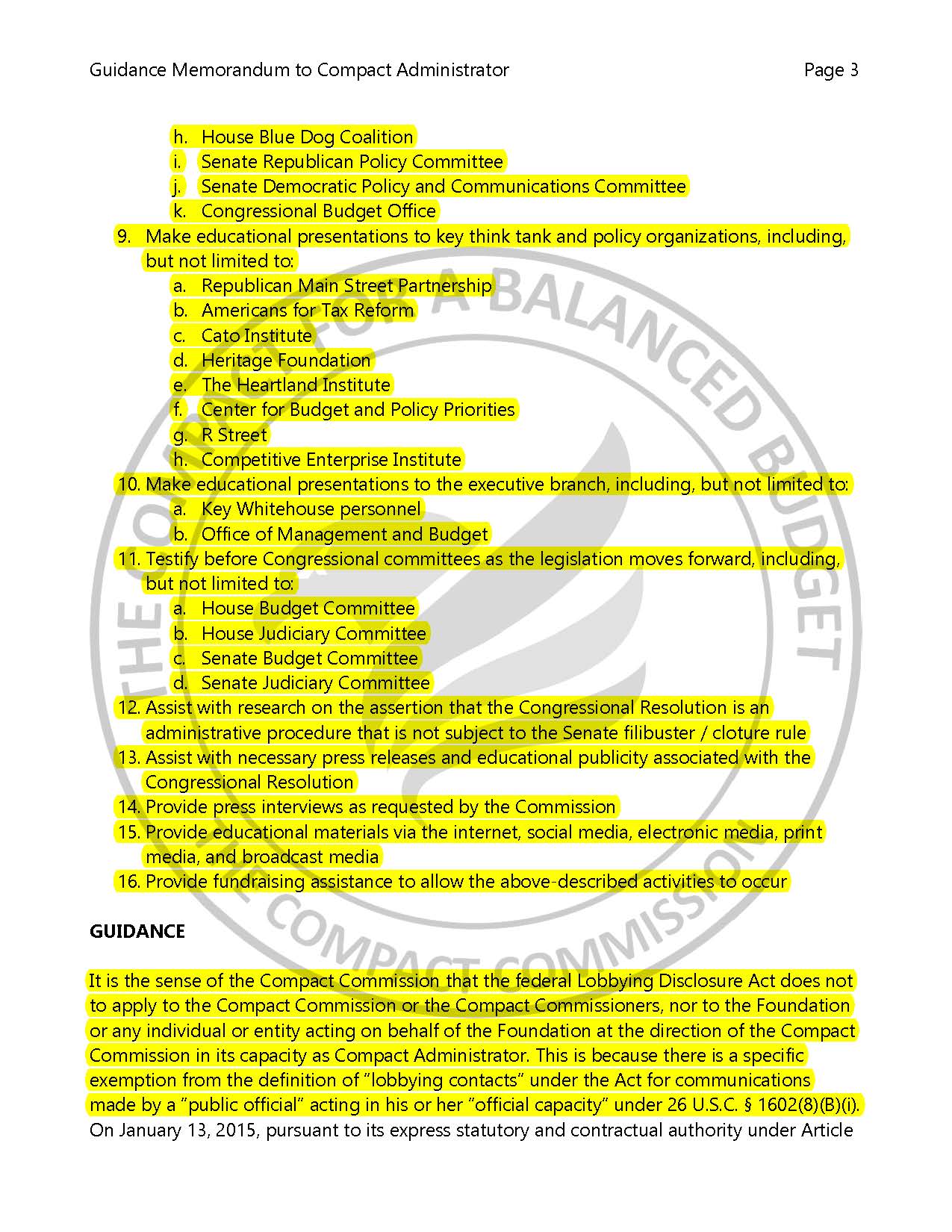 The
memo then lays out a 16 point plan calling for "legislation filed in
both the House and the Senate in the current 115th Congress (January
2017-January 2019)" (Click images left to enlarge). These points
include: "identify key legislators in the House and the Senate that
would be willing to consider primary sponsorship in their respective
chambers; reach agreement with the key legislators as to who will be
the primary sponsors in both chambers; work with both primary
sponsors to have legislative counsel draft the required legislation in
acceptable format; make educational presentations to key Congressional
leaders; make presentations to key Congressional caucuses; assist with
research on the assertion that the Congressional Resolution is an
administrative procedure that is not subject to the Senate
filibuster/cloture rule; provide fundraising assistance to allow the
above-described activities to occur."
The
memo then lays out a 16 point plan calling for "legislation filed in
both the House and the Senate in the current 115th Congress (January
2017-January 2019)" (Click images left to enlarge). These points
include: "identify key legislators in the House and the Senate that
would be willing to consider primary sponsorship in their respective
chambers; reach agreement with the key legislators as to who will be
the primary sponsors in both chambers; work with both primary
sponsors to have legislative counsel draft the required legislation in
acceptable format; make educational presentations to key Congressional
leaders; make presentations to key Congressional caucuses; assist with
research on the assertion that the Congressional Resolution is an
administrative procedure that is not subject to the Senate
filibuster/cloture rule; provide fundraising assistance to allow the
above-described activities to occur." The memo continues, "It is the sense of the Compact Commission that the federal Lobbying Disclosure Act does not apply to the Compact Commission or the Compact Commissioners, nor to the Foundation or any individual or entity action on behalf of the Foundation..." This is because there is a specific exemption from the definition of "lobbying contacts" under the Act for communications made by a "public official" acting in his or her "official capacity" under 26 U.S.C. § 1602(8)(B)(i)." FOAVC was unable to find any federal legislation of this designation; the only possibility being a section of law relating to bank loans that was repealed in the mid-1990's. The memo refers to this error of reference twice as validating its argument that the cited law applies to its circumstance. After researching the matter FOAVC believes the correct law the memo should have referred to is 2 U.S.C. § 1602(8)(B)(i).
This federal law states that "The term "person or entity" means any individual...foundation...groups of organizations, or State or local government. Public official is defined as "any elected official, appointed official or employee of (A) a Federal, State or local unit of government in the United States [or] (C) an organization of State or local elected or appointed officials..." While the IRS has not recognized the Commission as a "governmental body," under Texas state law, the Commission is a "governmental body." FOAVC believes whether the Commission is qualified for exemption under the definition of this portion of federal law would be for a court to decide. The Commission appears to have no doubt stating, "Accordingly, the Compact Commission, the Compact Commissioners, as well as the Foundation and any individual or entity acting on behalf of the Foundation...all appear to meet the definition of public official under 26 U.S.C. § 1602(15) (A) (an appointed official of a state) or (C) (an appointed official of an organization of State appointed officials)."
The Commission then states that, "by coordinating with the Compact Commission to host an official public meeting within the halls of Congress on May 25, 2016 without questioning the Commission's status...the Leadership of the House of Representatives appears to have recognized the public official status of the Compact Commission, the Compact Commissioners as well as the Foundation."
The meeting, described by the Commission as the first "full" public meeting of the Commission was held in Room 2247 of the Rayburn House Office Building. The process for reserving various rooms within Congress is described in a website. The site makes it clear that rooms may be reserved by any member of Congress provided that no political lobbying takes place at the meeting.
In his presentation on May 25, 2016 Arizona Congressman Paul Gosner states he was "honored to be on this distinguished panel and a participant in today's event." Congressman Gosner was apparently allowed to become part of the panel (the Commission) rather than just testifying before the Commission, most likely because he sponsored the 2015 bill intended to obtain congressional approval of the Compact for a Balanced Budget. While no records are available proving the congressman was the member of Congress who reserved the room, given his obvious support for the Compact for a Balanced Budget it is likely Congressman Gosner reserved Room 2247 for the meeting.
What is not mentioned in the Commission's assumption that "the Leadership of the House of Representatives appears to have recognized the public official status of the Compact Commission, the Compact Commissioners, as well as the Foundation and any individual or entity acting on behalf of the Foundation in its capacity as Compact Administrator" is whether the question of the Commission's "status" was actually presented to the members of the House Leadership or the House itself in order for a determination to occur. There is no record of this question actually being presented to the House or its leadership. The Commission has provided no official record of the House of Representatives granting official recognition of the Commission or a statement by House Leadership acknowledging the same. Thus the "appearance" of recognition of the Commission and its "official status" by House Leadership appears to be just that--an appearance based on wishful interpretation by the Commission rather than an official statement by the House or its leadership.
Conclusion
The Commission declaration that CFA members are "public officials" who are "immune" from state and federal lobbying regulations is likely legally baseless. Other than as it relates to Texas state open public meeting law and public information law which it appears to have violated numerous times, the Commission has no official recognition as a "governmental body." No Texas state law grants the Commission sovereign authority to declare anyone a "public official." While certain federal statutes may apply to Commission members, determination of whether the Commission can pass this immunity along to whomever it wishes by appointing them "public officials" is a question for the courts to decide. Presently, there is no official federal determination the Commission's interpretation of these statutes is valid.
Not even the Compact for a Balanced Budget helps in this regard. While the Commission may conclude it has such authority under a compact which, at present, has no legal force whatsoever as it has not been ratified by Congress, the fact remains there is no expressed authority in the Compact for a Balanced Budget permitting the Commission to appoint "public officials" for the expressed purpose of avoiding state and federal lobbying laws. The appointment of CFA members as "public officials" who are "immune" from state and federal lobbying laws appears legally questionable.
FOAVC asks, "Where are the legal, independent references such as federal court rulings which support the contention of the Compact for a Balanced Budget Commission's claim that it has the authority to appoint "public officials" who are immune from state and federal lobbying laws?
Form 1023 Questions
In the same statement in which the Commission declared all members of Compact for America "immune" from state and federal lobbying laws, statements made by the Commission regarding federal income tax filings by the Compact for America Education Foundation Inc., when compared to actual evidence, appear incorrect.
The Commission states, "Furthermore, it is the Commission's understanding that the Foundation [Compact for America Educational Foundation Inc.] has secured a subchapter (h) election and has never exceeded the limits on permissible lobbying expenditures. Finally, it is the Commission's understanding that the Foundation specifically sought its 501(c)(3) exemption in light of its anticipated purpose of assisting in broad education efforts related to the Compact for a Balanced Budget, the balanced budget amendment contained therein, and the required congressional activating resolution as directed by the Compact Commission. The Internal Revenue Service reportedly granted the Foundation's exemption in light of such operational purposes. Thus, notwithstanding any lobbying limitations that may otherwise generally apply because of the Foundation's status as a I.R.C. 501(c)(3) organization, the Foundation is fully authorized to undertake the foregoing broad educational efforts related to the Compact for a Balanced Budget, the balanced budget amendment contained therein, and the required congressional activating resolution as directed by the Compact Commission." (Emphasis and [] added).
According to a Wikipedia article, "subchapter (h) election "is a procedure in United States tax law that allows a 501(c)(3) non-profit organization to participate in lobbying that is limited only by the financial expenditure on that lobbying, regardless of its overall extent." In order to qualify for this procedure a 501(c)(3) organization is required to fill out IRS Form 5768 notifying the Internal Revenue Service of its election to reporting lobbying activities under this provision. Tax records indicate CFA applied for such designation in 2014.
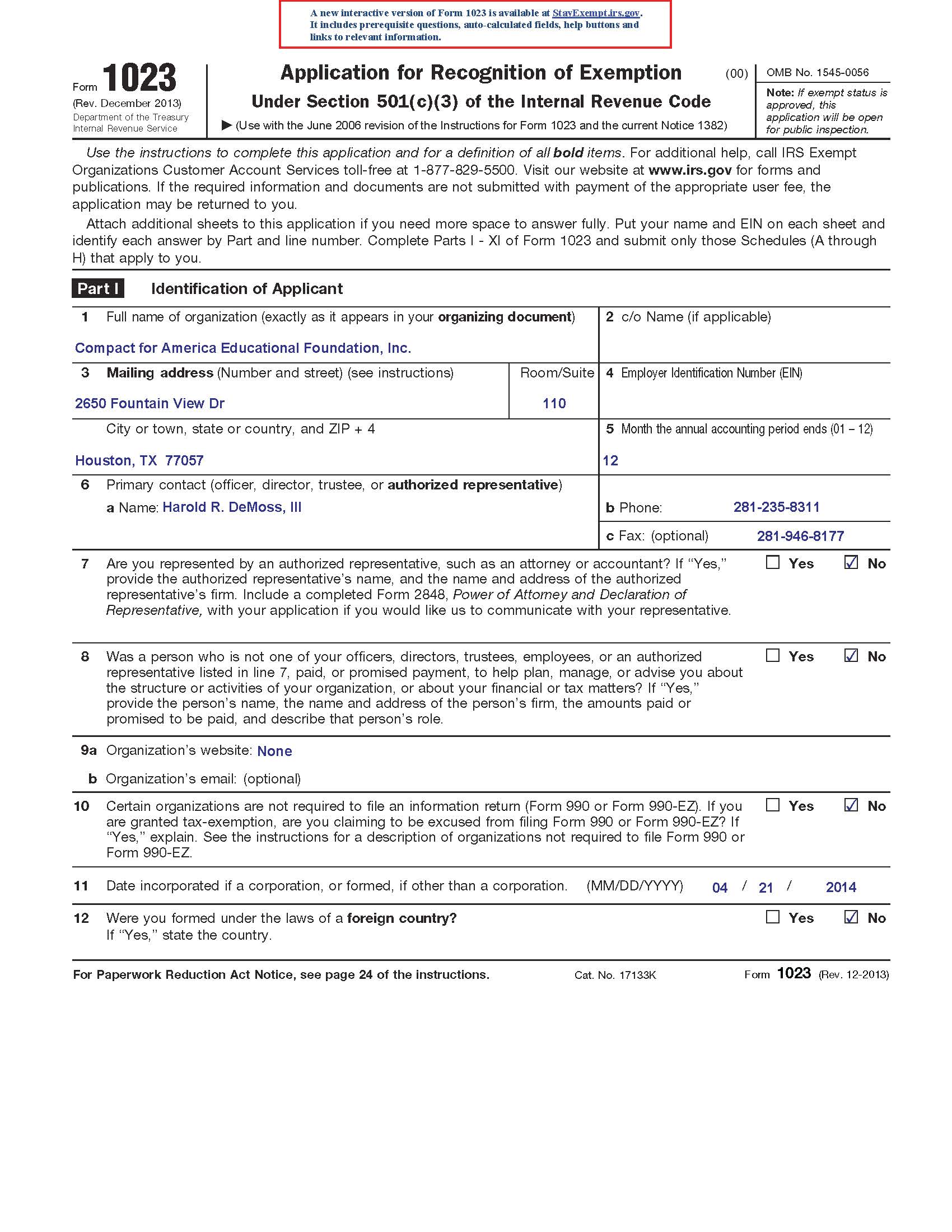 The statement also implies the Internal Revenue Service, in approving the 51 page
501(c)(3) application of Compact for America, (click image right to enlarge) "authorized" "the
Foundation...to undertake...efforts related to the Compact for a
Balanced Budget, the balanced budget amendment contained therein and
the required congressional activating resolution." The IRS letter granting 501(c)(3) status contains
no such statement of authorization nor reference to the compact, the
proposed amendment or a required congressional resolution which would
lead to the conclusion the IRS had "authorized" such activities. Based
on the research FOAVC has conducted regarding IRS
regulations, it appears if CFA or the Commission desired
"authorization" from
the IRS in these matters, they would have to formally apply to the
Internal Revenue Service using appropriate forms and procedures
specified in IRS regulations. There is no record proving CFA or the
Commission did this. Therefore any "authorization" by the IRS
appears to exist only in the mind of the Commission and Compact for
America.
The statement also implies the Internal Revenue Service, in approving the 51 page
501(c)(3) application of Compact for America, (click image right to enlarge) "authorized" "the
Foundation...to undertake...efforts related to the Compact for a
Balanced Budget, the balanced budget amendment contained therein and
the required congressional activating resolution." The IRS letter granting 501(c)(3) status contains
no such statement of authorization nor reference to the compact, the
proposed amendment or a required congressional resolution which would
lead to the conclusion the IRS had "authorized" such activities. Based
on the research FOAVC has conducted regarding IRS
regulations, it appears if CFA or the Commission desired
"authorization" from
the IRS in these matters, they would have to formally apply to the
Internal Revenue Service using appropriate forms and procedures
specified in IRS regulations. There is no record proving CFA or the
Commission did this. Therefore any "authorization" by the IRS
appears to exist only in the mind of the Commission and Compact for
America.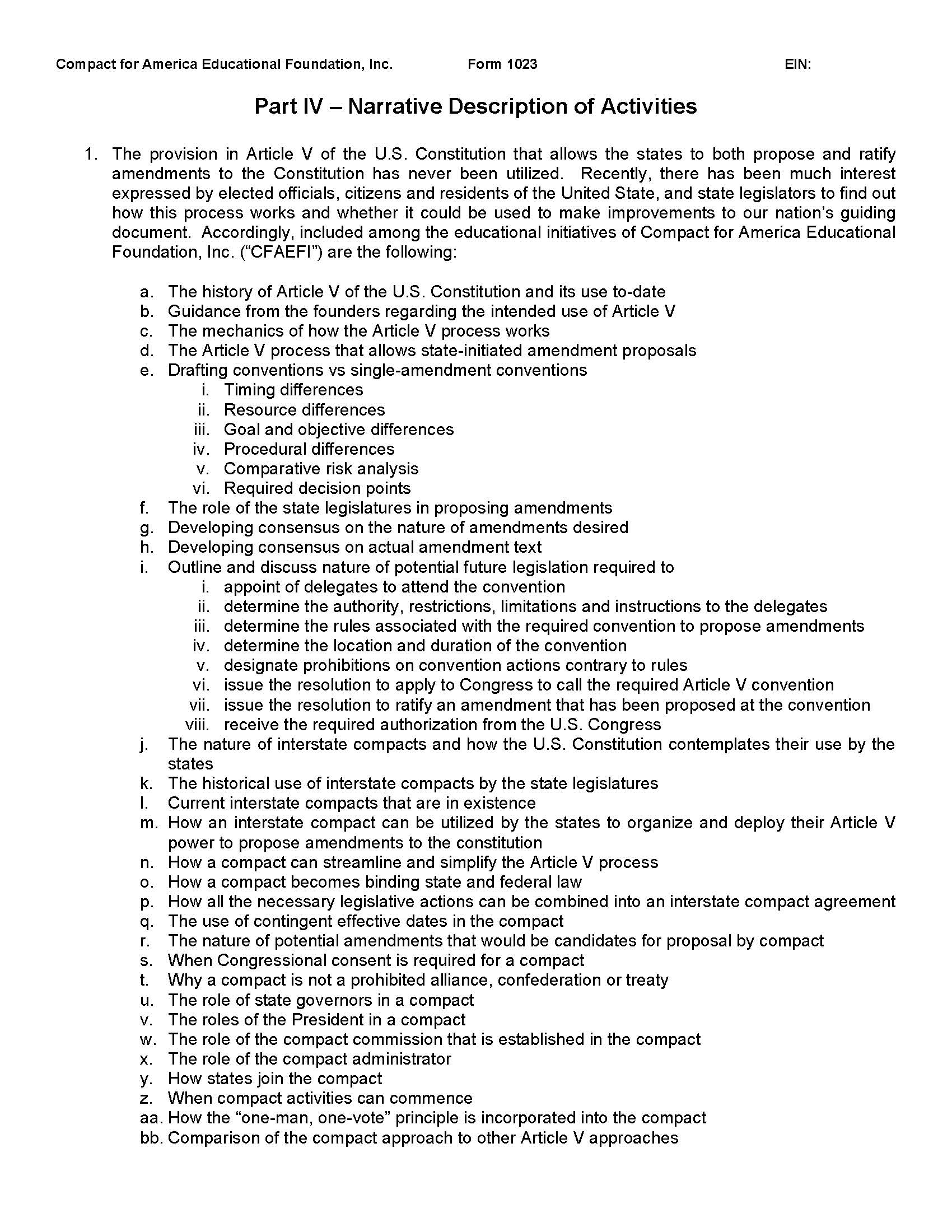 Whether the Commission's assertion the Compact for America Educational Foundation Inc., "specifically sought its 501(c)(3) exemption in light of its anticipated
purpose of assisting in broad education efforts related to the Compact
for a Balanced Budget, the balanced budget amendment contained
therein,
and the required congressional activating resolution as directed by the
Compact Commission," can be easily determined by examination the
required
narrative of activities in the Form 1023 application for 501(c)(3) tax
exempt status and comparing that narrative to the actual activities of
Compact for America since it was granted tax exempt status (click image left to enlarge).
If the narrative included all activities CFA has engaged in since being
granted tax exempt status as well as presenting all relevant facts
related those activities to the Internal Revenue Service for their
consideration, then clearly the Commission's statement is
correct. If this is not the case then clearly the Commission's
statement is incorrect.
Whether the Commission's assertion the Compact for America Educational Foundation Inc., "specifically sought its 501(c)(3) exemption in light of its anticipated
purpose of assisting in broad education efforts related to the Compact
for a Balanced Budget, the balanced budget amendment contained
therein,
and the required congressional activating resolution as directed by the
Compact Commission," can be easily determined by examination the
required
narrative of activities in the Form 1023 application for 501(c)(3) tax
exempt status and comparing that narrative to the actual activities of
Compact for America since it was granted tax exempt status (click image left to enlarge).
If the narrative included all activities CFA has engaged in since being
granted tax exempt status as well as presenting all relevant facts
related those activities to the Internal Revenue Service for their
consideration, then clearly the Commission's statement is
correct. If this is not the case then clearly the Commission's
statement is incorrect.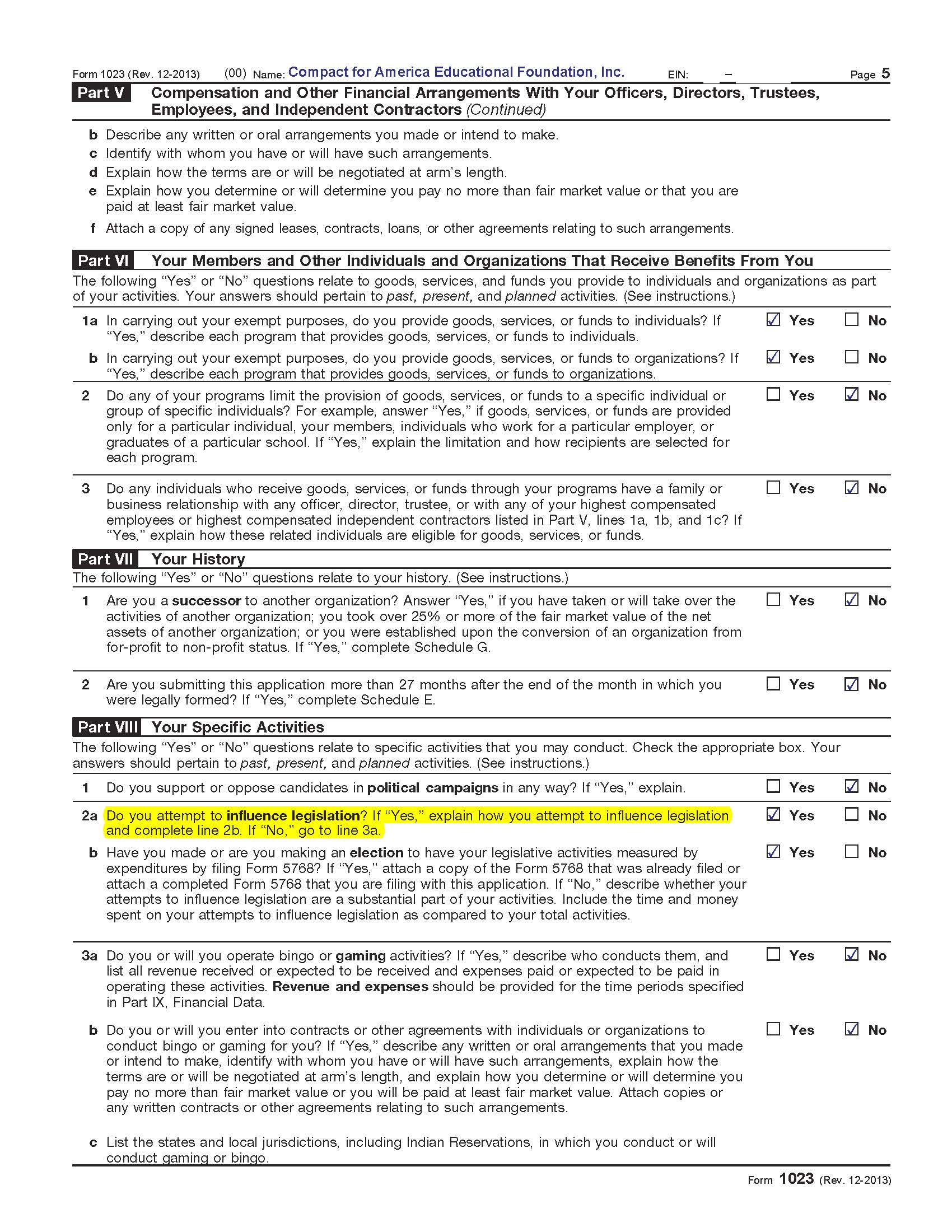 CFA admits in the 1023 form that it will attempt to
"influence legislation" then, as required, describes in its narrative
what those "educational" attempts will be (click image right to enlarge). The
statement of "assisting in broad education efforts" by the Commission
therefore is at least misleading. The record shows CFA admitted its
application it intended to "influence legislation." If Compact
for America was only interested in "assisting in broad educational
efforts" that is, presenting a truly nonpartisan point of view, then
CFA would have checked the appropriate box "no" instead of "yes" on the
IRS form.
CFA admits in the 1023 form that it will attempt to
"influence legislation" then, as required, describes in its narrative
what those "educational" attempts will be (click image right to enlarge). The
statement of "assisting in broad education efforts" by the Commission
therefore is at least misleading. The record shows CFA admitted its
application it intended to "influence legislation." If Compact
for America was only interested in "assisting in broad educational
efforts" that is, presenting a truly nonpartisan point of view, then
CFA would have checked the appropriate box "no" instead of "yes" on the
IRS form. While the required narrative of proposed activities presented to the Internal Revenue Service by Compact for America Educational Foundation Inc., in its 1023 application for tax exempt status fills some three typed pages, what CFA did not discuss in its narrative of proposed activities that it would undertake as a 501(c)(3) tax exempt organization and what it did not present regarding relevant facts related to these activities is most revealing. These omissions include:
- No mention of the relationship between Compact for America and the
Commission, a "governmental body."
- Compact for America gave the IRS no indication that a close financial and political relationship between itself and the Compact for a Balanced Budget Commission, described as a "governmental body" by CFA, could, or was likely to occur. Instead Compact for America stated in its application that it had no "affiliation" with any "governmental unit."
- Compact for America failed to update the information contained in its 1023 application to reflect events which occurred between CFA submitting its 1023 application on April 28, 2014 and the application being approved by the IRS on October 1, 2014. During that period, the first two states, Georgia and Alaska approved the Compact for a Balanced Budget. These acts set in motion specific actions relating to the establishment of the Compact for a Balanced Budget Commission contained in the compact which had the potential to significantly involve Compact for America. There is no record showing Compact for America made any effort whatsoever to notify the IRS of this change in status regarding "affiliation" with a governmental unit or of the potential effect enactment by two states of the compact might have on Compact for America and its 1023 application.
- Compact for America failed in its 1023 application to mention that CFA would establish total financial control over the Commission by entirely financing its operations and dictating entirely the terms and conditions of the expenditures of those monies. Compact for America further failed to mention in its 1023 application that such expenditures would be, under the direction of CFA, entirely directed entirely at lobbying efforts by the Commission at both the state and national level.
- Compact for America failed to notify the IRS
in its 1023 application of the possibility that officers of Compact for
America would serve in major administrative capacities in the
"governmental body" known as the Compact for a Balanced Budget
Commission by means of contractual agreements between Compact for
America and the Commission thus operationally and financially tying the
two organizations at the hip.
- Compact for America failed to mention in its
1023 application that it would assert "immunity" from IRS lobbying
regulations based on its relationship with a "commission" CFA defined
as a "governmental body" which would never bother to formally file for official
recognition as a tax exempt "governmental body" as required by IRS
regulations.
- Compact for America failed to mention in its 1023 application that the "governmental body" which CFA would finance and which its officers would serve in major administrative capacities might violate Texas state open public meetings and public information law.
- No mention of facts relevant to Compact for America and the Compact for a Balanced Budget
- Compact for America did not mention to the IRS in its 1023 application the fact Compact for America originated the concept of an amendatory compact by witting the proposed compact (dated February 1, 2013 and confirmed on its own website) which was subsequently approved by various states at the urging of Compact for America.
- Compact for America failed to mention in 1023 its application it was, and still remains, the only political organization supporting the creation of an amendatory compact untented to circumvent the parameters of Article V. Thus any proposal of an amendatory compact would, in all probability, originate from Compact for America meaning under no circumstances could CFA describe itself to the IRS in its application as "nonpartisan" or "educational" organization because its position from its creations would be politically partisan.
- CFA failed to mention in its 1023 application
that, as no other means exists for CFA to
achieve its stated objective--enactment of an
amendatory compact with state and federal laws designed to circumvent the terms
and conditions of
Article V--Compact for America would be
required to exclusively devote their time to passage of specific and required federal and state legislation
in order to cause enactment of the compact.
- This need for specific and required federal and state legislation was acknowledged in the
Commission's 2017 memo which referred to "required activating resolution for the Compact for a Balanced Budget." [Emphasis added].
The terms of the compact itself speak to the specific and required
state laws needed for compact enactment.
The IRS was not informed in the CFA 1023 application of this need for
this
specific legislative focus. The IRS was not informed by CFA that IRS
regulations prohibiting a tax exempt organization from supporting
"specific legislation" might be violated as both elements of regulation
determining communications by a tax exempt organization was not tax
exempt would be satisfied. According to IRS regulations the elements
necessary to
determine a tax exempt organization no longer enjoys tax exempt status
but is judged according to IRS lobbying laws are (1) reference to
specific legislation, and (2) reflecting a view on that legislation.
Obviously, as a specific piece of legislation related to passage of a
compact clearly satisfies the first standard, and CFA obvious
support for the legislation (having actual written it) clearly satisfies the second standard.
- Compact
for America failed to mention in its 1023 application that its
"educational"
material would be written in a manner that would raise questions as
whether the "educational" material qualified as "nonpartisan" under
IRS
regulations.
- Compact for America failed to notify the IRS of
a potential issue involving IRS regulations forbidding tax exempt status for any organization involved in any illegal purpose.
- Compact for America failed to notify the IRS of provisions of the Compact for a Balanced Budget written by CFA calling removal of delegates from the CFA convention for failure to obey provisions of the Compact. These provisions appear to conflict with already established federal criminal law. These federal laws prohibit threat of force against convention delegates, require delegates be directly elected rather than appointed, and prohibit deprivation of established civil rights.
- Compact for America failed to mention to the IRS in its 1023 application that requirements in the compact regarding delegate selection may criminally conflict with state laws or constitutions.
- According to the compact written by CFA at the time of submission of the 1023 application, the chief executive of each state (governor) is to be "appointed in an individual capacity to represent his or respective State at the Convention as its sole and exclusive delegate." The compact requires the governor "take a temporary leave of absence from any other public office held by the delegate while attending the Convention." The compact specifies while a delegate at the convention the governor "may not exercise any power or authority associated with any other public office held by the delegate while attending the Convention." Such provisions may conflict with criminal provisions of state laws and constitutional provisions prohibiting a state governor from doing anything but permanently resigning from office rather than taking a "temporary leave of absence" if he is unavailable to perform his constitutional state duties. Further, these compact provisions may be viewed in some states as a form of coercion against a state official, causing him to resign from office when he would otherwise prefer not to. The same law may also apply to the provision prohibiting a state governor from exercising his lawful and constitutional authority even while serving as a delegate.
- Compact for America failed to mention in is 1023 application that despite the generalized discussion of several amendment proposals presented to the IRS as "educational" subjects, in actual practice Compact for America would focus only on a specific amendment proposal and thus a specific legislative proposal--a balanced budget amendment.
The evidence indicates the statement by the Commission that Compact for America "specifically sought its 501(c)(3) exemption in light of its anticipated purpose of assisting in broad education efforts related to the Compact for a Balanced Budget, the balanced budget amendment contained therein, and the required congressional activating resolution as directed by the Compact Commission," was based either on misinformation it received or information it most likely chose to ignore given the fact the 1023 form is a public document available to anyone including members of the Commission.
Forms 8871, 8872, 1120-POL
Based on the best information available it appears Compact for America has not filed IRS tax forms required by IRS regulations. Generally referred to as IRC 527 regulations, these tax forms may include forms 8871 (filed electronically), 8872 and 1120-POL depending on the circumstance for each organization that is required to file. IRC 527 deals with reporting monies of political organization that are not "exempt functions" and thus subject to tax. Under certain circumstances 501(c)(3) tax exempt organizations such as Compact for America Educational Foundation, Inc are required to file IRC 527 forms. Additionally, the Commission, which is not designated as a tax exempt "governmental body" by the IRS, appears subject to IRC 527 regulation and thus is also required to file one or more of these tax forms. According to IRS regulations forms 8871 and 8872 are subject to public inspection.
Under most circumstances 501(c)(3) and 501(c)(4) organizations are not required to file IRS Form 8871, 8872 and 1120-POL. The popular interpretation of these regulations lead most people to believe the regulations only deal with the "election" of political candidates to national offices such as the president. Such sentiment is expressed by CFA in its by-laws which forbid participation in the election of any candidate. As IRS regulations specifically forbid 501(c)(3) and (c)(4) organizations from actively supporting the election of a specific candidate, it is usually assumed these organizations are not required to file IRC 527 forms because they ordinarily do not engage in such activities.
However examination of the exact wordage of the law shows in the specific case of Compact for America and the Commission there is reason to believe these organizations are required to file IRC 527 tax forms even if the forms show no tax is owed by CFA or the Commission. Title 26 of the United States Code makes it clear: even if no tax is owed, anyone subject to the tax in question must fill out and submit the appropriate tax form or forms to the Internal Revenue Service. A notable feature of IRC 527 regulations is that organizations subject IRC 527 regulations are required to name their contributors, addresses and the amounts contributed when ordinarily a 501(c)(3) or 501(c)(4) organization can decline to name them.
IRC 527 regulations appear to apply to Compact for America and the Commission because the actual language of the regulations are much broader in scope than many people realize. The regulations extend not only to national elections but to all public offices at all levels of government federal, state and local. In addition IRC 527 regulations include not only election to public office but appointment to public offices as well. Thus, efforts to influence or attempt to influence the appointment of an individual to a public office falls under the definition of "exempt function" of the regulations.
An IRS publication states, "IRC 527(e)(2) defines "exempt function" as "the function of influencing or attempting to influence the selection, nomination, election, or appointment of any individual to any Federal, State, or local public office..." [Emphasis added]. The regulations further specify that, "Income from contributions, membership dues, political fundraising events, and from the sale of campaign material must be set aside or spent for "exempt function" purposes or it is taxable to the political organizations. Finally, organizations exempt under IRC 501(c) may be subject to tax on amounts spent directly on an "exempt function." Neither Compact for America or the Commission have financial records showing any funds they have received or expended have been "set aside" under IRC 527 regulations. Thus all funds received or expended by both organizations are subject to possible tax.
While it is true Compact for America and the Commission have not been involved in the election of any individual to any state or federal public office, the record is irrefutable when it comes to appointment to office. Both Compact for America Educational Foundation Inc., and the Compact for a Balanced Budget Commission have been engaged in influencing or attempting to influence the appointment of individuals to public office, namely the Compact for a Balanced Budget Commission itself as well as the appointment of chief executives of each state to the office of "exclusive delegate." The question of whether the appointments deal with federal or state office is irrelevant as the regulations cover both levels of office. Several facts support that both the Commission and CFA are subject to IRC 527 regulation:
- Compact for America wrote and developed the Compact for a Balanced Budget calling for appointment of the chief executives of each state to be the "exclusive delegate" to a CFA convention and for the passage of laws so designating the same.
- Compact for America was responsible for the creation of the Compact for a Balanced Budget Commission as part of the Compact for a Balanced Budget which calls for the appointment of commissioners to a Balanced Budget Commission and for the passage of laws so designating the same.
- Compact
for America has declared in its own email
communications that it is "exempt" from certain federal regulations
because of its status as "public officials." As there is no record of
these "public officials" being elected, it follows they have been
"appointed" and therefore subject to appropriate federal tax law
described in IRC 527.
- The Commission has issued a formal written statement appointing
all members of Compact for America including its officers, employees
and volunteers as "public officials" and therefore subject to
appropriate federal law described in IRC 527.
- At least one officer of Compact for America has been appointed to
the office of Compact Administrator by the Commission, a public
office created by terms of the Compact for a Balanced Budget and
therefore subject to appropriate federal law described in IRC 527.
While Compact for America may argue the compact provisions of governors being required to take "a leave of absence", attend as individuals and exercise no powers of office while serving as delegates at the convention, the definition of "exempt function" under IRS regulations appear to defeat this as CFA is still involved in the process of appointment by creating the process of appointment in the first place. Further such standards as the Compact for a Balanced Budget describes still fall under the portion of regulations dealing with "attempting to influence" as they establish the conditions under which the appointment takes place.
The IRS requires that any Form 8871 (including any supporting papers), Form 8872 (including Schedules A and B) be open to public inspection and must be made "available for public inspection...during regular business hours at the organization's principal office." Thus the papers must be available at either the Texas UPS mailing box used by Compact for America or the Texas private residence which serves as the physical headquarters for Compact for America. There is no evidence suggesting these tax forms are or have been available for public inspection during regular business hours of either Compact for America of the Commission. The IRS imposes a $20 a day penalty on any person "under a duty to comply with the public inspection requirement for each day a failure to comply continues."
As FOAVC has stated repeatedly in regards to other IRS regulations involving Compact for America or the Commission, actual determination of whether IRC 527 applies to Compact for America is dependent upon a determination by the Internal Revenue Service based on a complaint being filed with that agency.
Overall Conclusion
FOAVC has extensively examined the records of Compact for America Educational Foundation, Inc., Compact for America(Action) and Compact for a Balanced Budget Commission believes evidence in those records when compared to appropriate law or regulations raise questions of compliance with federal and state laws. As stated in the beginning of this report, actual determination of any violation of any law is the responsibility of state and federal agencies charged with the enforcement of these laws. Until complaints are lodged with these agencies bringing these matters to the attention of these authorities and the authorities have subsequently conducted investigations as prescribed by law and determined violation of law as prescribed by law, it cannot be stated any of these organizations has violated any law.
Therefore at this time FOAVC cannot state Compact for America Educational Foundation, Inc., Compact for America(Action) or Compact for a Balanced Budget Commission have violated any state or federal law but does believe the evidence presented warrants further formal investigation on the part of governmental authorities charged with such investigations.
